
Global Head of Research and Strategy
Almost three years after interest rates began to spike leading into the Great Tightening Cycle, the first light of a new real estate cycle is clearly visible on the horizon. As with the start of every new day, however, opportunities and challenges lie ahead. LaSalle’s Research and Strategy team will examine both throughout the course of November and December, as we publish four separate chapters, one covering our global outlook, and three deep-dives covering the outlook for Europe, North America and Asia Pacific. Each chapter can be found alongside an accompanying video conversations with lead authors on the links below.
In the Global chapter of ISA Outlook 2025, we look at how to make the most of this new dawn and the opportunities it may present, but with a watchful eye on ways the new day could go off track. We examine these through four broad themes in this year’s report: the morning sky, the capital stack hangover, the breakfast menu, and the early bird.
We examine each of these concepts in turn, and ask what each means for real estate and they intersect with one another and other key trends.

Global Head of Research and Strategy

Managing Director, Global Research and Strategy
While dawn is universal, across Europe it can appear different from each location and every angle. European real estate is transiting inflection points following a deep capital market correction. The INREV ODCE index shifted in the latest quarter from declines to positive after seven down quarters.
Against this backdrop, we share our Impressions of a Rising Cycle in Europe, with a focus on what makes the region different from others across the globe. We also share our five key strategy themes for investors in European real estate for the year ahead.



Europe Head of Research and Strategy



Europe Head of Core and Core-plus Research and Strategy



Europe Head of Debt and Value-add Capital Research and Strategy
The summer and autumn of 2024 saw growing optimism among real estate investors. The belief that the dawn of 2025 would open with sunny skies for the real estate market was driven by falls in interest rates from peak levels, fading economic growth concerns and real estate valuations now more aligned with market transactions.
But with more uncertainty creeping into the picture in late 2024, especially around longer-term interest rates, what we see could be described as a “partly cloudy sunrise.”



Americas Head of Research and Strategy



Canada Head of Research and Strategy
The current real estate cycle in Asia Pacific is not a simple repetition of a typical cycle. While Asia Pacific economies have not been immune to supply chain disruptions and elevated inflation, interest rates and construction costs, real estate capital market liquidity in the region (with the exception of China and Hong Kong) has fared much better than in other parts of the world.
In our view, the varying and sometimes contrasting cyclical patterns among major real estate sectors within each country set the region apart from global trends.



Asia Pacific Head of Research and Strategy


Vice President, Strategist



China Head of Research and Strategy
Published every year since 1993, LaSalle’s annual ISA Outlook is designed to help our clients and partners navigate the year ahead. It brings together smart perspectives and investment ideas from our teams around the world, based on what we see across our more than 1,200 assets that span geographies, property types and risk profiles.
As always, we welcome your feedback. If you have any questions, comments or would like to learn more,
please get in touch by using our Contact Us page.


Last year, we released the inaugural edition of LaSalle’s ISA Portfolio View, where we discussed the art and science of portfolio construction and why it matters most when market conditions change suddenly. That was certainly true at the time of last year’s release and remains so today.
In this year’s edition, we cover the five foundational concepts of portfolio management below, and how they should be considered alongside an investor’s objectives and values to devise a strategy for their portfolio.















For 2024, we have also updated ISA Portfolio View to include the most recent available data, and added new sections on:
The speed and unpredictability of market changes over the last few years highlights the importance of not only planning ahead by thinking carefully about how to create real estate portfolios that can be expected to be resilient, but also working with an asset-class expert who understands the nuances presented by real estate.
Important Notice and Disclaimer
This publication does not constitute an offer to sell, or the solicitation of an offer to buy, any securities or any interests in any investment products advised by, or the advisory services of, LaSalle Investment Management (together with its global investment advisory affiliates, “LaSalle”). This publication has been prepared without regard to the specific investment objectives, financial situation or particular needs of recipients and under no circumstances is this publication on its own intended to be, or serve as, investment advice. The discussions set forth in this publication are intended for informational purposes only, do not constitute investment advice and are subject to correction, completion and amendment without notice. Further, nothing herein constitutes legal or tax advice. Prior to making any investment, an investor should consult with its own investment, accounting, legal and tax advisers to independently evaluate the risks, consequences and suitability of that investment.
LaSalle has taken reasonable care to ensure that the information contained in this publication is accurate and has been obtained from reliable sources. Any opinions, forecasts, projections or other statements that are made in this publication are forward-looking statements. Although LaSalle believes that the expectations reflected in such forward-looking statements are reasonable, they do involve a number of assumptions, risks and uncertainties. Accordingly, LaSalle does not make any express or implied representation or warranty, and no responsibility is accepted with respect to the adequacy, accuracy, completeness or reasonableness of the facts, opinions, estimates, forecasts, or other information set out in this publication or any further information, written or oral notice, or other document at any time supplied in connection with this publication. LaSalle does not undertake and is under no obligation to update or keep current the information or content contained in this publication for future events. LaSalle does not accept any liability in negligence or otherwise for any loss or damage suffered by any party resulting from reliance on this publication and nothing contained herein shall be relied upon as a promise or guarantee regarding any future events or performance.
By accepting receipt of this publication, the recipient agrees not to distribute, offer or sell this publication or copies of it and agrees not to make use of the publication other than for its own general information purposes.
Copyright © LaSalle Investment Management 2024. All rights reserved. No part of this document may be reproduced by any means, whether graphically, electronically, mechanically or otherwise howsoever, including without limitation photocopying and recording on magnetic tape, or included in any information store and/or retrieval system without prior written permission of LaSalle Investment Management.
CHICAGO (September 17, 2024) – Elena Alschuler, LaSalle’s Americas Head of Sustainability has been recognized with the Nareit 2024 Sustainable Leadership Award on behalf of JLL Income Property Trust.
Nareit presented the inaugural Sustainability Impact Awards at its REITworks: 2024 Sustainability & Social Responsibility Conference in McLean, VA. The awards recognize REITs for implementing sustainable practices that demonstrate leadership, ingenuity, and environmental impact in the commercial real estate industry.
Elena was recognized for her leadership in sustainability in the built environment, and her collaboration with industry peers to share knowledge and develop best practices. This is exemplified in Elena’s recent role as chair for the CRREM North America Working Group which is working to develop decarbonization pathways to benchmark transition risk.


Nareit Senior Vice President of Environmental Stewardship & Sustainability, Jessica Long said: “We are excited to highlight Elena and JLL Income Property Trust who are raising the bar for advancing sustainability practices in their operations, buildings, communities, and across the broader REIT and commercial real estate industry.”
LaSalle Global Head of Climate and Carbon, Julie Manning said: “This award is a well-deserved recognition of Elena’s exceptional contributions to sustainable real estate practices. Her innovative strategies and tireless efforts have not only elevated LaSalle’s program but are also working to set new benchmarks for the entire industry. Elena’s work exemplifies our commitment to exploring sustainable solutions that can drive investment performance.”
JLL Income Property Trust, President and CEO, Allan Swaringen said: “At JLL Income Property Trust, we believe sustainability initiatives can drive value and mitigate risk. We integrate these sustainability principles in our portfolio construction, acquisitions and asset management activities, resulting in a tailored approach to each property in our portfolio. Elena has been at the forefront of driving these efforts, and this recognition by Nareit is a testament to her commitment.”
ENDS
About LaSalle Investment Management | Investing Today. For Tomorrow.
LaSalle Investment Management is one of the world’s leading real estate investment managers. On a global basis, LaSalle manages US$84.8 billion of assets in private and public real estate equity and debt investments as of Q2 2024. LaSalle’s diverse client base includes public and private pension funds, insurance companies, governments, corporations, endowments and private individuals from across the globe. LaSalle sponsors a complete range of investment vehicles, including separate accounts, open- and closed-end funds, public securities and entity-level investments.
For more information, please visit www.lasalle.com, and LinkedIn.
About JLL Income Property Trust, Inc. (NASDAQ: ZIPTAX; ZIPTMX; ZIPIAX; ZIPIMX)
JLL Income Property Trust, Inc. (NASDAQ: ZIPTAX; ZIPTMX; ZIPIAX; ZIPIMX), is a daily NAV REIT that owns and manages a diversified portfolio of high quality, income-producing apartment, industrial, grocery-anchored retail, healthcare and office properties located in the United States. JLL Income Property Trust expects to further diversify its real estate portfolio over time, including on a global basis.
About Nareit
Nareit serves as the worldwide representative voice for REITs and publicly traded real estate companies with an interest in U.S. real estate. Nareit’s members are REITs and other real estate companies throughout the world that own, operate, and finance income-producing real estate, as well as those firms and individuals who advise, study, and service those businesses. Nareit’s focus is to broaden and deepen REIT ownership to help a growing set of everyday American investors enjoy the benefits of holding real estate in a well-diversified portfolio, while increasing capital sources that invest in America’s future. Nareit is the exclusive registered trademark of the National Association of Real Estate Investment Trusts, Inc.®, 1875 I St., NW, Suite 500, Washington, DC 20006-5413. Follow us on REIT.com. Copyright© 2024 by Nareit®. All rights reserved.
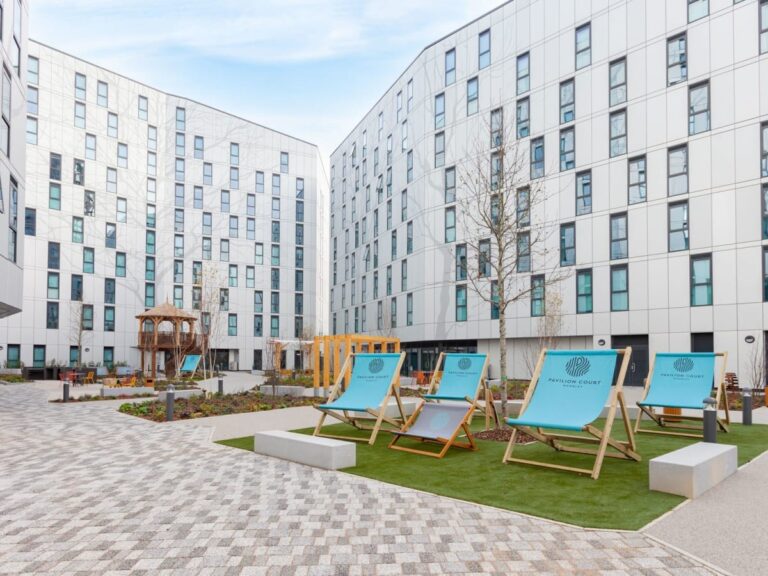






















































































London (March 11, 2024) – LaSalle Investment Management (“LaSalle”), the global real estate investment manager, has appointed Bouygues Rénovation Privée (“Bouygues”) as the main contractor for the redevelopment of Bergère, a landmark office-led, highly-amenitized workspace project in Paris.
Situated in the 9th Arrondissement, Bergère is in a prime location in the heart of Paris, surrounded by a thriving cluster of companies from across technology, fashion, and financial and professional services. It forms part of a vibrant urban environment with a high concentration of restaurants, bars, shops, department stores, and cultural and leisure facilities. Positioned just 150 metres from the Grands Boulevards metro station, Bergère also benefits from convenient transport links and access to three of Paris’s largest transportation hubs: Gare du Nord, Saint Lazare and Chatelet – Les Halles. The renovated building will have a floor area of approximately 26,850 square meters and was redesigned by the leading French architectural firm PCA-Stream.


Scheduled for completion in Q1 2026, the redevelopment of Bergère will incorporate industry-leading sustainability practices. This will involve a sensitive restoration of the building’s architectural heritage while upgrading the technical equipment to meet operational Net Zero Carbon goals. The project will prioritise the reuse of materials to minimise the projected embodied carbon associated, and the building is targeting a BREEAM Excellent certification, with a 50% reduction in operational CO2e and a 20% reduction in embodied CO2e compared with the benchmark for Parisian office renovations.
The redevelopment will also look to meet future tenant requirements and evolving work trends with high-quality amenities to promote in-person interaction and facilitate a hybrid working, including an auditorium, business centre, bars and restaurants, event spaces and a media broadcast studio.
Marc Fauchille, Head of Development and Repurposing, Europe, LaSalle Investment Management, commented: “We are excited to work together with the experience and expertise at Bouygues Bâtiment Ile-de-France on Bergère, to create an innovative and truly revolutionary workspace in the heart of Paris. Bergère is set to be a prime office-led development in Paris, situated in a highly sought-after location in one of the strongest European markets. The project is already attracting a high level of tenant interest given its quality, location and sustainability credentials.”
Thomas Rousseau, Managing Director of Bouygues Bâtiment Ile-de-France Rénovation Privée, adds: “We are very proud to have been selected by LaSalle Investment Management for this Parisian prime office restructuring operation, which is also listed as a Historic Monument. The teams were particularly driven by the ambition of the project, the technical complexity as well as the challenges in terms of uses and the environment. This success is the result of collective work. Our teams are already mobilized to highlight their expertise and know-how in heritage restoration, our core business. This building is a real showcase for our company in terms of decarbonization, exemplarity and innovation. A big thank you to LaSalle Investment Management and its partners for trusting us with the realization of this exceptional project.
LaSalle acquired Bergère, on behalf of Encore+, its flagship open-ended pan-European fund, in May 2020 from BNP Paribas in a sale-and-leaseback transaction.
Ends
About LaSalle Investment Management | Investing Today. For Tomorrow.
LaSalle Investment Management is one of the world’s leading real estate investment managers. On a global basis, LaSalle manages approximately US $90 billion of assets in private and public real estate equity and debt investments as of Q4 2024. LaSalle’s diverse client base includes public and private pension funds, insurance companies, governments, corporations, endowments and private individuals from across the globe. LaSalle sponsors a complete range of investment vehicles, including separate accounts, open- and closed-end funds, public securities and entity-level investments. For more information, please visit www.lasalle.com, and LinkedIn.
Marketing Disclaimer: This information is based on the market analysis and expectations of LaSalle and should not be relied upon by the reader as research or investment advice regarding LaSalle funds or any issuer or security in particular. The information presented herein is for information purposes only and is not a recommendation, offer or solicitation to buy or sell any securities or to adopt any investment strategy in any jurisdiction where prohibited by law or where contrary to local law or regulation. Any such offer to invest, if made, will only be made to certain qualified investors by means of a private placement memorandum or applicable offering document and in accordance with applicable laws and regulations. Past performance is not indicative of future results, nor should any statements herein be construed as a prediction or guarantee of future results. Please refer to the offering documents Encore+ for detailed information on the risks, reward and performance information of the Fund.























































































CHICAGO (January 11, 2024) – LaSalle Investment Management (LaSalle) has closed on the acquisition of Canal Crossing Logistics Center, a core industrial warehouse located in Phoenix, AZ. The acquisition was made on behalf of the firm’s U.S. core open-ended fund LaSalle Property Fund (LPF).
The property is 100% leased to a leading provider of alternative aftermarket, specialty salvage and recycled auto parts to repair and accessorize vehicles. The tenant is a wholly owned subsidiary of LKQ Corporation (Nasdaq: LKQ), which has operations in North America, Europe and Taiwan. The property is centrally located in the Sky Harbor Airport submarket, offering immediate access to major transportation corridors and connectivity to the Phoenix metropolitan area. Built in 2015, the property features a highly functional site plan with Class A building specifications.
Jim Garvey, President and Portfolio Manager, LaSalle Property Fund said: “This acquisition is a great fit for our portfolio and reflects our strategy to increase the Fund’s industrial allocation through investment in infill submarkets within high-growth metropolitan markets.”
Matt Bogovich, Vice President of Transactions added: “We are pleased to have acquired such a high-quality industrial asset in a strategic infill submarket of Phoenix. The Airport Submarket is the most established industrial cluster in the MSA, and this asset stands out given its newer construction and modern features.”
About LaSalle Property Fund
LaSalle Property Fund invests in and manages a portfolio of diversified high-quality core real estate assets in major markets across the US in the industrial, multifamily, office, retail and niche sectors. Since its inception in 2010, LaSalle Property Fund has focused on creating and managing a portfolio with an emphasis on property types with strong growth potential and lesser risk of disruption from secular changes. The Fund’s assets are diversified across major and niche property sectors in major American markets, aiming to provide reliable returns.
About LaSalle Investment Management | Investing Today. For Tomorrow.
LaSalle Investment Management is one of the world’s leading real estate investment managers. On a global basis, LaSalle manages over $89 billion of assets in private and public real estate equity and debt investments as of Q3 2023. LaSalle’s diverse client base includes public and private pension funds, insurance companies, governments, corporations, endowments and private individuals from across the globe. LaSalle sponsors a complete range of investment vehicles including separate accounts, open- and closed-end funds, public securities and entity-level investments. For more information please visit http://www.lasalle.com, and LinkedIn.
NOTE: This information discussed above is based on the market analysis and expectations of LaSalle and should not be relied upon by the reader as research or investment advice regarding LaSalle funds or any issuer or security in particular. The information presented herein is for illustrative and educational purposes and is not a recommendation, offer or solicitation to buy or sell any securities or to adopt any investment strategy in any jurisdiction where prohibited by law or where contrary to local law or regulation. Any such offer to invest, if made, will only be made to certain qualified investors by means of a private placement memorandum or applicable offering document and in accordance with applicable laws and regulations. Past performance is not indicative of future results, nor should any statements herein be construed as a prediction or guarantee of future results.























































































MONTREAL (December 20, 2023) – Ivanhoé Cambridge (“IC”) announced today that it has syndicated a 49% stake of Vaughan Mills shopping center to LaSalle Investment Management (“LaSalle”), as part of a syndication process. The 49% share represents one of the largest retail transactions Ivanhoé Cambridge has made over the past few years.
Per the syndication terms, Ivanhoé Cambridge and LaSalle will serve as co-owners, as IC will continue to act as asset manager in executing the property business plan.
“We are thrilled to share the news of this enhanced partnership with LaSalle, a sophisticated player who will contribute to the continued success of this property,” said Annie Houle, Head of Canada at Ivanhoé Cambridge. “Vaughan Mills is a prominent shopping center that has stood out over the past twenty years, highlighting the strength of retail.”
“We are pleased to continue to build a successful relationship with Ivanhoé Cambridge, a valued best-in-class global partner and real estate leader,” said Stephen Robertson, Head of Canada Transactions at LaSalle.
Stuart Sziklas, Senior Managing Director and Portfolio Manager at LaSalle, added, “Winning retail centers have remained quite resilient through cycles, and Vaughan Mills’ leasing and occupancy track record highlights its premier location and status in the market.”
Located in Vaughan, Ontario, Vaughan Mills is visited by over 13 million people annually. The shopping center stands out thanks to its unique positioning, a distinctive 1.7 km, 1 level “race track-style” configuration, and its retail offering of both regular and outlet brands, with a strong focus on entertainment and leisure.
Vaughan Mills is 97% leased, with a significant mix of international and national brands. The shopping center underwent an expansion in 2015 and is certified BOMA Best Platinum, the highest level for this program supporting smart and sustainable building operations worldwide.
CBRE Limited acted as real estate advisors and RBC Capital Markets Realty Inc. acted as financial advisors to Ivanhoé Cambridge.
About Ivanhoé Cambridge
Ivanhoé Cambridge develops and invests in high-quality real estate properties, projects and companies that are shaping the urban fabric in dynamic cities around the world. It does so responsibly, with a view to generate long-term performance. Ivanhoé Cambridge is committed to creating living spaces that foster the well-being of people and communities, while reducing its environmental footprint.
Ivanhoé Cambridge invests internationally alongside strategic partners and major real estate funds that are leaders in their markets. Through subsidiaries and partnerships, the company holds interests in 1,500 buildings, primarily in the industrial and logistics, office, residential and retail sectors. Ivanhoé Cambridge held C$77 billion in real estate assets as of December 31, 2022, and is a real estate subsidiary of CDPQ (cdpq.com), a global investment group. For more information: ivanhoecambridge.com.
About LaSalle Investment Management | Investing Today. For Tomorrow.
LaSalle Investment Management is one of the world’s leading real estate investment managers. On a global basis, LaSalle manages over $89 billion of assets in private and public real estate property and debt investments as of Q3 2023. LaSalle’s diverse client base includes public and private pension funds, insurance companies, governments, corporations, endowments and private individuals from across the globe. LaSalle sponsors a complete range of investment vehicles including separate accounts, open- and closed-end funds, public securities and entity-level investments. For more information please visit http://www.lasalle.com, and LinkedIn.























































































CHICAGO (December 11, 2023) – LaSalle Investment Management (LaSalle) is pleased to announce it has been named a Best Place to Work in Money Management for 2023 by Pensions & Investments (P&I). This marks the eighth consecutive year LaSalle has received this prestigious recognition.
Presented by Pensions & Investments, the 12th annual survey and recognition program is dedicated to identifying and recognizing the best employers in the money management industry.
Kristy Heuberger, LaSalle Americas Co-Head, said: “Being honored as a ‘Best Place to Work’ for an eighth year is a testament to the foundational elements of LaSalle’s success: our people and our culture. We’re proud that the culture every employee at LaSalle works hard to foster continues to be recognized.”
Brad Gries, LaSalle Americas Co-Head, added: “Our culture is reflected in everything we do at LaSalle, whether it’s providing exceptional client service,driving investment performance, developing talent, growing careers, or simply making LaSalle a place that people enjoy coming to work. We thank our employees for continuing to make our firm a Best Place to Work in Money Management.”
P&I Chief Operating Officer Nikki Pirrello said: “A strong workplace culture that supports talent, advocates progress and drives innovation is paramount to driving the best outcomes and these asset managers demonstrate that. Congratulations to the 2023 honorees for their commitment to employee well-being, attractive incentive structures and talent development that demonstrate how investing in your employees can elevate our industry to greater heights.”
P&I Executive Editor Julie Tatge said: “As their employees attest, the companies named to this year’s Best Places to Work list demonstrate a commitment to building and maintaining a strong workplace culture. Even as firms grappled with volatile markets and ongoing stresses from the pandemic, their employees said they felt strong support from their managers, enabling them to do their best work.’’
Pensions & Investments partnered with Best Companies Group, a research firm specializing in identifying great places to work, to conduct a two-part survey process of employers and their employees. The first part consisted of evaluating each nominated company’s workplace policies, practices, philosophy, systems and demographics. This part of the process was worth approximately 25% of the total evaluation. The second part consisted of an employee survey to measure the employee experience. This part of the process was worth approximately 75% of the total evaluation. The combined scores determined the top companies. For a complete list of the 2023 Pensions & Investments Best Places to Work in Money Management winners and write-ups, go to www.pionline.com/BPTW2023.
About LaSalle Investment Management | Investing Today. For Tomorrow.
LaSalle Investment Management is one of the world’s leading real estate investment managers. On a global basis, LaSalle manages over $89 billion of assets in private and public real estate property and debt investments as of Q3 2023. LaSalle’s diverse client base includes public and private pension funds, insurance companies, governments, corporations, endowments and private individuals from across the globe. LaSalle sponsors a complete range of investment vehicles including separate accounts, open- and closed-end funds, public securities and entity-level investments. For more information please visit http://www.lasalle.com, and LinkedIn.























































































London (December 11, 2023) – LaSalle Investment Management (“LaSalle”), the global real estate investment manager, has secured planning permission to redevelop and refurbish Bergère – a landmark office-led, highly-amenitized workspace project in Paris.
The building is renowned for its striking façade and exceptional architectural features, such as the main atrium and the monumental staircase. Redesigned by the leading French architectural firm PCA-Stream, the redevelopment is expected to complete by Q1 2026 and will have a lettable floor area of approximately 26,500 square meters.


Located in the 9th Arrondissement, in the heart of Paris, the building is in a prime location surrounded by a thriving cluster of companies from across technology, fashion, and financial and professional services. It forms part of a vibrant urban environment with a high concentration of restaurants, bars, shops, department stores, and cultural and leisure facilities. The demand-supply imbalance for office space in the area remains acute, with Paris CBD vacancy at 1.9% compared to a European average of 7.4% as of Q3 2023, according to JLL. The area also boasts excellent transport links, just 150 metres from the Grands Boulevards metro station, providing immediate access to three of Paris’s largest transportation hubs: Gare du Nord, Saint Lazare and Chatelet – Les Halles.
The new development will meet future tenant requirements and evolving work trends, offering state-of-the-art environmental performance ratings with high-quality amenities. These include amenities to promote in-person interaction and hybrid working, including an auditorium, business center, bars and restaurants, event spaces and a media broadcast studio. It will house 442 bicycle parking spaces, with direct access from the street, as well as changing rooms, fitness facilities and 75 EV charging stations. It will also comprise street-facing food and beverage, and a retail unit designated for affordable rent for social impact-related businesses to support the local community. It will also increase the site’s green outdoor space by 50% to more than 2,000 sqm, including a garden, two court yards and two rooftop terraces.
The project will be redeveloped with industry-leading sustainability processes and credentials in mind. This comprehensive development will involve a sensitive restoration of the building’s architectural heritage while upgrading the technical equipment to meet operational Net Zero Carbon goals. It will also prioritise the reuse of materials to reduce the projected embodied carbon associated with the project.
The building aims for a BREEAM Excellent and HQE Excellent certification with a 50% reduction in operational CO2e, and a BBCA (Bâtiment Bas Carbone) targeting a 20% reduction in embodied CO2e compared to existing Parisian office refurbishment benchmarks. It will also target the BiodiverCity label for its increase in green space and biodiversity onsite, and the project has been designed to meet the Décret Tertiaire 2050 requirements.
LaSalle has appointed JLL as principal leasing agent, with CBRE and BNP Paribas.
David Ironside, Fund Manager of LaSalle Encore+, commented: “The refurbishment and redevelopment of Bergère will provide a truly revolutionary workspace in the heart of Paris. The European office market has become polarised, with performance increasingly distinguished by quality, location and sustainability credentials. There is growing demand for centrally-located, recently refurbished assets with superior environmental performance ratings that align with the new standards of tenant expectations. Bergère will meet all these demands, and we are excited to unveil this new development.”
Marc Fauchille, Head of Development and Re-purposing, Europe, LaSalle Investment Management, added: “Central Paris is one of the strongest European office markets, with extremely low vacancy rates and rising demand for the highest quality space. We expect this highly amentizied building will benefit from increasing rental growth due to its outstanding central location and features that appeal to tenants and the people who work, live and socialise in this area. We will also be allocating space to support local social impact-related business, which we hope can make a real positive difference in the neighbouring community.”
LaSalle acquired Bergère, on behalf of Encore+, its flagship open-ended pan-European fund, in May 2020 from BNP Paribas in a sale-and-leaseback transaction.
Ends
About LaSalle Investment Management | Investing Today. For Tomorrow.
LaSalle Investment Management is one of the world’s leading real estate investment managers. On a global basis, LaSalle manages approximately $78 billion of assets in private and public real estate property and debt investments as of Q1 2023. LaSalle’s diverse client base includes public and private pension funds, insurance companies, governments, corporations, endowments and private individuals from across the globe. LaSalle sponsors a complete range of investment vehicles, including separate accounts, open- and closed-end funds, public securities and entity-level investments. For more information, please visit www.lasalle.com, and LinkedIn.
Marketing Disclaimer: This information is based on the market analysis and expectations of LaSalle and should not be relied upon by the reader as research or investment advice regarding LaSalle funds or any issuer or security in particular. The information presented herein is for information purposes only and is not a recommendation, offer or solicitation to buy or sell any securities or to adopt any investment strategy in any jurisdiction where prohibited by law or where contrary to local law or regulation. Any such offer to invest, if made, will only be made to certain qualified investors by means of a private placement memorandum or applicable offering document and in accordance with applicable laws and regulations. Past performance is not indicative of future results, nor should any statements herein be construed as a prediction or guarantee of future results. Please refer to the offering documents Encore+ for detailed information on the risks, reward and performance information of the Fund.























































































On November 28, LaSalle’s Global Head of Research and Strategy, Brian Klinksiek, gave a keynote address at Canadian Real Estate Forum’s annual Global Property Market conference in Toronto where he discussed our global real estate investment themes for 2024:


These themes are discussed in detail in ISA Outlook 2024, our annual publication designed to help our clients and partners navigate the year ahead. It brings together smart perspectives and investment ideas from our teams around the world, based on what we see across our more than 1,500 assets that span geographies, property types and risk profiles.
CHICAGO (Dec. 5, 2023) – The US and Canadian real estate markets continue to see subdued transaction volume and a wait-and-see approach from investors amid their respective central banks’ campaigns to snuff out inflation through interest rate hikes. LaSalle’s Insights, Strategy and Analysis (ISA) Outlook 2024 makes the case that secular trends, not cyclical trends, may hold answers as to where winning property types will land in 2024, with the early half of the year looking similar to 2023 and the potential for a rebound later in the year.
The report will be released in regional chapters throughout November and December, and can be viewed at: www.lasalle.com/Outlook2024.
The ISA Outlook 2024 looks at five key themes from a global and regional level:
On a broad basis in the Americas, the report observes a potential recovery later in 2024, a continued focus on interest rates and their impact and the potential for supply weighing on real estate fundamentals.
Brian Klinksiek, Global Head of Research and Strategy at LaSalle, said: “Significant unknowns remain in the global real estate market as we head into 2024, including interest rates, geopolitical tensions, and whether major economies may tip into recession. While it’s very difficult to time markets, data on previous down cycles suggest that it’s often during unsettled periods that savvy investors can find strong value in real estate, making this a potentially strong vintage for investment.”
Select ISA Outlook 2024 findings for North America include:
Rich Kleinman, Co-CIO and Head of Research & Strategy for the Americas at LaSalle, said, “Looking at real estate investment solely through the lens of interest rates means you’re missing the bigger picture as we believe sectors and markets will adjust to rates at varying speeds. Investors with dry powder, flexibility and who can identify price gaps are likely to come out as winners in this transitional market.”
Chris Langstaff, Head of Research & Strategy for Canada at LaSalle, said, “Looking to 2024, we expect that in the midst of a continued softening of the Canadian economy in the near term, the strong migration trends will support long-term growth of the Canadian economy. This will particularly benefit the apartment and industrial sectors when economic growth resumes.”
About LaSalle Investment Management | Investing Today. For Tomorrow.
LaSalle Investment Management is one of the world’s leading real estate investment managers. On a global basis, LaSalle manages approximately $89 billion of assets in private and public real estate property and debt investments as of Q3 2023. LaSalle’s diverse client base includes public and private pension funds, insurance companies, governments, corporations, endowments and private individuals from across the globe. The firm sponsors a complete range of investment vehicles including separate accounts, open- and closed-end funds, public securities and entity-level investments. For more information, please visit www.lasalle.com, and LinkedIn.
Forward looking statement
The information discussed above is based on the market analysis and expectations of LaSalle and should not be relied upon by the reader as research or investment advice regarding LaSalle funds or any issuer or security in particular. The information presented herein is for illustrative and educational purposes and is not a recommendation, offer or solicitation to buy or sell any securities or to adopt any investment strategy in any jurisdiction where prohibited by law or where contrary to local law or regulation. Any such offer to invest, if made, will only be made to certain qualified investors by means of a private placement memorandum or applicable offering document and in accordance with applicable laws and regulations. Past performance is not indicative of future results, nor should any statements herein be construed as a prediction or guarantee of future results.























































































LONDON (29 November 2023) – Despite a challenging macroeconomic picture, European real estate has begun to acclimatise to higher interest rates and will offer some of the world’s most attractive supply-demand dynamics next year, according to the Insights, Strategy and Analysis (ISA) Outlook 2024 report published by global real estate investment manager LaSalle Investment Management (“LaSalle”).
Last year’s report predicted European macro headwinds and a stall in capital markets activity, but also strong real estate market fundamentals. Looking ahead, the 2024 ISA Outlook for Europe describes how investors that are ready to move out of waiting mode, with realistic expectations for operating income growth, can find compelling new investment opportunities.
This year’s report identifies five trends that differentiate Europe and earn the region’s real estate assets an important place in investors’ property portfolios:
These trends are driving demand in particular for logistics and rental housing, as well as superior performance by offices in the ‘super-prime’ segment.
Macro challenges but appealing supply-demand dynamics
Having defied expectations of a recession in 2023, Europe still faces elevated recession risk. Inflation has begun to abate but proven comparatively stubborn, particularly in the UK, inducing higher policy rates from the ECB and Bank of England. As the delayed impact of rising rates begins to bite, European property markets enter 2024 searching for a clear peak in interest rates – as well as an end to the war in Ukraine.
Europe’s occupational fundamentals are coming off the boil of recent years, with rental growth set to cool to its lowest level since 2020 next year. However, we expect that average rent growth should remain positive, especially for logistics and rental housing – even in an economic downturn – helped by low vacancy rates relative to history.
In logistics, while demand has cooled across Europe and vacancy is ticking up from extremely low levels, a shrinking construction pipeline means that the long-term revenue growth outlook remains very bright. The scope for further e-commerce market penetration is, conversely, a headwind for European retail. However, assets such as outlet centers with turnover-linked leases have lifted revenues in line with nominal sales growth.
Investors in Europe can access strategies rooted in barriers to supply, arising from Europe’s high (and rising) constraints on development. Nowhere does this apply more than in the residential sector, where the undersupply is chronic, while migration powers long-term demand growth. Surging student demand and rising mortgage rates are causing people to rent for longer and until later in life, boosting demand further in Purpose-Built Student Accommodation and rental housing specifically.
Opportunities on the leading edge of offices
European city centers are returning to their pre-Covid levels of vibrancy, attracting office occupiers and capital to more central locations. To better understand how this spectrum of office quality is evolving, we recommend going beyond ‘bifurcation’ alone in segmenting the market. The widening gaps between leading and lagging offices are determined by a range of many factors like location, design, amenities and sustainability.
In London, “super-prime” office buildings command significant rent premiums to “prime” averages. Since 2019, the UK capital’s median office relocation was from a non-BREEAM-rated EPC-D building to BREEAM Excellent / EPC-B or better. Across Paris and London, new offices’ vacancy rate is c.2%, three times less than for second-hand offices. Notably, centrally located, modern offices in Paris and Munich have defied subdued transaction levels and remain liquid, with sales attracting respectable bidder pools.
Alternative lenders gain momentum
Outside of these pockets of investment activity, alternative lenders are well positioned to solve capital stack equations in 2024, filling gaps created by banks’ reduction in LTVs to provide debt financing that generates attractive risk-adjusted returns.
Dan Mahoney, Head of European Research and Strategy at LaSalle, said: “What we are seeing in Europe is real estate markets beginning to acclimatise to the higher-rate environment and gradually shift out of the waiting mode that has chilled transaction volumes in 2023. The continent’s distinct combination of rebounding city vibrancy, high supply barriers and compelling conditions for debt make it an important allocation in global real estate portfolios.”
Brian Klinksiek, Global Head of Research and Strategy at LaSalle, added: “Significant unknowns remain in the global real estate market as we head into 2024, including interest rates, geopolitical tensions, and whether major economies may tip into recession. While it’s very difficult to time markets, data on previous down cycles suggest that it’s often during unsettled periods that savvy investors can find strong value in real estate, making this a potentially strong vintage for investment.”
Ends
About LaSalle Investment Management | Investing Today. For Tomorrow.
LaSalle Investment Management is one of the world’s leading real estate investment managers. On a global basis, LaSalle manages approximately $78 billion of assets in private and public real estate property and debt investments as of Q1 2023. LaSalle’s diverse client base includes public and private pension funds, insurance companies, governments, corporations, endowments and private individuals from across the globe. LaSalle sponsors a complete range of investment vehicles, including separate accounts, open- and closed-end funds, public securities and entity-level investments. For more information, please visit www.lasalle.com, and LinkedIn.
NOTE: This information discussed above is based on the market analysis and expectations of LaSalle and should not be relied upon by the reader as research or investment advice regarding LaSalle funds or any issuer or security in particular. The information presented herein is for illustrative and educational purposes and is not a recommendation, offer or solicitation to buy or sell any securities or to adopt any investment strategy in any jurisdiction where prohibited by law or where contrary to local law or regulation. Any such offer to invest, if made, will only be made to certain qualified investors by means of a private placement memorandum or applicable offering document and in accordance with applicable laws and regulations. Past performance is not indicative of future results, nor should any statements herein be construed as a prediction or guarantee of future results.























































































SINGAPORE (November 16, 2023) — LaSalle announced today that a fund it manages (the “fund”), in a joint venture with TE Capital Partners (“TEC”), has executed a Put and Call Option Agreement (“PCOA”) to acquire a 11-storey Grade A office building at 103 Penang Road, Singapore 238467, also known as VisionCrest Commercial (the “asset”). The joint venture is operated by a subsidiary of TEC.
Part of VisionCrest, a mixed-use development that also comprises a gazetted national monument, the House of Tan Yeok Nee, as well as four residential blocks with 265 units in total, the asset includes retail space on the ground floor.
The freehold, high-spec, LEED Gold certified asset, which has a strata area of 154,711 square feet, is centrally located in Singapore’s prime Orchard Road precinct, with excellent connectivity including a 5-minute walk to Dhoby Ghaut Mass Rapid Transit (MRT) Station, which is served by three major train lines (North-South, North-East and Circle Lines). Not only does the asset enjoy immediate access to abundant retail, dining, entertainment and accommodation options at its doorstep, it is also expected to benefit from the Urban Redevelopment Authority’s plan to rejuvenate the Orchard Road precinct to strengthen its position as one of Asia’s most sought after retail and commercial corridors.
The asset offers a strong cash flow profile, with an occupancy rate of 99% that is backed by a diverse roster of multinational tenants including Manulife Financial Advisers, Puma Sports SEA Trading and The Coffee Bean & Tea Leaf.
As the second project by the joint venture between TEC and the fund, this transaction reflects the managers’ confidence in the stability and resilience of Singapore’s office sector, as well as its potential for mid- to long-term capital value growth and preservation.
George Goh, Head of Acquisitions and Asset Management, Southeast Asia, LaSalle Investment Management said, “We are pleased to extend the strong and fruitful partnership we’ve had with TEC. This asset is a very rare freehold offering in a well-performing market, with potential for value-add and growth.”
Claire Tang, Co-CIO Asia Pacific, LaSalle Investment Management said, “This asset is a strategic addition to the fund’s portfolio as we respond to the continued interest of global institutional investors and private investors in the Singapore’s office sector, buoyed by sustained occupier demand in this market.”
About LaSalle Investment Management | Investing Today. For Tomorrow.
LaSalle Investment Management is one of the world’s leading real estate investment managers. On a global basis, LaSalle manages over $78 billion of assets in private and public real estate property and debt investments as of Q1 2023. LaSalle’s diverse client base includes public and private pension funds, insurance companies, governments, corporations, endowments and private individuals from across the globe. LaSalle sponsors a complete range of investment vehicles including separate accounts, open- and closed-end funds, public securities and entity-level investments. For more information please visit www.lasalle.com and LinkedIn.
NOTE: This information discussed above is based on the market analysis and expectations of LaSalle and should not be relied upon by the reader as research or investment advice regarding LaSalle funds or any issuer or security in particular. The information presented herein is for illustrative and educational purposes and is not a recommendation, offer or solicitation to buy or sell any securities or to adopt any investment strategy in any jurisdiction where prohibited by law or where contrary to local law or regulation. Any such offer to invest, if made, will only be made to certain qualified investors by means of a private placement memorandum or applicable offering document and in accordance with applicable laws and regulations. Past performance is not indicative of future results, nor should any statements herein be construed as a prediction or guarantee of future results.























































































With shifting interest rates, dynamic occupier fundamentals and deepening bifurcation within sectors, ISA Outlook 2024 asks how real estate investors should respond to rapidly changing market conditions. To answer these questions and more, we published four separate chapters covering the global and regional outlooks over the course of November and December.
Download the full document now, or individual chapters covering the Global, European, North American and Asia Pacific outlooks are available in the tabs below.
The global macroeconomic context for real estate remains unsettled, and more so than earlier in 2023. Until late summer, interest rates in most major markets exhibited high volatility, but little overall trend. They moved mainly sideways, owing to cooling inflation and expectations that central banks were reaching the end of their tightening cycles. This was helpful in setting a pricing baseline for real estate investors. But the outlook for rates and thus real estate pricing has become more unsettled of late.
What does this mean for real estate and how does it intersect with other key trends?


Global Head of Research and Strategy



Managing Director, Global Research and Strategy
European property markets have been waiting for a peak in European Central Bank and Bank of England policy rates, for an end to the war in Ukraine and for bid-ask pricing spreads to resolve. Investors ready to move out of waiting mode in 2024 can benefit from rebased prices, opportunities to solve capital stack equations, and strong fundamentals in many sectors.
In this chapter of ISA Outlook 2024, we examine the state of the European market and conclude with recommendations for specific investment strategies – underpinned by realism and targeted toward areas of forecast resilient income growth.



Europe Head of Research and Strategy



Europe Head of Core and Core-plus Research and Strategy



Europe Head of Debt and Value-add Capital Research and Strategy
Against a volatile macroeconomic backdrop and with growth expected to slow, we believe that in 2024 it will be the trajectory of interest rates that will have the greatest impact on real estate values in the US and Canada.
As investors continue to adapt to cooler conditions, this chapter of ISA Outlook 2024 examines the current landscape and looks ahead to the coming year, including where we see select opportunities emerging, as well as variation between the two markets. We conclude with three broad strategic themes and recommended strategies where investors may consider deploying their capital.



Americas Head of Research and Strategy



Canada Head of Research and Strategy
The sheer size and complexity of the Asia Pacific region means real estate markets and investment opportunities are as diverse as the region itself.
In the final chapter of ISA Outlook 2024, we discuss this complexity and how China’s new economies – such as high-tech manufacturing and biotechnology – are growing rapidly and, after more than two decades, Japan is hoping to bid sayōnara to deflation. In other key parts of the region – Australia, Hong Kong, Singapore and South Korea – central banks are near the end of their rate-hiking campaigns in a bid to lower inflation which, as in the rest of the world, could lead to a rebound in transaction activity.



Asia Pacific Head of Research and Strategy



China Head of Research and Strategy


Senior Strategist, Asia Pacific Research and Strategy
Published every year since 1993, LaSalle’s annual ISA Outlook is designed to help our clients and partners navigate the year ahead. It brings together smart perspectives and investment ideas from our teams around the world, based on what we see across our more than 1,500 assets that span geographies, property types and risk profiles.
As always, we welcome your feedback. If you have any questions, comments or would like to learn more, please get in touch by using our Contact Us page.


London (November 7, 2023) – Related Argent and joint venture partner Invesco Real Estate have appointed the main contractor and secured the debt finance for the development of Brent Cross Town’s second Build-to-Rent (BtR) building, enabling construction of 286 new homes. Galliford Try will deliver the homes and over 17,000 square feet of amenity and retail space, while the £97 million debt financing is provided by LaSalle Investment Management, further building on the significant momentum at the £8 billion net zero park town in London.
The debt financing takes the form of a Green Loan, lending dedicated to sustainable projects, which is linked to the strong environmental credentials of the building. The building is designed to be supplied with very low carbon heating and cooling from the development’s electric district heating and cooling network, which is being delivered in partnership with Vattenfall. In addition, the building aims to deliver a measurable net gain in biodiversity and to minimise construction waste and embodied carbon through efficient off-site manufacturing. LaSalle Debt Investments’ green loan structures are compliant with the Loan Market Association’s green loan framework. The overall Brent Cross Town development is committed to reaching net zero by 2030.
The announcement demonstrates the significant progress being made at Brent Cross Town. Six buildings are now underway, the first of which will be completed from the end of 2024. In total, over 930 homes, including affordable, market sale and BtR homes are on-site along with 662 student rooms in partnership with Fusion Students. Sheffield Hallam University will open its first satellite campus outside of Yorkshire at Brent Cross Town, and a joint venture between Audley Group and Senior Living Investment Partners (Octopus Real Estate and Pension Investment Corporation) will create a retirement village with around 150 homes.
Brent Cross Town is being delivered in partnership between Related Argent and Barnet Council and will create a total of 6,700 new homes, 3 million square feet of offices, a high street and schools surrounded by 50 acres of parks and playing fields including the new 4.5-acre Claremont Park which was completed last year. The new town will benefit from Brent Cross West station, which will be the first major new mainline station in London in more than a decade when it opens later this year, connecting with King’s Cross St Pancras in as little as 12 minutes.
The new contractor appointment and financing is part of the joint venture between Related Argent and Invesco Real Estate, the global real estate investment manager, formed at the end of 2022 to deliver £600 million of Gross Development Value, including over 800 homes as well as retail by 2025.
Galliford Try, one of the UK’s leading construction groups, is already delivering the first BtR building at Brent Cross Town. Its appointment by the Related Argent and Invesco Real Estate joint venture to deliver the second BtR building comprising 286 homes, a mix of market and discount market rent homes, will bring the total number of BtR homes under construction at Brent Cross Town to 535.
All will be developed and managed by Related Argent, which has just opened a brand-new premium rental development, Author King’s Cross on the King’s Cross estate. Related Argent’s BtR portfolio draws on the established record of Related Companies, which has over 71,000 homes across the United States. Known for its outstanding customer service, Related Companies has decades of proven experience in the sector.
The 286 new homes are designed by Allies & Morrison, with interiors by Conran and Partners, and range from studio to three-bedroom apartments, with block amenities shared with the first BtR building at Brent Cross Town, including a large central lobby with 24-hour concierge, wellness hub, including a gym, fitness studios, 25 meter pool and sauna, work from home spaces, private dining spaces, roof top terraces, podium gardens, guest suites and a cinema.
Tom Goodall, Managing Director of Related Argent, said: “There is strong momentum behind our BtR portfolio with our first rental homes now completed at Author King’s Cross and over 1,000 BtR homes under construction. Our joint venture with Invesco Real Estate at Brent Cross Town and the financing from LaSalle Investment Management is helping meet an increasing gap in the market and addressing the city’s growing demand for high-quality rental properties in vibrant places.”
John German, Managing Director, Residential Investments at Invesco Real Estate, said: “When Invesco and Related Argent closed our Joint Venture in October 2022, we only had one build contract and one loan in place. 12 months later, we now have secured all four build contracts and the necessary loan facilities to enable the project to move forward as we had planned. We are delighted that the Project Team achieved this key milestone which now allows the project to move forward into the delivery stage to enable these assets to be delivered into our investor’s existing BtR Portfolio of just under 1,100 units.”
Robert Fay, Director, Debt Investments at LaSalle Investment Management added: “We are very pleased to work with Related Argent and Invesco Real Estate to provide the debt financing for this project, which brings together market leaders in urban regeneration and best-in-class accommodation in a great location with strong transport links to Central London. The living sector is one of LaSalle’s highest convictions across our European lending and equity strategies. This financing is LaSalle’s 26th development loan made since 2012 and builds on our development lending track record, providing flexible, sustainable loans to high-quality sponsors.”
Bill Hocking, Chief Executive of Galliford Try, said: “We are delighted to be working once again with Related Argent on one of the most significant Build to Rent schemes in London. Our business has a strong track record in producing high-quality residential developments with the sector remaining a key focus for our Building business within our Sustainable Growth Strategy.”
Councillor Ross Houston, Deputy Leader of Barnet Council and Cabinet Member for Homes and Regeneration, said: “Barnet’s new park town has been carefully designed to meet the needs of our residents now and in the future with a range of options including social housing, private sale homes, student accommodation and homes built to rent. I welcome the progress being made on Brent Cross Town’s first new homes that are being built specifically with Barnet renters in mind.”
The BtR offering at Brent Cross Town forms a major part of Related Argent’s portfolio of over 3,000 rental homes alongside King’s Cross and Tottenham Hale. The first residents moved into its first BtR development, Author King’s Cross, in October 2023. Related Argent has plans to expand its rental portfolio beyond the 3,000 homes.
Ends
About LaSalle Investment Management | Investing Today. For Tomorrow.
LaSalle Investment Management is one of the world’s leading real estate investment managers. On a global basis, LaSalle manages approximately $78 billion of assets in private and public real estate property and debt investments as of Q1 2023. LaSalle’s diverse client base includes public and private pension funds, insurance companies, governments, corporations, endowments and private individuals from across the globe. LaSalle sponsors a complete range of investment vehicles, including separate accounts, open- and closed-end funds, public securities and entity-level investments. For more information, please visit www.lasalle.com, and LinkedIn.
About LaSalle Debt Investments
LaSalle Debt Investments is part of LaSalle’s growing $10bn Debt & Value-Add Strategies platform in Europe and invests in a diverse range of real estate credit products – spanning senior loans, whole loans, mezzanine, development finance, corporate finance, NAV facilities and preferred equity – with significant experience across various sectors, geographies, deal sizes and capital structures. Since launching the business line in 2010, LaSalle has been one of Europe’s most active alternative real estate debt providers with a long track record of lending to best-in-class sponsors.
About Related Argent
In 2015, Argent and Related joined forces to create an unrivalled UK property business and urban regeneration specialist. The company brings together the expertise and track record of Argent – the developer behind some of Britain’s most successful mixed-use places, and Related – one of the most innovative and prolific real estate companies in the US. The combined experience delivering ground-breaking projects such as King’s Cross in London, Hudson Yards and Deutsche Bank Center in New York, Brindleyplace in Birmingham, The Square in West Palm Beach, Florida and The Grand LA in Los Angeles is brought to bear on each of the projects.
Related Argent operates across a range of property sectors including residential, workspace, education, shopping, hospitality and leisure. Its work goes beyond bricks and mortar development. It also specialises in the services, facilities and experiences that are so important to urban life – art, culture, events, schools, skills & training programmes and renewable energy networks.
Related Argent is one of the UK’s leading developer-owner-operators and, since its inception eight years ago, has rapidly grown a £9Bn+, 12m sq ft mixed-use development pipeline. This includes major regeneration projects in London, at Brent Cross Town and Tottenham Hale, as well as a Build-to-Rent (BtR) scheme at King’s Cross, known as ‘Author King’s Cross’. It’s accessing global capital markets to deliver major new projects across the UK and is seeking to expand its BtR housing portfolio. On 1 May 2024, Argent will transfer all employees, projects and assets to Related Argent Limited.
Related Argent’s vision is to be a great city builder – for people, planet, and prosperity and its purpose is to improve urban life for all, everyday. This means developing for the long term – astutely, sustainably and with a sense of social purpose. Related Argent is delivering the places, homes, workspace, public space, arts, culture, events and services that our UK cities and town centres need. www.argentllp.co.uk
About Invesco Real Estate
Invesco Real Estate is a global leader in the real estate investment management business with USD 91.1 billion in real estate assets under management, 586 employees and 21 regional offices across the U.S., Europe and Asia. Invesco Real Estate has a 40-year investment history and has been actively investing across the risk-return spectrum, from core to opportunistic, in equity and debt real estate strategies, and in direct and listed real estate for its c.500 institutional client relationships during this time. In Europe, Invesco Real Estate has eight offices in London, Munich, Milan, Madrid, Paris, Prague, Luxembourg and Warsaw, and 191 employees. It manages 200 assets across 14 European countries and with assets under management of USD 18 billion. Source: Invesco Real Estate as at 31 March 2023.
About Galliford Try
Galliford Try is a trading name of Galliford Try Holdings plc, a leading UK construction group listed on the London Stock Exchange. Operating as Galliford Try and Morrison Construction, the group carries out building and infrastructure projects with clients in the public, private and regulated sectors across the UK.
About Brent Cross Town
Brent Cross Town is the neighbourhood at the heart of the Brent Cross Cricklewood regeneration programme. It is a joint venture between Related Argent and Barnet Council to develop a large-scale mixed-use development including new homes, retail and office space, as well as improved schools and greenspaces in the area. Early work started on site in early 2020 and construction is also underway on the new Brent Cross West station which is due to open later this year. Building on the strengths of this diverse part of the city, Brent Cross Town will draw inspiration from the best of London’s long-established neighbourhoods with all their complexity and character.
At its heart, will be a focus on sport, play, health and well-being. The new neighbourhood will provide 6,700 homes, state-of-the-art workspace for over 25,000 people, and pedestrian friendly streets and squares with local shops and restaurants that will complement the offer at Brent Cross Shopping Centre. The community will be supported by first-class public transport infrastructure, a new and improved network of walking and cycle routes and a series of new parks and other amenities. www.brentcrosstown.co.uk @brentcrosstown
NOTE: This information discussed above is based on the market analysis and expectations of LaSalle and should not be relied upon by the reader as research or investment advice regarding LaSalle funds or any issuer or security in particular. The information presented herein is for illustrative and educational purposes and is not a recommendation, offer or solicitation to buy or sell any securities or to adopt any investment strategy in any jurisdiction where prohibited by law or where contrary to local law or regulation. Any such offer to invest, if made, will only be made to certain qualified investors by means of a private placement memorandum or applicable offering document and in accordance with applicable laws and regulations. Past performance is not indicative of future results, nor should any statements herein be construed as a prediction or guarantee of future results.























































































In an uncertain market, it is tempting to prioritize cyclical questions such as the risk of recession and the path of interest rates over structural topics with longer-run implications. But challenging periods in real estate markets can also be attractive times to build exposure to the asset class.1 Questions about how to build portfolios do not diminish in importance just because bond market volatility makes front-page news. In our view, one of the most useful starting points for approaching portfolio construction is having a sense of the size of the real estate investable universe and its subcomponents. This is why we regularly update our estimates of the real estate investable universe and have done so consistently since 2005.
We first shared our latest estimates for the size of the global real estate universe in the 2023 edition of ISA Portfolio View. As described there, the vast scale of real estate as an asset class is among the key pillars supporting the case for including property in multi-asset portfolio. But putting a thoughtful number on the size of the asset class is easier said than done. We believe it is worth the effort because quantifying the size and distribution of the market — rather than just a subset covered by a particular index or data source — helps investors sharpen their thinking on target allocations by asset class, geography and investment structure. A full description of our methodology, data sources and summary table by country is available here, and we are glad to provide additional detail upon request.
We estimate market size, defined as aggregate gross asset value, for three nested segments, shown below. The largest and most comprehensive estimate is for all property held for the income it provides, inclusive of all types of owners (except owner-occupiers) and all quality levels. Using a separate methodology, we also estimate real estate owned by institutional investors, and by one particular type of institutional investor — those whose equity is publicly traded.
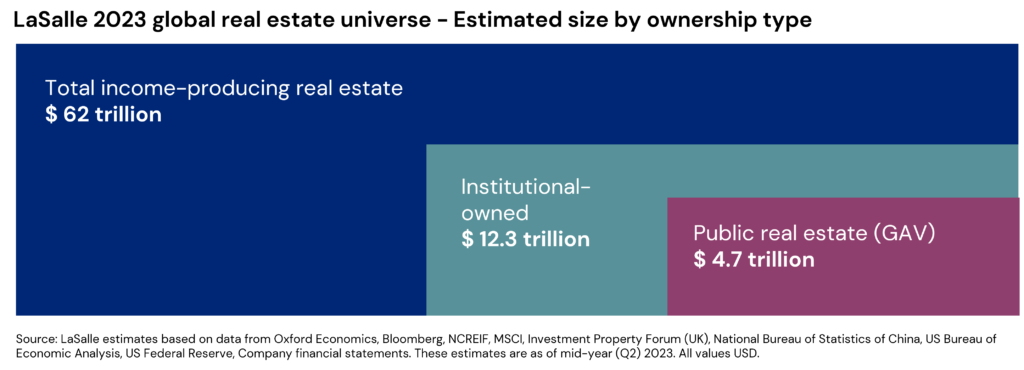

Our analysis shows that one fifth of global real estate is owned by institutional investors, and 40% of that institutional ownership is by listed companies. The estimates also break down market size by country, property type and city, using a methodology combining several bottom-up and top-down sources.
We take a closer look in this ISA Briefing at three key findings from the real estate universe analysis: (1) global income-producing real estate has recently ebbed to a below-average size relative to GDP, (2) real estate value has a fairly even distribution across the three major global regions and (3) those regions differ significantly in how real estate is distributed across metros, implying different optimal diversification strategies.
Figures in trillions can be so enormous that they lose some meaning — so it is helpful to put those numbers in context. An illuminating comparison is to put income producing real estate alongside other asset classes like stocks and bonds, as shown in the graph below.
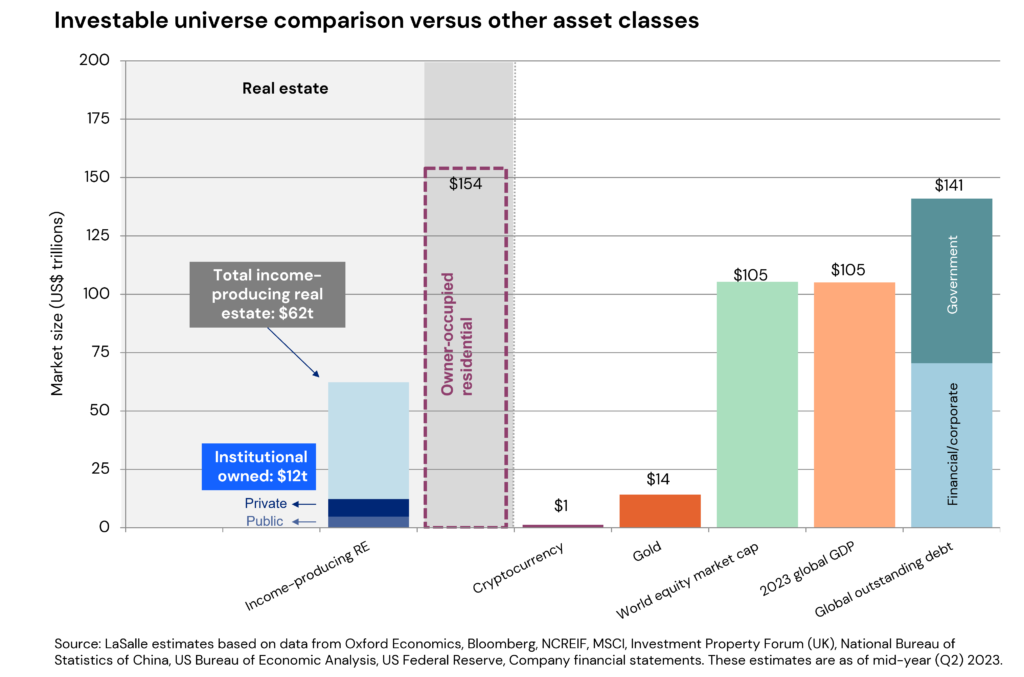

These estimates show global real estate is a smaller sibling to stocks and bonds but very much in the same family of major asset classes. Notably, owner-occupied residential real estate, which is not included in LaSalle’s real estate estimates, is significantly larger in size than all income-producing property, and even larger than the global fixed-income market.
Another useful comparator, shown below, is against global GDP. We estimate that real estate is equal to 60% of global GDP in 2023. This puts it at a low ebb relative to recent history. This is consistent with the historic pattern of real estate comprising a higher share of GDP late in expansions and then a lower share of GDP in repricing episodes. Currently our real estate market size estimate is near previous cyclical lows as a share of GDP seen in 2009-2012. Since 2000, our real estate market size estimates have averaged 68% of global GDP.
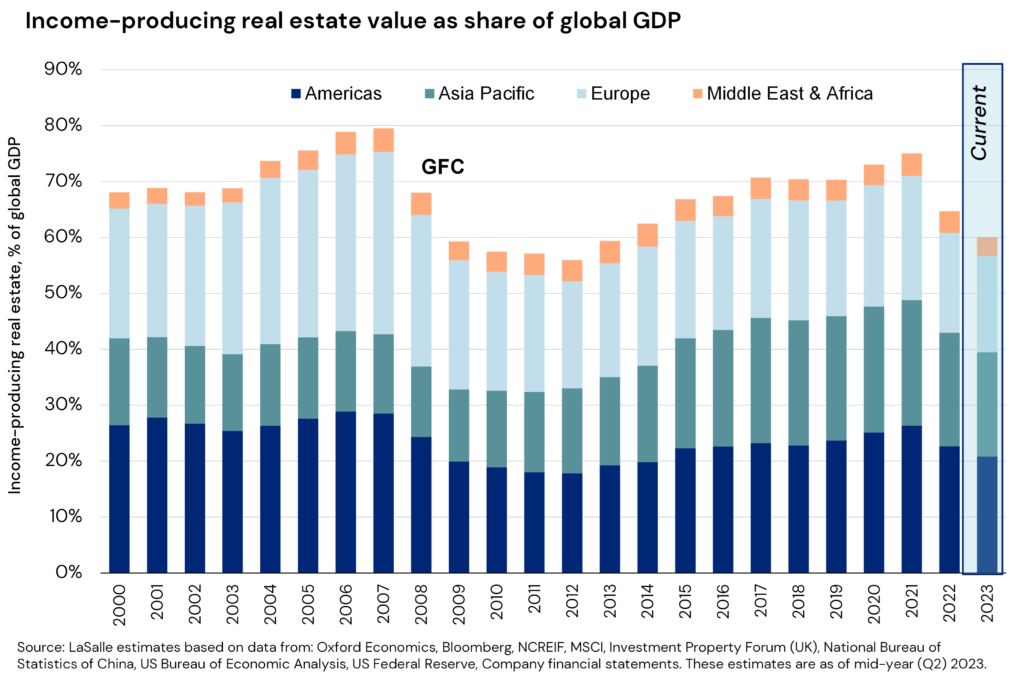

A second key finding from LaSalle’s universe estimates is the relatively even split in value observed between the three major regions of the Americas, Asia Pacific, and Europe. We estimate that 35% of income producing property is in the Americas, 31% in Asia Pacific, and 29% is in Europe. We believe these estimates from LaSalle’s real estate universe analysis better reflect the true opportunity set than other splits based on simple GDP or real estate indices, which can sometimes be lopsided based on where coverage is greatest or which types of investment fund products predominate. For example, 67% of the MSCI Global Property Fund Annual Index AUM is in North America.2
The split above suggests an even distribution of opportunities by region. At the same time, our national estimates also show global diversification can be achieved with a small number of countries. The eight countries with the most institutional-invested real estate together account for 70% of the invested universe. A focus on these larger countries — as well as multi-country funds — can enable investors to efficiently achieve diverse exposures, while also managing the challenges that come with differences in market practices, currency, regulation and building market knowledge.


Our third notable finding emerges when zooming in one level further from the national level to individual cities. Cities and their surrounding metropolitan areas form the underlying building blocks of the real estate universe; they are often the basic level of analysis investors have in mind when comparing market allocations.
LaSalle estimates institutional real estate market size are for the entire metropolitan (metro) market — including the principal city and its suburbs that are economically connected to it, adopting official metropolitan area definitions from national statistical agencies where available.


Real estate held in institutional investor portfolios is highly concentrated in the largest metros, and these local market size estimates highlight the degree of that concentration. The 40 largest metropolitan real estate markets account for 58% of all institutional property. Some of the world’s largest metro areas dwarf many individual countries when it comes to institutional real estate ownership. Our latest estimates show that there is likely more institutional-owned real estate in Greater Tokyo than in all but three of the 201 countries covered in our estimates.
The metro market size distribution varies considerably across regions, with important implications for portfolio strategy. Institutional real estate ownership in Asia Pacific is more concentrated in its largest metros than in any other region. And its real estate is far more concentrated in a few cities than its population. In Asia Pacific, 18 metros account for 75% of institutional property, whereas the equivalent metro total is 52 in the Americas. In Europe, real estate is the most dispersed across cities, reflecting its more fragmented quilt of different jurisdictions. Over 100 European metros must be amalgamated to account for 75% of the regional total. Such dispersion makes the task of setting target markets even more complex, which is where tools like the recently released LaSalle European Cities Growth Index (ECGI) can help.
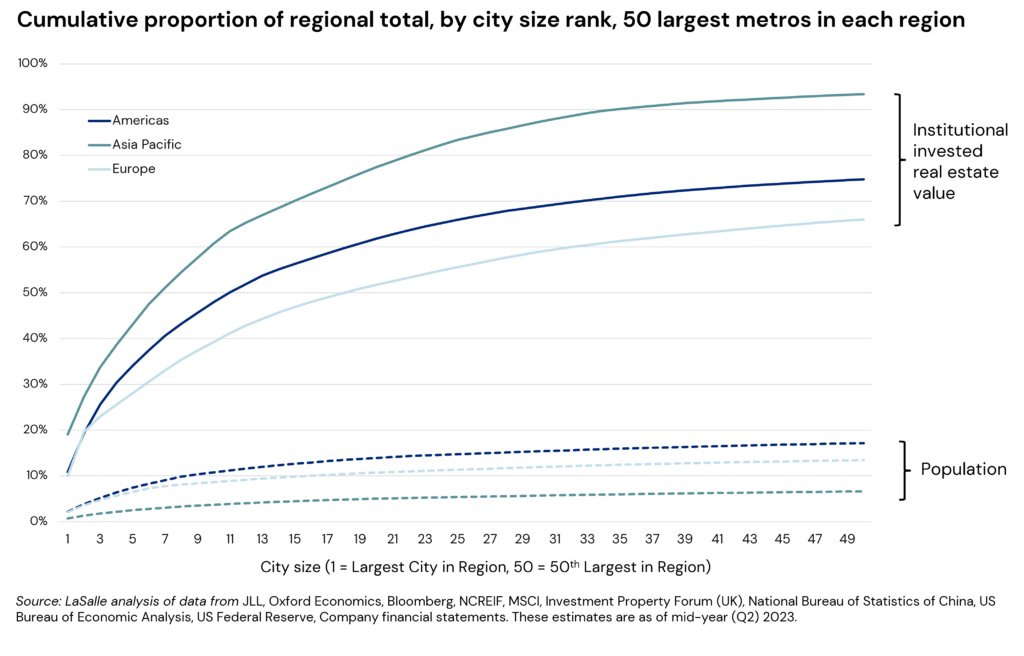

These differences impact investment strategy and approaches to diversification. Asia Pacific’s concentration of large institutional markets implies that investors may be able to achieve diversification by investing in fewer metros, but that it is also a region where each “bet” on geo-market allocation matters more. In Europe and North America, investors are more active across a larger number of medium-sized markets, offering diversification benefits as well as challenges in terms of access and efficiency.
Footnotes
1 Vintages around the time of market disruption tend to outperform, according to LaSalle analysis of data from the INREV Global IRR Index through Q4 2022. See page 30 of our ISA Portfolio View for a more complete discussion of this analysis.
2 Source: MSCI. Data as of 2022 (most recent available).
Important Notice and Disclaimer
This publication does not constitute an offer to sell, or the solicitation of an offer to buy, any securities or any interests in any investment products advised by, or the advisory services of, LaSalle Investment Management (together with its global investment advisory affiliates, “LaSalle”). This publication has been prepared without regard to the specific investment objectives, financial situation or particular needs of recipients and under no circumstances is this publication on its own intended to be, or serve as, investment advice. The discussions set forth in this publication are intended for informational purposes only, do not constitute investment advice and are subject to correction, completion and amendment without notice. Further, nothing herein constitutes legal or tax advice. Prior to making any investment, an investor should consult with its own investment, accounting, legal and tax advisers to independently evaluate the risks, consequences and suitability of that investment.
LaSalle has taken reasonable care to ensure that the information contained in this publication is accurate and has been obtained from reliable sources. Any opinions, forecasts, projections or other statements that are made in this publication are forward-looking statements. Although LaSalle believes that the expectations reflected in such forward-looking statements are reasonable, they do involve a number of assumptions, risks and uncertainties. Accordingly, LaSalle does not make any express or implied representation or warranty, and no responsibility is accepted with respect to the adequacy, accuracy, completeness or reasonableness of the facts, opinions, estimates, forecasts, or other information set out in this publication or any further information, written or oral notice, or other document at any time supplied in connection with this publication. LaSalle does not undertake and is under no obligation to update or keep current the information or content contained in this publication for future events. LaSalle does not accept any liability in negligence or otherwise for any loss or damage suffered by any party resulting from reliance on this publication and nothing contained herein shall be relied upon as a promise or guarantee regarding any future events or performance.
By accepting receipt of this publication, the recipient agrees not to distribute, offer or sell this publication or copies of it and agrees not to make use of the publication other than for its own general information purposes.
Copyright © LaSalle Investment Management 2023. All rights reserved. No part of this document may be reproduced by any means, whether graphically, electronically, mechanically or otherwise howsoever, including without limitation photocopying and recording on magnetic tape, or included in any information store and/or retrieval system without prior written permission of LaSalle Investment Management.
At a recent CREFC Europe event co-hosted by LaSalle and property developer Regal London, representatives from the real estate industry’s leading debt funds, banks, and developers came together to discuss the outlook for European real estate credit markets.
Hosted at LaSalle’s new London offices, the open-forum discussion between all participants covered topics such as the (re)financing environment for borrowers and lenders, where lenders and borrowers see best value and greatest opportunity, and who should assume the responsibility for bearing the costs of delivering sustainable real estate.
A higher interest-rate environment, quick on the heels of the pandemic, makes this an important juncture for participants in this diverse and opaque market to share perspectives. Introducing the session, Dominic Silman, LaSalle’s European Head of Debt and Value-Add Capital Research and Strategy, compared analysing real estate debt markets to the parable of the blind men and the elephant. Each interprets what they can feel, depending on the part of the elephant that they are holding – from snake to tree to fan. Likewise, real estate debt markets are covered by a variety of different data sets which, taken in isolation, can fail to capture the bigger picture.


Some of the megatrends remain readily apparent. The migration of commercial real estate lending activity away from banks and towards debt funds has been a dominant theme over the past 15 years. The long-running Bayes Business School study of UK CRE lending found that, in the first half of last year, debt funds exceeded domestic banks’ new originations for the first time. Funds will continue to play an increasing role in addressing the financing gap created by banks’ ongoing retrenchment and the considerable quantities of debt falling due for refinancing in the next 15 months.
However, it can be a challenging market for funds to negotiate those refinancings. David White, Managing Director in LaSalle’s Debt Investments team, pointed out that over the past 18 months, certain asset valuations have rebased – but it’s not always clear to what level.


Close collaboration between borrowers and lenders is becoming more critical than ever before in order to unlock the right structured financing solutions in the face of forthcoming debt maturities. Lenders need to work closely with sponsors to understand how business plans are evolving in light of the macroeconomic environment.
A lot of what is seen in the market today is focused on sectors with especially strong occupier fundamentals, and their ability both to capture rental growth in line with inflation and to access relatively liquid capital markets. Logistics, residential, student and select operational sectors, such as hospitality, are widely considered to offer resilient fundamentals. Marc Eden, Investment Director at Regal London, spoke of their decision to diversify across the beds sectors, from residential to student with hotels and later living in the mix too. Continuing the earlier theme, Richard Craddock, Managing Director in LaSalle’s Debt Investments team, explained that “elephants are going to the same few watering holes – beds, sheds and, selectively, ‘meds’”.
This is resulting in a reasonable degree of liquidity for originating new financings in those preferred sectors. In that context, a lender’s geographic scope and ability to deploy across borders offers flexibility to be more selective. Debt funds may also benefit from access to differentiated pockets of debt capital, from senior lending to mezzanine debt to development / refurbishment financing. Borrower demand for bespoke financing solutions makes this an attractive environment in which to be active and to deploy a broad range of capital across diverse market opportunities.
Outside of those preferred sectors, the consensus view seemed to be that the traditional sectors of offices and retail were most challenged, particularly for offices outside of Prime CBD where valuations were deemed not to have yet caught up with the cloud of uncertainty surrounding future occupier demand. A few participants with significant exposure to the office sector acknowledged that much of their time was consumed with managing their book. A key takeaway from this part of the conversation was that, regardless of sector, modern real estate is more operational, and lenders look beyond the assets themselves through to the sponsors. As with the period post-GFC, the market will see a flight to quality of assets and sponsors.
The discussion closed with a debate on the willingness of lenders – and their underlying investors – to encourage borrowers to invest in environmental upgrades by offering economic incentives.


The valuation premium for assets with top-performing ESG credentials, particularly in the office sector, is widely understood. Lenders can therefore frame this question from a risk-adjusted return perspective: a greener building makes for better-quality collateral and therefore reduced risk. A similar logic applies at the owner/occupier level. Jonathan Seal, CEO of Regal London explained that in his discussions with potential office occupiers, wellness, energy efficiency and the associated sustainability accreditations were incredibly important to draw people back to the workplace.


However, because of the opaque relationship between a building’s sustainability performance, the costs of refurbishment and the impact on cashflows and valuation, this requires a deep understanding by all parties of real estate fundamentals, asset carbon / ESG performance and how to underwrite specific assets and their associated business plans.
The conversation on ESG highlighted two key inter-linked challenges: metrics and data. There was consensus among participants – borrowers and lenders alike – that assets with better ESG credentials intuitively offer better risk profiles. However, due to the embryonic nature of some metrics and an inconsistency in others as well as lack of transparency in data, especially for social and governance considerations, there was no common language to help differentiate risk and respective margins. This made it difficult to agree on who should provide the financial incentives for the transition of assets.
Overall, the conversation underlined one of the key characteristics of lending markets today. Real estate credit is currently a highly attractive asset class – but it’s only those lenders able to underwrite individual asset-level fundamentals in terms of quality, location and ESG specifications who are best placed to capitalise.
CHICAGO, LONDON, SINGAPORE (Oct. 10, 2023) — LaSalle Investment Management (“LaSalle”) today announced that after 34 years of distinguished service and leadership of the firm’s global finance group, CFO Mike Ricketts will retire in Q2 2024. He will remain CFO through year-end 2023, and effective January 1, 2024, will be succeeded by Louis Bowers, current Global Head of Financial Planning & Analysis (FP&A) for JLL. Mike and Louis will work closely in the coming months to ensure continuity and a smooth transition of responsibilities.
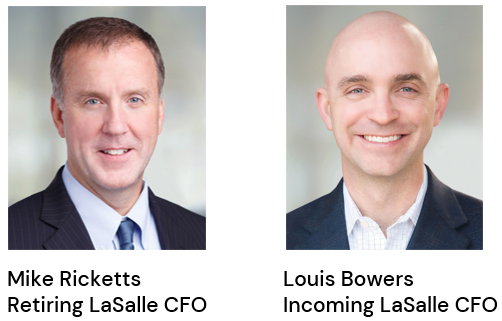

LaSalle CEO Mark Gabbay said, “Mike’s contributions and leadership at the firm cannot be overstated. Beyond his technical expertise, transparency and consistent drive to improve the business, Mike’s respect for others and collegial nature helped establish LaSalle’s award-winning culture. He is one of a kind, and we wish him the best on his well-deserved retirement. We look forward to Louis joining LaSalle in this global leadership role, and the benefit of his experience and connection to the broader JLL business.”
Louis joined JLL in September 2014 and served as the Global Controller and Principal Accounting Officer from August 2015 until December 2021. During this period, he oversaw JLL’s accounting policies, external reporting, Sarbanes-Oxley compliance and adherence to applicable regulatory requirements. He also helped the organization navigate through many complex aspects of change, ranging from adopting new accounting standards to integrating significant M&A volume.
Since December 2021, Louis has been Global Head of FP&A, during which he has helped lead JLL’s efforts to pivot its reporting segments to global business lines and implement a new standardized cost allocation methodology. During this tenure, Louis has also been responsible for the company’s budgeting and forecasting processes, periodic financial reporting to senior leadership and the Board of Directors, and providing ongoing support for the company’s quarterly earnings. Prior to joining JLL, Louis served in various positions at Retail Properties of Americas, Inc, a multi-tenant retail REIT, as well as member of KPMG’s audit practice.
Louis Bowers, incoming LaSalle CFO said, “I am eager to join LaSalle in this important global finance role. I have enjoyed and admired working alongside Mike over the years, and look forward to working with the teams around the world to optimize our financial performance in the years ahead.”
Mike Ricketts, retiring LaSalle CFO said, “I am grateful for my time and experience working at LaSalle. The growth and prosperity of the firm is a result of our people, and Louis is the right leader to advance our finance segment in the next phase of growth. I look forward to working with him in the months ahead, and tracking the continued success of the firm in the future.”
About LaSalle Investment Management | Investing Today. For Tomorrow
LaSalle Investment Management is one of the world’s leading real estate investment managers. On a global basis, LaSalle manages approximately $78 billion of assets in private and public real estate property and debt investments as of Q1 2023. LaSalle’s diverse client base includes public and private pension funds, insurance companies, governments, corporations, endowments and private individuals from across the globe. LaSalle sponsors a complete range of investment vehicles including separate accounts, open- and closed-end funds, public securities and entity-level investments. For more information, please visit http://www.lasalle.com, and LinkedIn.
Forward looking statement
The information discussed above is based on the market analysis and expectations of LaSalle and should not be relied upon by the reader as research or investment advice regarding LaSalle funds or any issuer or security in particular. The information presented herein is for illustrative and educational purposes and is not a recommendation, offer or solicitation to buy or sell any securities or to adopt any investment strategy in any jurisdiction where prohibited by law or where contrary to local law or regulation. Any such offer to invest, if made, will only be made to certain qualified investors by means of a private placement memorandum or applicable offering document and in accordance with applicable laws and regulations. Past performance is not indicative of future results, nor should any statements herein be construed as a prediction or guarantee of future results.























































































We have been fielding questions on two big macroeconomic topics impacting the Asia-Pacific region: (1) the outlook for China’s economic recovery and (2) the path of the Bank of Japan’s monetary policy. These involve legitimate worries about China’s growth engine and the risk of interest rate hikes in Japan. Nonetheless, we find that media coverage of these topics can sometimes sensationalize their implications without going below the surface.
In this ISA Briefing, and the accompanying LaSalle Macro Quarterly (LMQ), we dissect these concerns and share our views on several frequently asked questions. Our analysis points to a nuanced picture that is more supportive of investments in these two countries than the media coverage might suggest.
China’s economic recovery has been slower than in past cycles, as we anticipated in our ISA Briefing from early March (China’s Great Reopening). While exports and for-sale residential investment have been sluggish, domestic consumption, industrial output, manufacturing and infrastructure investment continue to support the economy (see the chart below). The for-sale residential market could bottom in the next 6-12 months as demand-supply dynamics gradually improve. Unlike previous downturns, the government has not announced a blast of mega monetary or fiscal stimulus. This conservative approach could help ensure a sustainable long-term growth environment for the Chinese economy without unintentionally creating new imbalances.
We expect economic activity in China to continue to recover through 2024. Various supportive economic measures designed to boost business and consumer confidence were rolled out after the Politburo meeting on July 24; however, it takes time for stimulus measures to take effect. We continue to expect a modest recovery in China this year, likely close to the 5% GDP growth target. But oft-cited concerns over the Chinese economy such as the weak for-sale residential sector, the defaults of highly leveraged real estate developers, high youth unemployment and deflationary pressures deserve to be addressed, as we do in this FAQ.
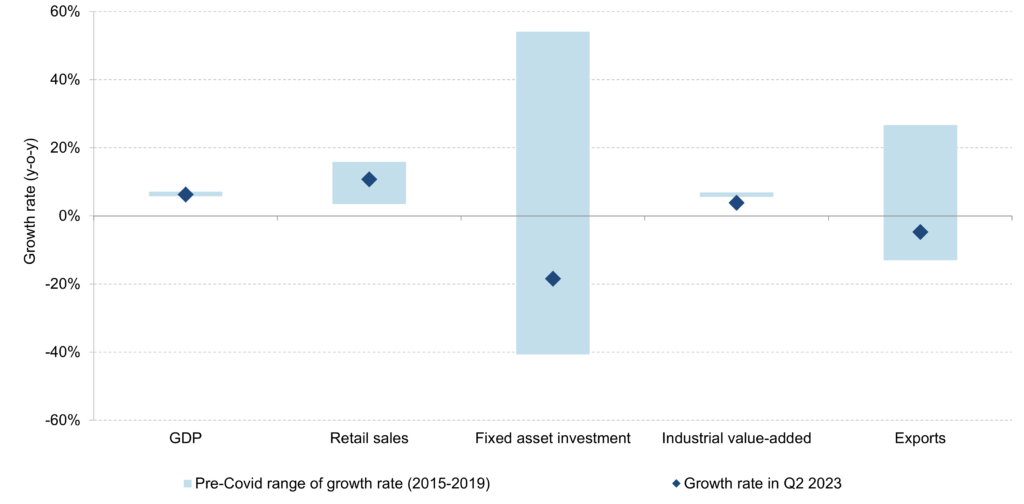

Note: The growth rate of industrial value-added is the y-o-y growth rate of the YTD data. The growth rates of other indicators are the y-o-y growth rates of quarterly data. The historical ranges of the indicators are based on historical y-o-y growth rates in the 20 quarters in 2015-2019.
Sources: The National Bureau of Statistics of China (GDP growth, retail sales volume, fixed asset investment growth, and industrial value-add growth), as of Q2 2023; General Administration of Customs (export growth), as of Q2 2023; LaSalle Investment Management (retail sales growth), as of Q2 2023.
Despite short-term volatility in sales volume and prices, China’s for-sale residential sector is experiencing a slowing decline in sales volumes and prices compared to the second half of 2022. In Tier 1 cities, however, both sales volume and prices are already improving [LMQ page 24]. In the next 6-12 months, the overall for-sale residential market could reach bottom, supported by government policies, a decline in supply and a reduction in mortgage rates and down payments. We expect the subsequent recovery to be gradual. For-sale residential prices may improve, though sales volumes are unlikely to recover to their prior peak. We expect housing markets in Tier 1 and top Tier 2 cities to lead the recovery of low-tier cities.
Despite our expectation of an eventual recovery in China’s for-sale residential sector, the outlook for over-leveraged developers with large exposures to low-tier cities, including Evergrande and Country Garden, remains gloomy. The resolution of these developers’ onshore and offshore corporate debt is expected to take time, which will continue to draw media attention. However, the impact of the default or bankruptcy of these troubled residential developers on the Chinese financial system has been limited so far, and we expect it to remain so, given the exposure of Chinese commercial banks to real estate construction loans only accounted for ~4% of their total assets as of the second quarter of 2023.1 Even for the more vulnerable trust companies, the exposure to real estate declined from ~13% of their total assets in the second quarter of 2019 to ~5% in the second quarter of 2023.2
The unemployment rate of the labor force aged 16-24 in China is rising. However, the direct impacts of this on retail sales and the broader economy are likely to be limited. Those aged 16-24 accounted for only around ten percent of the Chinese population as of 2021.3 In addition, many of those aged 16-24 are still in school, given that young people in China finish education at around age 20, on average.4 There could be some indirect impacts of high youth unemployment on household confidence, although we do not expect them to be significant given that the unemployment rate for the key labor force in China (aged 25-59) is at its lowest level since 2018 [LMQ page 25].
It is true that China’s headline inflation rates have been fluctuating around 0% in recent months, primarily driven by food and energy prices coming off peak levels post lockdowns. However, the core inflation rate (excluding food and energy) remains in positive territory [LMQ page 16]. As the Chinese economy gradually recovers and the post-lockdown effects fade, we expect inflation to gradually escalate.
The Bank of Japan (BoJ) remains an outlier among global central banks, as it continues to maintain ultra-accommodative policy in the form of yield curve control (YCC). The BoJ introduced YCC in 2016, with the intent to keep 10-year government bond yields low to stimulate consumer spending and business investment. Over the past year, speculation has mounted as to whether this policy would be sustained, with volatility being triggered around moments of policy adjustments or speculation that YCC would be abandoned.
Most recently, on September 22, the BoJ kept the YCC policy unchanged with a unanimous vote. The 3-month rates used a reference for borrowing costs have been bouncing around -0.2 to -0.1%, while the 10-year Japanese government bond (JGB) yields have increased to 0.73% since the BoJ’s surprise tweak to the YCC in December last year [LMQ page 7].5 Inflation in Japan has been running above the BoJ’s two percent target over the past 17 months,6 which in theory could be a catalyst for the BoJ to make more tweaks to its YCC policy or even exit it in the near term. But the answers to complex questions about the trajectory of rates in Japan aren’t so simple; policy actions and capital market reactions are inherently difficult to predict, but are likely to be less dramatic than feared.
The latest BoJ inflation projections and Tankan survey results7 suggest that inflation could remain above the BoJ’s 2% target at least over the next 12 months [LMQ page 19]. Wages in Japan, a key component of inflation, grew by 2.3% y-o-y in July 2023 due to a tight labor market.8 Employment conditions are expected to tighten further in the near term,9 potentially reaching levels last seen in 1990s. The 2024 Shunto (spring) wage negotiation is the next key event to monitor. Hence, it is as yet uncertain whether wage growth in Japan could remain consistently above its 2% target.
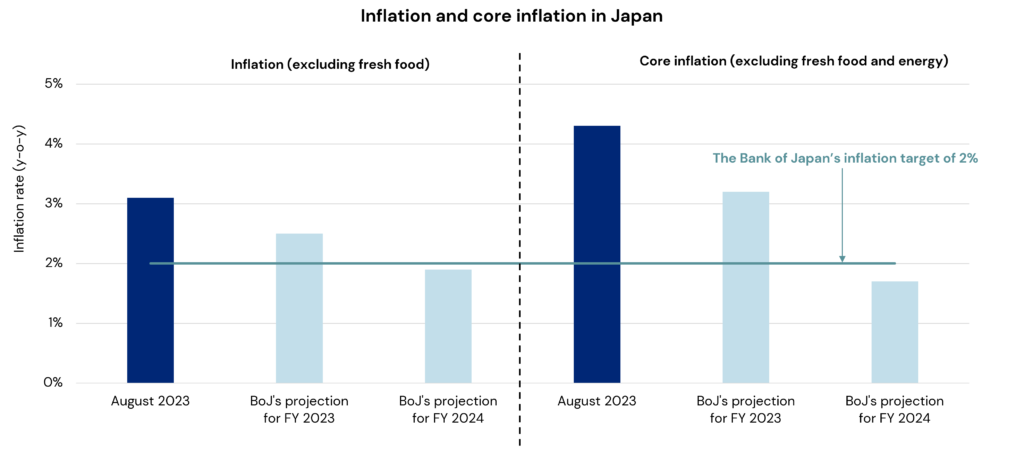

Source: The Japan Statistics Bureau (historical inflation data), as of August 2023. The Bank of Japan (inflation projection for fiscal year 2023 and 2024), as of July 2023.
Inflationary pressures do not exist in a national vacuum. Thankfully, inflation is now declining in other developed markets [LMQ page 12], potentially giving the BoJ more time to evaluate the prospects for inflation in Japan. Many central banks, following the lead of the US Federal Reserve, are seen to be at or near the end of their tightening cycles as inflationary pressure tapers. That said, global central banks are highly unlikely to cut interest rates sharply any time soon, unless economies fall into deep recession. Therefore, we expect the interest rate differential between Japan and the US to remain wide but may narrow somewhat in the near term. Moderation in the interest rate differential could help the weak yen to regain some ground, which might also alleviate some pressure on the BoJ.
Inflation in Japan has been outpacing wage growth, putting pressure on Prime Minister Fumio Kishida’s approval ratings, according to a poll conducted by the Asahi Shimbun newspaper on September 18. There is a strong political impetus for Kishida and the new cabinet to ensure wage growth consistently exceeds the inflation rate. Moreover, as more than 70% of the mortgage loans in Japan have floating rates,10 there is a strong incentive for the BoJ to keep short-term interest rates relatively low. BoJ measures that could derail Japan’s economic recovery or disrupt the capital markets could be considered politically risky and thus less likely.
Footnotes
1 Source: The People’s Bank of China (total amount of outstanding real estate construction loans), as of Q2 2023; State Administration of Financial Supervision and Administration of China (total assets of commercial banks), as of Q2 2023
2 Source: The China Trustee Association, as of Q2 2023
3 Source: The National Bureau of Statistics of China, as of 2021
4 Source: LaSalle Investment Management, as of 2021. The estimation is based on the average years of education among the young labor force in China published by the Ministry of Education of China in 2021.
5 Source: Bloomberg, as of September 25, 2023
6 Source: The Japan Statistics Bureau, as of August 2023
7 Source: The Bank of Japan’s Tankan survey on the inflation expectation and the output price expectation among corporates of all industries, as of June 2023
8 Source: The Japan Statistics Bureau, as of August 2023
9 The Bank of Japan’s Tankan survey: all-industry employment conditions, as of June 2023
10 Source: The Japan Housing Finance Agency, covering home loans between October 2022 and March 2023.
Important Notice and Disclaimer
This publication does not constitute an offer to sell, or the solicitation of an offer to buy, any securities or any interests in any investment products advised by, or the advisory services of, LaSalle Investment Management (together with its global investment advisory affiliates, “LaSalle”). This publication has been prepared without regard to the specific investment objectives, financial situation or particular needs of recipients and under no circumstances is this publication on its own intended to be, or serve as, investment advice. The discussions set forth in this publication are intended for informational purposes only, do not constitute investment advice and are subject to correction, completion and amendment without notice. Further, nothing herein constitutes legal or tax advice. Prior to making any investment, an investor should consult with its own investment, accounting, legal and tax advisers to independently evaluate the risks, consequences and suitability of that investment.
LaSalle has taken reasonable care to ensure that the information contained in this publication is accurate and has been obtained from reliable sources. Any opinions, forecasts, projections or other statements that are made in this publication are forward-looking statements. Although LaSalle believes that the expectations reflected in such forward-looking statements are reasonable, they do involve a number of assumptions, risks and uncertainties. Accordingly, LaSalle does not make any express or implied representation or warranty, and no responsibility is accepted with respect to the adequacy, accuracy, completeness or reasonableness of the facts, opinions, estimates, forecasts, or other information set out in this publication or any further information, written or oral notice, or other document at any time supplied in connection with this publication. LaSalle does not undertake and is under no obligation to update or keep current the information or content contained in this publication for future events. LaSalle does not accept any liability in negligence or otherwise for any loss or damage suffered by any party resulting from reliance on this publication and nothing contained herein shall be relied upon as a promise or guarantee regarding any future events or performance.
By accepting receipt of this publication, the recipient agrees not to distribute, offer or sell this publication or copies of it and agrees not to make use of the publication other than for its own general information purposes.
Copyright © LaSalle Investment Management 2023. All rights reserved. No part of this document may be reproduced by any means, whether graphically, electronically, mechanically or otherwise howsoever, including without limitation photocopying and recording on magnetic tape, or included in any information store and/or retrieval system without prior written permission of LaSalle Investment Management.
Our latest LaSalle European Cities Growth Index (ECGI) ranks European cities with the strongest economic prospects based on data inputs of economic growth, human capital, business risk and – for the first time – extreme heat.
The 2023 edition highlights the steady strong positions of both London and Paris, which are set to account for more growth than Europe’s next nine top-ranked cities combined. Interestingly, Paris has overtaken London as the top destination for venture capital funding for the first time since LaSalle began tracking this data in 2006, receiving particularly elevated levels of investment into its technology sector.
Nordic cities appear to have an increasing advantage due to demographic trends, a skilled workforce and world-leading pharma, industrial tech and creative industries; they account for a quarter of the top 20 cities. German cities have continued to perform strongly in the index despite slow population growth. On the other hand, Rome and other Italian cities’ rankings are most negatively impacted after a new factor accounting for extreme heat days was added to the ECGI this year.
Elsewhere, Prague and Warsaw have been identified as having promising growth prospects as more expats return and high-skilled workers remain, with this “brain gain” leading them to their highest scores since the global financial crisis. The index also reflects that Warsaw is becoming an attractive place for employment in the technology sector and Prague is forecast to benefit from a jobs boom.
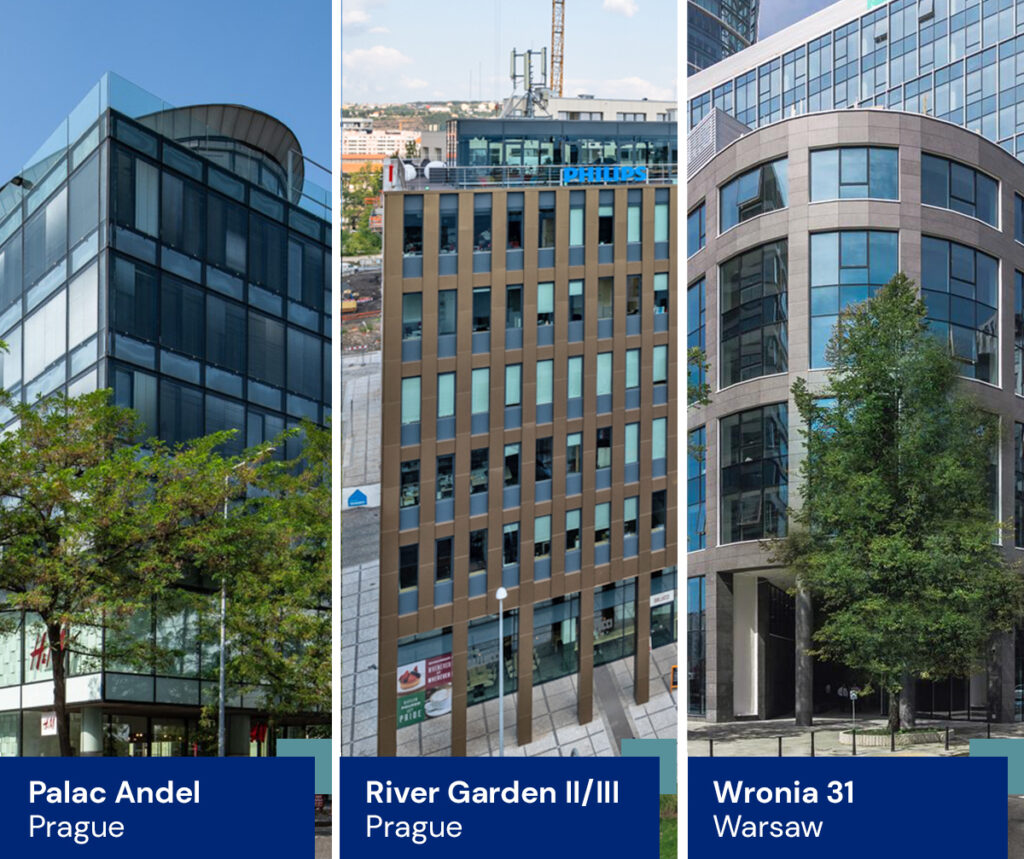

London (September 25, 2023) – LaSalle Investment Management (“LaSalle”), the global real estate investment manager, today announces that three of its office buildings in Central and Eastern Europe – two in Prague and one in Warsaw – have achieved Platinum WiredScore certification. These certifications, which recognise office buildings with best-in-class digital connectivity, demonstrate LaSalle’s commitment to providing its tenants with high-calibre and differentiated office spaces through its active asset management strategy.
River Garden II/III, located in one of Prague’s fastest-growing neighbourhoods, has already achieved an ‘Excellent’ BREEAM rating on account of its strong sustainability performance. Its tenants include NCR, Hill’s Pet Nutrition, Total and Philips. Palac Andel, also located in Prague, has already achieved a ‘Very Good’ BREEAM In-Use rating, boasts an outstanding urban location and is home to Toyota, Landis+Gyr and FertiCare among others. These two buildings mark the first Czech office buildings to receive WiredScore Platinum certificates, signifying their exceptional quality in wired infrastructure.
The third building to attain this certification is Wronia 31, in Warsaw. Located in the heart of the Polish capital, the building holds an ‘Outstanding’ BREEAM accreditation. Among its tenants are Frontex and BNP Paribas Security Services.
Beverley Kilbride, Chief Operating Officer, Europe at LaSalle, said: “With this accreditation, all of LaSalle’s office properties in the CEE region are now WiredScore Platinum-certified, offering best-in-class digitally-connected buildings to our tenants. As we witness the flight to quality within the European office market gather pace, with occupiers favouring state-of-the-art workspaces and shunning those that are dated or undifferentiated, these certifications underscore LaSalle’s strategy of providing market-leading properties with exceptional connectivity and full function of digital features.”
ENDS
About LaSalle Investment Management | Investing Today. For Tomorrow.
LaSalle Investment Management is one of the world’s leading real estate investment managers. On a global basis, LaSalle manages approximately $77 billion of assets in private and public real estate property and debt investments as of Q2 2023. LaSalle’s diverse client base includes public and private pension funds, insurance companies, governments, corporations, endowments and private individuals from across the globe. LaSalle sponsors a complete range of investment vehicles, including separate accounts, open- and closed-end funds, public securities and entity-level investments.
For more information, please visit www.lasalle.com, and LinkedIn.
Investing today. For tomorrow.
NOTE: This information discussed above is based on the market analysis and expectations of LaSalle and should not be relied upon by the reader as research or investment advice regarding LaSalle funds or any issuer or security in particular. The information presented herein is for illustrative and educational purposes and is not a recommendation, offer or solicitation to buy or sell any securities or to adopt any investment strategy in any jurisdiction where prohibited by law or where contrary to local law or regulation. Any such offer to invest, if made, will only be made to certain qualified investors by means of a private placement memorandum or applicable offering document and in accordance with applicable laws and regulations. Past performance is not indicative of future results, nor should any statements herein be construed as a prediction or guarantee of future results.
investment vehicles, including separate accounts, open- and closed-end funds, public securities and entity-level investments. For more information, please visit www.lasalle.com, and LinkedIn.























































































The transition to a lower-carbon built environment is reshaping the definition of quality real estate. We can point to numerous anecdotal examples of green building features driving higher rents and values, as well as better overall performance. However, showing this rigorously and quantitively is challenging.
Various academics, real estate agencies and other researchers have attempted to measure the difference between assets that possess and those that lack green features. They use a range of datasets that vary widely and have enjoyed varying degrees of success in drawing clear, convincing findings from their analysis.
So is there a green premium? Or a brown discount?
Price, value and performance differentials between assets that possess and those that lack certain sustainable credentials are often called one of the other. In our view, the difference between the green premiums and brown discounts is a matter of perspective and can vary with time, as given attributes transition from novel, to highly valued, to standard.
For simplicity’s sake, we think of them as a single concept that we call “the value of green.”
Our approach for this report is to examine the existing work on the topic and identify the most helpful and relevant analyses. This sits alongside our monitoring of outcomes within our own portfolio, a few examples of which we highlight as case studies.
We find that while the range of estimates are wide, and depend on a variety of methodological considerations, the studies consistently find a statistically significant financial impact of asset sustainability features on metrics such as achieved rent, capital value, leasing success and overall performance. We will continue to monitor the evolving evidence of these differentials, both in the broader literature and within our portfolios.
The art and science of portfolio construction matters most when market conditions change suddenly. This has never been truer than in the past few years, which saw major pivots in capital markets as policymakers shifted from trying to stimulate the economy at the start of the pandemic, to applying the breaks to prevent inflation running out of control. The speed and unpredictability of these changes highlights the importance of planning ahead by thinking carefully about how to create portfolios that can be expected to be resilient. Foundational concepts of portfolio management such as diversification and risk management should be considered alongside an investor’s objectives and values to devise a strategy for their portfolio.
It is with these factors in mind that we release first edition of LaSalle’s ISA Portfolio View, which seeks to answer five foundational questions about real estate:















In many ways the ISA Portfolio View is the continuation of a longstanding strand of LaSalle’s analysis that would typically form the latter chapters of the Investment Strategy Annual. In this new standalone edition, we draw from a deep pool of experts from around the firm, acknowledging the interconnectedness of real estate opportunities: across borders, across sectors, and across quadrants. We welcome your questions and feedback.
Important Notice and Disclaimer
This publication does not constitute an offer to sell, or the solicitation of an offer to buy, any securities or any interests in any investment products advised by, or the advisory services of, LaSalle Investment Management (together with its global investment advisory affiliates, “LaSalle”). This publication has been prepared without regard to the specific investment objectives, financial situation or particular needs of recipients and under no circumstances is this publication on its own intended to be, or serve as, investment advice. The discussions set forth in this publication are intended for informational purposes only, do not constitute investment advice and are subject to correction, completion and amendment without notice. Further, nothing herein constitutes legal or tax advice. Prior to making any investment, an investor should consult with its own investment, accounting, legal and tax advisers to independently evaluate the risks, consequences and suitability of that investment.
LaSalle has taken reasonable care to ensure that the information contained in this publication is accurate and has been obtained from reliable sources. Any opinions, forecasts, projections or other statements that are made in this publication are forward-looking statements. Although LaSalle believes that the expectations reflected in such forward-looking statements are reasonable, they do involve a number of assumptions, risks and uncertainties. Accordingly, LaSalle does not make any express or implied representation or warranty, and no responsibility is accepted with respect to the adequacy, accuracy, completeness or reasonableness of the facts, opinions, estimates, forecasts, or other information set out in this publication or any further information, written or oral notice, or other document at any time supplied in connection with this publication. LaSalle does not undertake and is under no obligation to update or keep current the information or content contained in this publication for future events. LaSalle does not accept any liability in negligence or otherwise for any loss or damage suffered by any party resulting from reliance on this publication and nothing contained herein shall be relied upon as a promise or guarantee regarding any future events or performance.
By accepting receipt of this publication, the recipient agrees not to distribute, offer or sell this publication or copies of it and agrees not to make use of the publication other than for its own general information purposes.
Copyright © LaSalle Investment Management 2023. All rights reserved. No part of this document may be reproduced by any means, whether graphically, electronically, mechanically or otherwise howsoever, including without limitation photocopying and recording on magnetic tape, or included in any information store and/or retrieval system without prior written permission of LaSalle Investment Management.
TOKYO (July 31, 2023) — LaSalle Investment Management (“LaSalle”), in partnership with Tokyu Land Corporation and NIPPO Company, announces today the completion of Logiport Nagoya. With a total floor area of 354,744m2 spread across four floors, Logiport Nagoya is the largest multi-tenant logistics facility in the Tokai region.
Located approximately 4.8km from Nagoya Station, one of Japan’s busiest train stations, and 2.2km from Nagoya Expressway Route 5 Manba Route, Logiport Nagoya enjoys excellent access to both the rail and expressway networks. In addition, it is a short 8-minute walk from Hatta Station on the Nagoya Municipal Subway Higashiyama Line, JR Kansai Main Line and Kintetsu Nagoya Line, making it highly convenient for regional commuters.
In terms of features, Logiport Nagoya is equipped with two rampways to access each floor. The facility has a floor load of 1.5t/m2, an effective height of at least 5.5m and a column span of at least 10m, enabling it to respond flexibly to different tenant needs. A disaster prevention center that operates 24 hours a day, 365 days a year maintains the security of the building while a vibration control structure that is resistant to shaking during earthquakes and a 72-hour emergency power generator in case of power outages support business continuity for tenants.
The development and construction of Logiport Nagoya took into consideration environmental sustainability, featuring energy-saving LED lighting, an irrigation system that reuses rainwater and a plan to utilise the facility’s roof for solar power generation, among others. As a result of these efforts, Logiport Nagoya has received the highest rank of S (excellent) from the Comprehensive Evaluation System for Built Environment Efficiency (CASBEE) and the highest five-star rating from the Building Energy Efficiency Labeling System (BELS).
Built with a concept of “Logiport Town”, Logiport Nagoya seeks to make a positive impact on the community to which it belongs. An integrated plaza with landscaping, seating and a playground has been developed for the immediate benefit of the public. Meanwhile, Logiport Nagoya plans to collaborate with the city of Nagoya and the local community on disaster prevention and disaster response. In a nod to the site’s history when railway tracks used to enable direct cargo delivery to and from the nearby Hatta Station, architectural elements that recall railway siding have been incorporated into the design of sidewalks around the facility, which have also been widened.
Logiport Nagoya is 66% leased (approximately 192,000m2) at the time of its completion.
Mari Nagai, Head of Logistics at LaSalle Japan, said, “One of Logiport Nagoya’s strongest attributes is its excellent location close to Nagoya Station. This proximity is comparable to the distance from Tokyo Station to Roppongi or from Empire State Building to One World Trade Center. Combined with its scale and superior features, Logiport Nagoya is well positioned as an urban distribution center.”
Kunihiko Okumura, CEO of LaSalle Japan, said, “Logiport Nagoya is the largest logistics facility we have ever developed. Given the tenant demand for modern logistics solutions that are efficient and flexible, we expect the facility to be a game changer for the Nagoya logistics market.”
About LaSalle Investment Management | Investing Today. For Tomorrow.
LaSalle Investment Management is one of the world’s leading real estate investment managers. On a global basis, LaSalle manages over $79 billion of assets in private and public real estate property and debt investments as of Q4 2022. LaSalle’s diverse client base includes public and private pension funds, insurance companies, governments, corporations, endowments and private individuals from across the globe. LaSalle sponsors a complete range of investment vehicles including separate accounts, open- and closed-end funds, public securities and entity-level investments. For more information please visit www.lasalle.com and LinkedIn.
NOTE: This information discussed above is based on the market analysis and expectations of LaSalle and should not be relied upon by the reader as research or investment advice regarding LaSalle funds or any issuer or security in particular. The information presented herein is for illustrative and educational purposes and is not a recommendation, offer or solicitation to buy or sell any securities or to adopt any investment strategy in any jurisdiction where prohibited by law or where contrary to local law or regulation. Any such offer to invest, if made, will only be made to certain qualified investors by means of a private placement memorandum or applicable offering document and in accordance with applicable laws and regulations. Past performance is not indicative of future results, nor should any statements herein be construed as a prediction or guarantee of future results.























































































In recent editions of LaSalle Macro Quarterly (LMQ), many charts have highlighted interest rate rises. LaSalle has especially focused on the repricing of income-producing real estate that rate rises have triggered in much of the globe. But the spike in rates is also having an impact on owner-occupied residential real estate, which accounts for a much larger share of the global property pie than do institutional assets. As we release the LMQ for Q3 2023, we look at the broad implications of higher residential mortgage rates, and how they vary by country. Even if institutional investors do not directly touch owner-occupied housing, they should consider the risks (and a few opportunities) caused by these dynamics.
Higher residential mortgage rates have implications for both new buyers and existing owners. For new buyers, higher rates reduce the purchase price they can pay (assuming a fixed amount of debt service). In practice, buyers cope with this by dedicating a larger share of their income to housing, or by scaling back or postponing their home purchase ambitions. For economies in which housing constitutes a meaningful share of the economy, this can create a noticeable drag on GDP growth. It may also put downward pressure on home prices, which can have indirect wealth effects on consumer spending. (So far, house prices for key countries have held up reasonably well during this period of rising rates—as shown in the chart on page 7 of the LMQ—but risks remain.)
For existing owners, much depends on the specific terms of the mortgage. The US mortgage market is unique globally in having a very large share of loans with rates that are fixed over a fully amortizing term (typically 30 years), according to data from Fitch. Assuming they do not move, borrowers can continue to enjoy low fixed payments. Elsewhere in the world, residential mortgage rates are usually floating or fixed only for a limited time. When rates rise, they filter through to borrowers gradually as fixed rate periods end—in other words, when rates reset. Depending on the mechanism for rate resets, they can cause a direct hit to disposable incomes. Households may react to this by scaling back spending elsewhere, or in the extreme, leaving the ranks of homeownership. These impacts will be more significant in places where consumers already have a high debt service burden.
For investors in income-producing institutional real estate, there are two aspects of these dynamics that are especially relevant. One is the broad recession risk that comes from weaker housing markets and stretched consumers. Oxford Economics has cited differential exposures to mortgage resets as a driver of divergence in near-term economic growth between the US and Canada. Second, the substitution effect from owned to rented housing may provide a boost to both multifamily and single-family rental demand, potentially driving stronger performance for residential strategies.
Canada is an interesting case study because the structural characteristics of its residential mortgage market and the availability of transparent data permit a relatively clear identification of mortgage rate resets. Most residential mortgages in Canada have 25- or 30-year amortization periods, with typical fixed rate periods (known as “terms”) running from as short as one year to as long as ten years, according to the Bank of Canada. Some mortgages have a fixed interest rate that is reset for the next term according to the prevailing market rate. This occurs through a renewal at the end of each term, until the mortgage is fully paid off. According to Bank of Canada (see table), fixed-rate mortgages account for two-thirds of balances outstanding in the country among lenders. Most fixed-rate mortgages have remaining terms of five years or more (40% of overall balances), followed by three-to-five years at 18.4%. Only 8.5% of all fixed-rate mortgages expire in the next three years
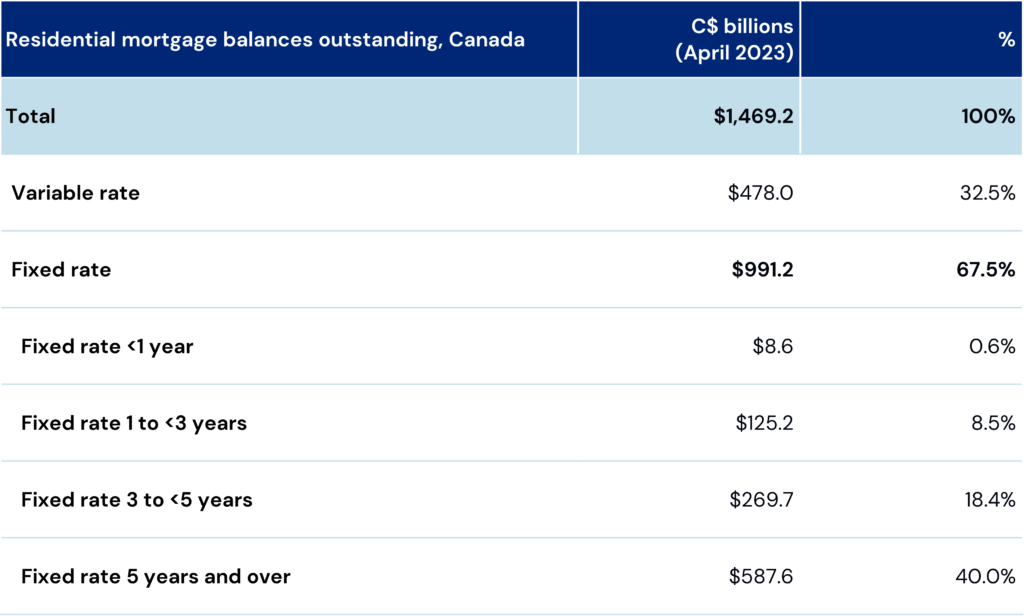

However, the remaining one-third of Canadian mortgages are variable rate, which float based on short-term interest rate movements. The Bank of Canada has hiked interest rates nine times since March 2022, pushing up rates on some variable-rate mortgages to around 6.0%, from roughly 2.8% a year ago. The most common type of variable-rate mortgages in Canada have fixed monthly payments. As interest rates rise, a higher proportion of the payment goes toward interest and less toward principal. Rising rates over the past 18 months have put some borrowers in the position of having monthly payments that do not cover the interest portion of the mortgage. The excess (unpaid) interest for that month gets added to the principal, increasing the original mortgage amount. Compared to countries where the absolute monthly payment amount adjusts directly with rates, this mechanism prevents an immediate near-term hit to disposable income from rising rates. But it does effectively embed the impact of higher rates into a longer-term increase in debt on household balance sheets.
Beyond Canada, which countries are impacted by rising residential mortgage rates? Cross-border comparisons are not straightforward; the devil is in the detail. Nuances to consider include variation in fixed-rate terms, amortization periods, interest rate levels, and when and how rates reset. Many factors, including macro indicators like household debt levels and the structure of countries’ residential mortgage markets, need to be considered in assessing a market’s exposure.
One persistent issue is that data on the relative shares of fixed- versus variable-rate mortgages by country tend to classify any mortgage as fixed rate if it is fixed for a period of time, even if it that rate will reset in the near term. Analysis by Fitch Ratings attempts to correct for this with a metric that includes any mortgages with rates that are expected to expire or reset within 24 months. On this analysis, Australia leads in exposure to resets, followed by Spain, the UK, and Canada. Australian mortgages with fixed rates generally have shorter fixed-rate periods of around two years; this compares with five years in the United Kingdom and Canada, and 30 years in the U.S. (Although not in the Fitch dataset, we understand that Sweden is also relatively highly exposed to resets.)
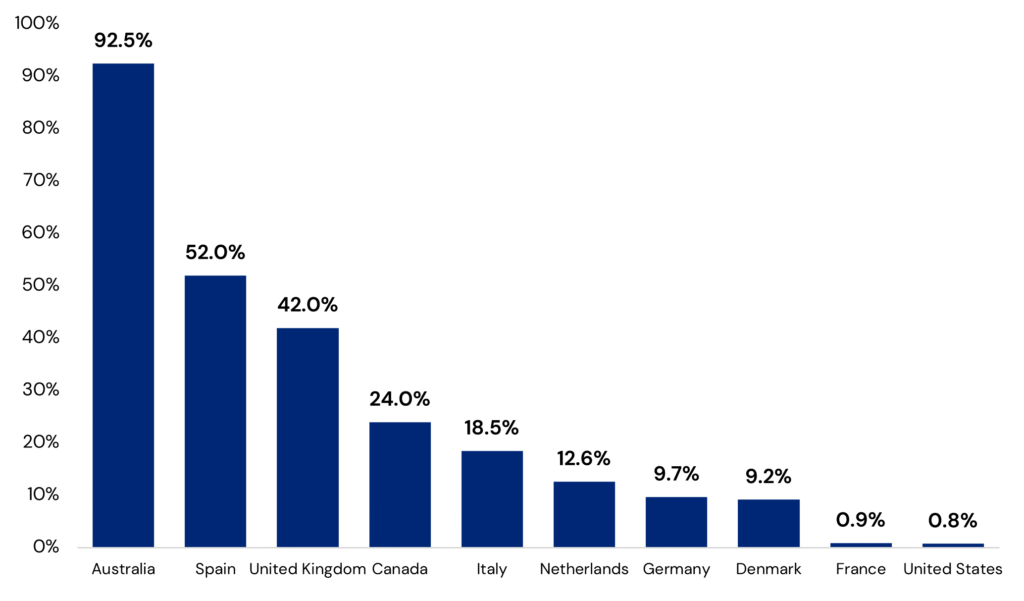

Fitch extended their analysis to combine and layer in pre-reset mortgage debt-service-to-income (“DTI”) ratios by country. This allowed them to estimate how much an increase in DTIs would be caused by a five-percentage point increase in interest rates. They found that the impact roughly followed the rank ordering above, with Australia and the UK most exposed, and the US least exposed. It should be noted that many of the same mitigating factors that apply to Canada (e.g., strong immigration, shortages of housing, low mortgage arrears) also apply to Australia, Spain and the UK.
The outlier case of the US is not quite as positive as it may appear. As a country with high internal mobility and (unlike many other markets) mortgages that are not “portable” between different collateral, the effective exposure of US households to mortgage rate changes is probably higher than implied by these data alone. Moreover, there are some downsides to having a large share of long, fixed rate mortgages. For one, the lesser impact of higher rates on consumer spending potentially requires more interest rates increases to have the same desired impact on inflation. Another factor, which is already evident, is that having a low interest rate locked in creates a barrier to moving, limiting the supply of housing for sale and making home prices sticky.
Sources:
1. ECONOSIGHTS: Three reasons why Australia is more vulnerable to higher rates – Mousina, Diana, AMP Capital, September 2022.
2. Fear of Renewal: Most new homebuyers ‘very worried’ next term will bring much higher monthly payments – Angus Reid Institute, May 2023
3. How Do Mortgage Rate Resets Affect Consumer Spending and Debt Repayment? Evidence from Canadian Consumers – Bank of Canada, May 2020
4. Statistics on Mortgage Arrears in Canada – Canadian Bankers Association, Table DB50 Public, June 2023
5. Global Housing and Mortgage Outlook – 2023 – Fitch Ratings, December 2022
6. Mortgage Interest Payments in Advanced Economies – One Channel of Monetary Policy – Reserve Bank of Australia, Statement on Monetary Policy, February 2023
Important Notice and Disclaimer
This publication does not constitute an offer to sell, or the solicitation of an offer to buy, any securities or any interests in any investment products advised by, or the advisory services of, LaSalle Investment Management (together with its global investment advisory affiliates, “LaSalle”). This publication has been prepared without regard to the specific investment objectives, financial situation or particular needs of recipients and under no circumstances is this publication on its own intended to be, or serve as, investment advice. The discussions set forth in this publication are intended for informational purposes only, do not constitute investment advice and are subject to correction, completion and amendment without notice. Further, nothing herein constitutes legal or tax advice. Prior to making any investment, an investor should consult with its own investment, accounting, legal and tax advisers to independently evaluate the risks, consequences and suitability of that investment.
LaSalle has taken reasonable care to ensure that the information contained in this publication is accurate and has been obtained from reliable sources. Any opinions, forecasts, projections or other statements that are made in this publication are forward-looking statements. Although LaSalle believes that the expectations reflected in such forward-looking statements are reasonable, they do involve a number of assumptions, risks and uncertainties. Accordingly, LaSalle does not make any express or implied representation or warranty, and no responsibility is accepted with respect to the adequacy, accuracy, completeness or reasonableness of the facts, opinions, estimates, forecasts, or other information set out in this publication or any further information, written or oral notice, or other document at any time supplied in connection with this publication. LaSalle does not undertake and is under no obligation to update or keep current the information or content contained in this publication for future events. LaSalle does not accept any liability in negligence or otherwise for any loss or damage suffered by any party resulting from reliance on this publication and nothing contained herein shall be relied upon as a promise or guarantee regarding any future events or performance.
By accepting receipt of this publication, the recipient agrees not to distribute, offer or sell this publication or copies of it and agrees not to make use of the publication other than for its own general information purposes.
Copyright © LaSalle Investment Management 2023. All rights reserved. No part of this document may be reproduced by any means, whether graphically, electronically, mechanically or otherwise howsoever, including without limitation photocopying and recording on magnetic tape, or included in any information store and/or retrieval system without prior written permission of LaSalle Investment Management.


London (5 July 2023) – LaSalle’s European COO Beverley Kilbride has been named to PEI’s 2023 list of Women of Influence in Private Markets. The list spotlights women whose achievements, innovation and leadership are reshaping private markets across a range of asset classes: real estate, private debt, private equity, infrastructure and venture capital.
The teams at PERE, Private Debt Investor, Private Equity International, Infrastructure Investor, and Venture Capital Journal faced a daunting task in selecting the honorees. With over 630 nominations, only 10 professionals globally are recognized in each category.
Read more about the impact Beverley has had on the real estate market, as well as the other nine professionals who join her on this esteemed list on PERE’s website (subscription required).
About LaSalle Investment Management | Investing Today. For Tomorrow.
LaSalle Investment Management is one of the world’s leading real estate investment managers. On a global basis, LaSalle manages approximately $79 billion of assets in private and public real estate property and debt investments as of Q3 2022. LaSalle’s diverse client base includes public and private pension funds, insurance companies, governments, corporations, endowments and private individuals from across the globe. LaSalle sponsors a complete range of investment vehicles, including separate accounts, open- and closed-end funds, public securities and entity-level investments. For more information, please visit www.lasalle.com, and LinkedIn.























































































CHICAGO, June 29, 2023 — LaSalle Investment Management (“LaSalle”) has completed a joint venture with UDR, Inc. (NYSE: UDR) to create a portfolio of core multifamily assets in key markets across the US. Under the terms of the agreement, UDR will contribute a seed portfolio of four assets into the joint venture and retain a 51 percent ownership position in the aggregate portfolio, while also acting as asset manager.
The investment presents LaSalle a unique opportunity to partner with a best-in-class operator in a preferred sector with immediate and diversified scale in multifamily markets that are ranked highly by LaSalle’s global Research and Strategy group. The partnership capitalizes on the secular shift to product in high-barrier-to-entry markets in addition to attractive rent price points, strong operating history, and long-term expected NOI growth.
Mark Gabbay, Global CEO of LaSalle, said: “We are pleased to have sourced a high-quality investment for our limited partner, alongside a best-in-class sponsor and operator in UDR. The US multifamily market has remained one of the top-performing and most resilient asset classes in recent years, and we look forward to expanding this portfolio with UDR in the years ahead.”
About LaSalle Investment Management | Investing Today. For Tomorrow.
LaSalle Investment Management is one of the world’s leading real estate investment managers. On a global basis, LaSalle manages over $78 billion of assets in private and public real estate property and debt investments as of Q1 2023. LaSalle’s diverse client base includes public and private pension funds, insurance companies, governments, corporations, endowments and private individuals from across the globe. LaSalle sponsors a complete range of investment vehicles including separate accounts, open- and closed-end funds, public securities and entity-level investments. For more information please visit www.lasalle.com and LinkedIn.
About UDR, Inc.
UDR, Inc. (NYSE: UDR), an S&P 500 company, is a leading multifamily real estate investment trust with a demonstrated performance history of delivering superior and dependable returns by successfully managing, buying, selling, developing and redeveloping attractive real estate communities in targeted U.S. markets. As of March 31, 2023, UDR owned or had an ownership position in 58,411 apartment homes including 415 homes under development. For over 51 years, UDR has delivered long-term value to shareholders, the best standard of service to residents and the highest quality experience for associates.
NOTE: This information discussed above is based on the market analysis and expectations of LaSalle and should not be relied upon by the reader as research or investment advice regarding LaSalle funds or any issuer or security in particular. The information presented herein is for illustrative and educational purposes and is not a recommendation, offer or solicitation to buy or sell any securities or to adopt any investment strategy in any jurisdiction where prohibited by law or where contrary to local law or regulation. Any such offer to invest, if made, will only be made to certain qualified investors by means of a private placement memorandum or applicable offering document and in accordance with applicable laws and regulations. Past performance is not indicative of future results, nor should any statements herein be construed as a prediction or guarantee of future results.























































































SEOUL (June 7, 2023) — LaSalle Investment Management (“LaSalle”), on behalf of its Korea logistics investment joint venture with a Middle Eastern sovereign wealth fund, announced today the acquisition of two logistics facilities in Bubal District, Icheon, South Korea. The two warehouses, built between 2021 and 2022, have a combined gross floor area (GFA) of 16,346 pyung. They have an existing occupancy rate of approximately 65% and are anchor tenanted by one of the largest third-party logistics (3PL) companies in South Korea under a long-term lease.
The warehouses are strategically located in the Icheon sub-market within Greater Seoul to offer occupiers with access and connectivity to South Korea’s dense and online connected consumers. An established industrial sub-market in South Korea, the southeast area where Icheon is located has the largest Grade-A logistics stock in Greater Seoul.
This transaction follows an opportunistic high-yield loan that LaSalle, on behalf of the LaSalle Asia Opportunity Fund VI (LAO VI) closed earlier this year. The collateralized loan financed the acquisition of a land site valued at KRW116.0 billion which obtained entitlements to develop a 10-storey office building with GFA of 6,480 pyung in the Seongsu district of Seoul. The project is expected to break-ground this year. The borrower has an established track-record of developing, leasing, and selling similar investments and this will be their 4th office project specifically in the Seongsu district.
The Seoul office market has demonstrated relative strong fundamentals to date as a departure from prevailing trends in other metropolitan cities globally which are pivoting towards some form of work-from-home. According to JLL Korea, the average office vacancy rate across Seoul was 1.1% as of Q1 2023.
Steve Hyung Kim, Senior Managing Director and Head of Korea for LaSalle, commented: “We are finding attractive risk-adjusted entry points into deals whether investing through equity or through debt, while still targeting the property sectors and locations we maintain conviction on. Widened credit spreads have allowed us to execute high-yield secured debt financings on behalf of our opportunistic strategy; and in the logistics sector near to mid-term with the new supply headwinds, we will also selectively invest in recapitalization situations as the market de-levers from vintage loans maturing against unstabilized projects.”


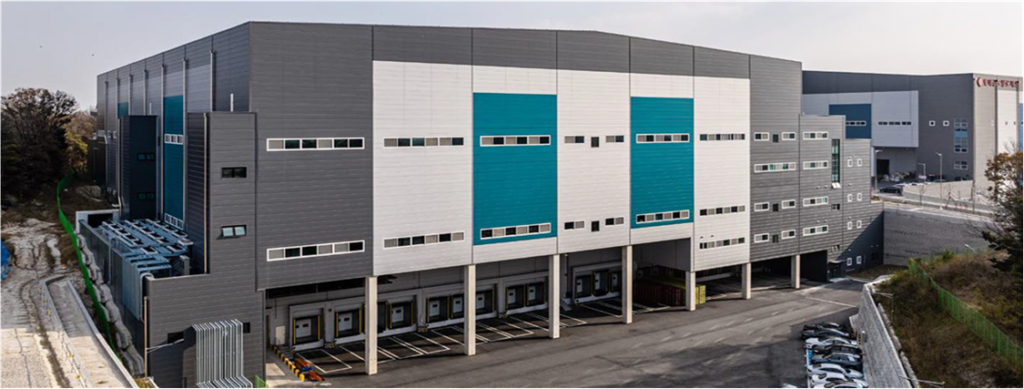



About LaSalle Investment Management | Investing Today. For Tomorrow.
LaSalle Investment Management is one of the world’s leading real estate investment managers. On a global basis, LaSalle manages over $79 billion of assets in private and public real estate property and debt investments as of Q4 2022. LaSalle’s diverse client base includes public and private pension funds, insurance companies, governments, corporations, endowments and private individuals from across the globe. LaSalle sponsors a complete range of investment vehicles including separate accounts, open- and closed-end funds, public securities and entity-level investments. For more information please visit www.lasalle.com and LinkedIn.
NOTE: This information discussed above is based on the market analysis and expectations of LaSalle and should not be relied upon by the reader as research or investment advice regarding LaSalle funds or any issuer or security in particular. The information presented herein is for illustrative and educational purposes and is not a recommendation, offer or solicitation to buy or sell any securities or to adopt any investment strategy in any jurisdiction where prohibited by law or where contrary to local law or regulation. Any such offer to invest, if made, will only be made to certain qualified investors by means of a private placement memorandum or applicable offering document and in accordance with applicable laws and regulations. Past performance is not indicative of future results, nor should any statements herein be construed as a prediction or guarantee of future results.























































































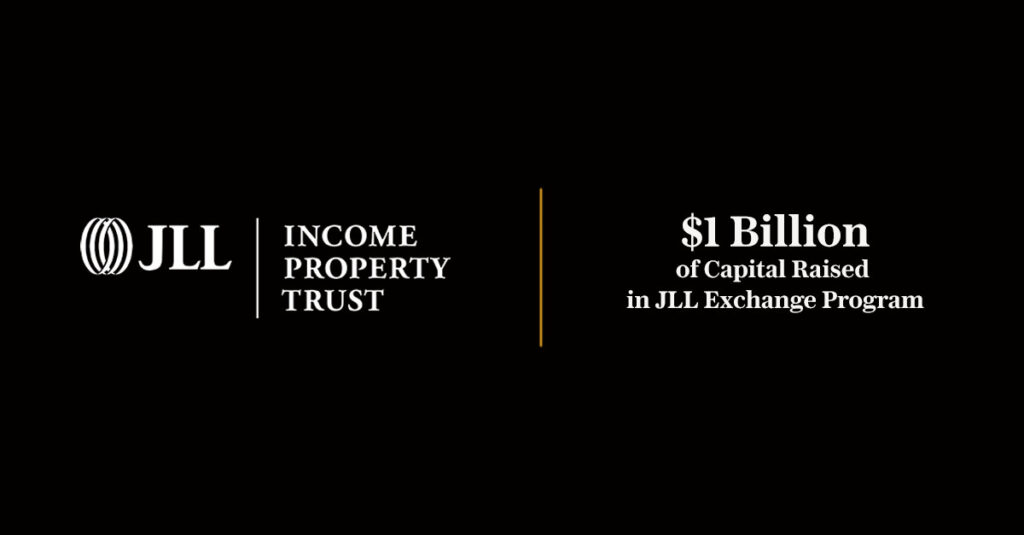

Chicago (June 6, 2023) – JLL Income Property Trust, an institutionally managed daily NAV REIT (NASDAQ: ZIPTAX; ZIPTMX; ZIPIAX; ZIPIMX) with more than $7 billion in portfolio assets, today announced it has attracted more than $1 billion through JLL Exchange (“JLLX”), its 1031 like kind real estate exchange program..
The JLLX platform is a sophisticated tax deferral and estate planning tool that utilizes both a traditional 1031 exchange along with a potential 721 UPREIT exchange. The JLLX program provides institutional quality properties through its unique Delaware Statutory Trust (“DST”) structure, where owners of appreciated investment real estate can conduct a 1031 exchange by reinvesting proceeds from the sale of their real estate to acquire interests in the DST. After a required holding period, DST properties may be reacquired in exchange for interests in JLL Income Property Trust’s UPREIT structure through a 721 exchange.
JLL Exchange provides investors the opportunity to reinvest proceeds from their sale of real estate held for investment into a broadly diversified, institutionally managed, perpetual NAV REIT, while also deferring taxes, maintaining their allocation to real estate and enjoying a wide range of estate planning benefits. JLL Income Property Trust benefits by attracting strategically aligned long-term investors through the 1031 exchange market.
Since its inception in 2020, JLLX has provided investors with more than $1 billion of DST interests through 18 distinct 1031 exchange offerings ranging from single property DSTs to diversified, multi-property portfolios. JLL Income Property Trust has also completed 6 full-cycle 721 UPREIT transactions totaling nearly $470 million. In a full-cycle UPREIT, real estate is exchanged on a tax-deferred basis for partnership interests in JLL Income Property Trust, offering the potential for owners of the exchanged property to achieve meaningful diversification, current income and the opportunity to realize long-term appreciation.
“We are extremely pleased by the market’s strong, sustained response to the JLLX platform,” said Allan Swaringen, President and CEO of JLL Income Property Trust. “Financial advisors have recognized the compelling potential tax and estate planning benefits from the JLLX offerings, and view it as a way to provide more holistic financial planning for their high net worth property owner clients.”
“By offering higher-quality, institutional, DST solutions, competitive fees and institutional management, JLLX has established itself as a preferred 1031 exchange solution for high net worth and ultra-high net worth investors,” said Drew Dornbusch, Head of JLL Exchange.
For more information on JLL Income Property Trust, please visit our website at www.jllipt.com.
About JLL Exchange
The JLL Exchange program offers private placements through the sale of interests in Delaware Statutory Trusts (DSTs) holding real properties. For more information, visit www.jllexchange.com.
About JLL Income Property Trust, Inc. ((NASDAQ: ZIPTAX; ZIPTMX; ZIPIAX; ZIPIMX)
JLL Income Property Trust, Inc. is a daily NAV REIT that owns and manages a diversified portfolio of high quality, income-producing residential, industrial, grocery-anchored retail, healthcare and office properties located in the United States. JLL Income Property Trust expects to further diversify its real estate portfolio over time, including on a global basis. For more information, visit www.jllipt.com.
About LaSalle Investment Management
LaSalle Investment Management is one of the world’s leading real estate investment managers. On a global basis, LaSalle manages approximately $78 billion of assets in private and public real estate property and debt investments as of Q1 2023. LaSalle’s diverse client base includes public and private pension funds, insurance companies, governments, corporations, endowments and private individuals from across the globe. LaSalle sponsors a complete range of investment vehicles including separate accounts, open- and closed-end funds, public securities and entity-level investments. For more information, please visit https://www.lasalle.com.
Valuations, Forward Looking Statements and Future Results
This press release may contain forward-looking statements with respect to JLL Income Property Trust. Forward-looking statements are statements that are not descriptions of historical facts and include statements regarding management’s intentions, beliefs, expectations, research, market analysis, plans or predictions of the future. Because such statements include risks, uncertainties and contingencies, actual results may differ materially from those expressed or implied by such forward-looking statements. Past performance is not indicative of future results and there can be no assurance that future dividends will be paid.

























































































Andrew Jeanes, who worked for LaSalle for almost 38 years, sadly passed away in October 2021.
For those people within the industry who came across Andy, none would have forgotten their experience in a hurry. He didn’t suffer fools lightly, and could often be perceived as donning a bear mask. It truly was just a mask, behind which was a man with a huge heart. He held in high esteem individuals at the cutting edge of their expertise within the property industry and those who provided sound advice to Andy and his clients.
LaSalle is hosting a walk through London on Thursday, July 13 from 2:00 p.m. and would welcome any of Andy’s friends or ex-colleagues to join us. In his memory, we aim to raise money for the Oxford Hospitals Charity, specifically the Oncology Ward Fund, as chosen by his children.
Given Andy liked to discuss thorny property issues over a glass of red wine, it’s only fitting that the walk should include a couple of his old haunts. We start from Davy’s at Plantation Place in The City and finish at Davy’s at St James, Crown Passage, Pall Mall. Frankly that’s the only type of walk Andy would have signed up to!
If you would like to take part in the walk, please register below. A suggested minimum donation of £20 upon registration can be made via our JustGiving page.























































































Through history, residential rent controls have tended to appear at times of external shock and dislocation.1 COVID-19 and the subsequent inflationary spike have proven to be such a catalyst. Changes to rent regulations can potentially reshape the risk-reward profile of residential investments, impacting values over both short and long timescales. As we set out in a previous piece, A New Wave of Residential Rent Control, the introduction of rent control measures can also have unintended consequences that distort the market. While often sold as a solution to spiralling housing costs, in practice they can have the opposite effect to their intent, deterring the construction of new rental housing, thus leading to further increases in rents.
Our findings in that report still hold true, but an update is needed because the “great reflation” period has seen a groundswell of support for further rent regulations, especially in Europe. The pandemic opened the door to unprecedented government intervention, and there has been a heightened willingness among politicians to introduce forms of rent control. But there continues to be vast differences across countries, regions and cities, reflecting varying political appetites for intervention. What is the impact of these recently enacted measures and which markets have been most impacted?
Rent regulation starting positions vary widely
Regulations take many different guises including broad brush limits on initial rent levels (e.g., in France, Ireland), market-wide caps to annual rental increases (Germany, Sweden) or caps limited to buildings of a certain age or in certain areas deemed to be stretched (Denmark, Catalonia, New York City, California). Beyond rent-setting, lease length, security of tenancy and eviction protections are additional factors to consider. Crucially, regulation should be viewed on a spectrum rather than as a binary determination.
In “unregulated” rental markets, such as England, most of the US and select European countries (e.g., Finland, Poland and Czechia), rents can typically be freely set at the outset of a tenancy, with the landlord permitted to increase them at the end of the agreement (typically 12 months) by any amount. This allows landlords in these markets to mark rents to market levels quickly. Even in markets that are usually considered to be unregulated, other legal limitations should also be considered; for example, the UK parliament is currently considering a law which would end no-fault evictions in England and Wales.
Elsewhere in Europe, in parts of Canada, and in several US states like California, Oregon and New York, the most typical form of rent control is limiting annual rent escalations for existing tenants. The devil is in the detail of these specific regulations. California, Oregon and New York City’s regulations, for example, apply to a subset of older assets; in Toronto (and all of Ontario) they apply to all but the newest. In the case of Oregon, a limit of 7% increase plus CPI is not much of a limitation on investment economics,2 while in New York City, rent increases are set by a regulatory body and can have a significant impact.
Europe’s generally more constraining rent increase caps mean that in-place rents are normally significantly below open-market rents for new leases. Limiting annual rent increases for in-place tenants prevents rents from being marked to market, usually resulting in tenants being “stickier”, staying in their homes in the knowledge that the rents they are paying are below what they would pay under a new lease. This has the effect of higher occupancy levels and lower expenses on unit turnover and voids. Catch-up between in-place and market rents occurs gradually, even during periods of weakness in market rents.
As a result of these factors, heavily regulated markets tend to experience stable in-place cash flow growth, without the cyclicality of less restrictive markets. This is highlighted on the below chart, which shows that residential rental growth in the UK has been far more volatile than regulated European markets. Given steady, non-cyclical growth, regulated residential in Europe has been able to deliver a higher level of long-run growth than most of the commercial sectors. These attributes of stability and low-but-dependable growth can be appealing to core investors, especially in lower inflation environments.
Rental growth and volatility
[Average per annum since 2000* and standard deviation]
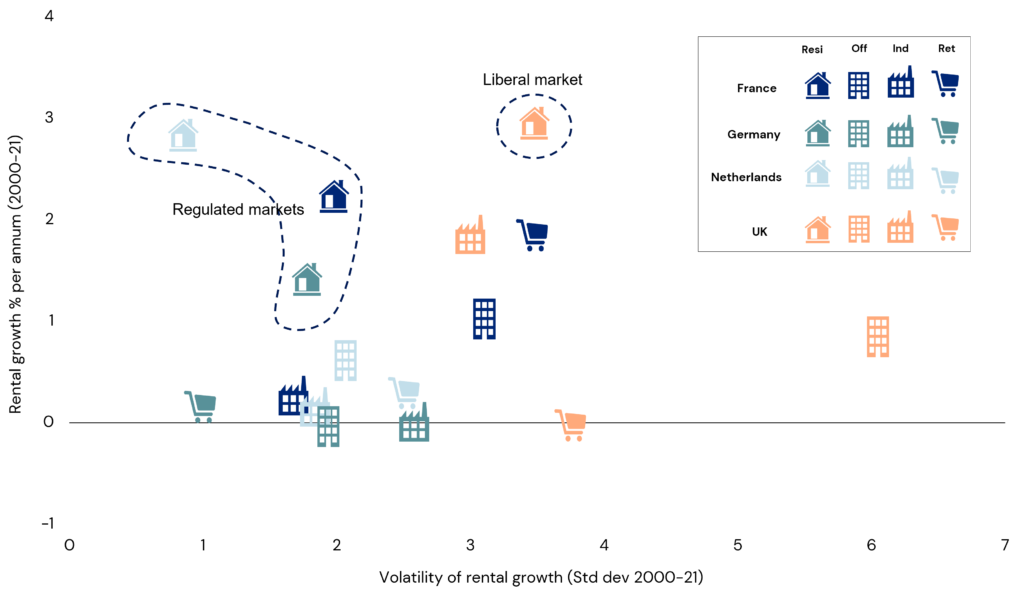

Source: LaSalle (May 2023), MSCI (December 2021)
Variety of cash flows can be a positive – but beware regulatory surprises
If regulations are known and stable, they can be priced in, limiting the risks to informed investors. A bigger concern comes from new, unforeseen regulations during the ownership of an asset. So-called “stroke-of-the-pen” risks may cause underwritten rent levels and growth to suddenly change. This remains a persistent threat as long as some policymakers are willing to support new rent controls. The factors which have made residential such a compelling sector in recent years, namely the undersupply of housing and tailwinds supporting demand, have exacerbated the threat, as rents in many major markets have increased as a share of average household income. The bout of high inflation seen in 2022-23 has put even more pressure on household finances and motivated politicians to act. The result has been new regulations brought in across Europe and North America, although some are some supposedly temporary.
Another wave of new regulation—Europe
Since beginning of 2022, several European markets have introduced new rental regulations, including in Scotland, France, Spain, Denmark and the Netherlands (see map). In other markets, such as Germany, new regulations are now being discussed.
The impact of these is just beginning to play out, but they are having meaningful effects already, with significant variation by market and asset profile. During this period of high inflation, these caps have created a double hit for some residential owners, limiting rental growth at the same time as operating expenses rose quickly.
Rental regulations introduced over 2022-2023
[Lighter colored markets considered unregulated]
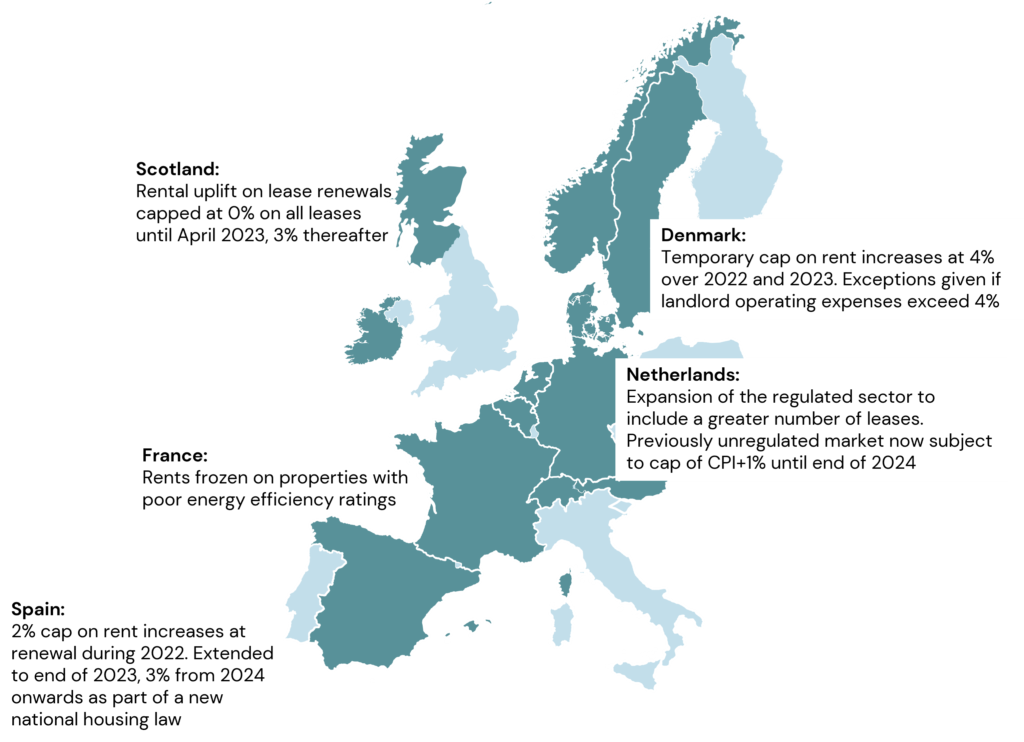

Source: LaSalle (May 2023)
In some markets, recent regulatory changes are less disruptive. For example, the cap to indexation at 4% in Denmark may result in below-inflation rental growth for one or two years. Should inflation revert to historic levels as anticipated, this is unlikely to meaningfully damage performance on assets held over the long term, but potentially mean negative real cashflow growth for landlords in the near term. This is because inflation exceeded the cap in 2022 and will expect it will likely do so again in 2023. Residential assets in regulated markets have only been able to deliver inflationary in-place rent growth when inflation is at “normal” levels. This is because regulators in Denmark and elsewhere have tended to prevent double-digit nominal increases even when justified by inflation.
The Scottish government’s decision to ban rent increases completely in September 2022 was potentially more disruptive. Some developers and investors indicated that construction of badly needed new for-rent supply was not viable in such an environment. Being unable to underwrite rental growth would likely discourage private investment in Scotland’s housing market, exacerbating the housing shortages which necessitated the rent controls in the first place. The Scottish government backtracked in April 2023, replacing the freeze with a still tight 3% cap.
Once regulations are introduced they are often very difficult to unwind, as few politicians will publicly campaign to reverse policies which will result in their voters paying more in rent. Evidence of this can already be seen in Spain, which introduced supposedly temporary caps to rent increases that have been extended beyond their original end dates and has further tightened regulations with the introduction of a wide-ranging national housing law.
Less constraining changes in the US
In parts of the US, rent control gained traction in the late 2010s, reversing a two-decade trend toward less regulation. But most cases, new measures have been relatively mild. In 2019, Oregon and California enacted statewide caps on annual rent increases for existing tenants, but limited the restrictions to older properties and set the level of the caps high.3 A notable example of a more severe new rent ordinance comes from St. Paul, Minnesota. Voters there approved an ordinance in 2021 that limited rental increases to 3% across all buildings and for renewals and new leases alike. Developers responded by halting construction projects in the city, with residential permits falling by 30%. Less than a year later, the St. Paul city council revised the ordinance to more closely resemble the legislation in California and Oregon.4
Despite the advances of rent control legislation in a small number of states and cities in recent years, many more jurisdictions have rejected it. In 2022 alone, new rent regulations were introduced by state legislators in 19 states and did not receive enough support to pass. Most recently, in April 2023, Florida passed an outright ban on rent control in that state while at the same time allocating new funding for the development of affordable housing.
Living with increased regulation
Despite the risks of regulatory change, regulated residential assets can potentially offer investors a favourable return given low risks, particularly when compared to the more challenged office sector. That said, the devil is in the details, given widely varying regulatory frameworks across cities, states and countries. With changes to policies underway, managing the risks of greater regulation is now more important than ever for investors. To do so, we recommend an approach that encompasses vigilance, diversification and identification of less-regulated proxies for residential—we detail each of these strategies below.
The state of the market year-to-date: Capital markets digest repricing, as tenant demand stays resilient and energy markets deliver a positive surprise.
Our latest LaSalle European Market View shows how Europe’s economies and real estate markets are being impacted by, and adapting to, the current period of unusual uncertainty.
This update highlights recently released data on how Europe’s energy market has coped with shutoffs and surging prices in the winter following Russia’s invasion of Ukraine. It did so through a combination of reduced consumption (p. 6), more electricity generation from renewables (p. 7), and shifting to imports from new sources (p. 8). In Q1, the EU’s natural gas consumption was tracking 18% below average. This owes some thanks to mild winter temperatures, but also to conscious conservation efforts.
Natural gas consumption in Europe (EU27)
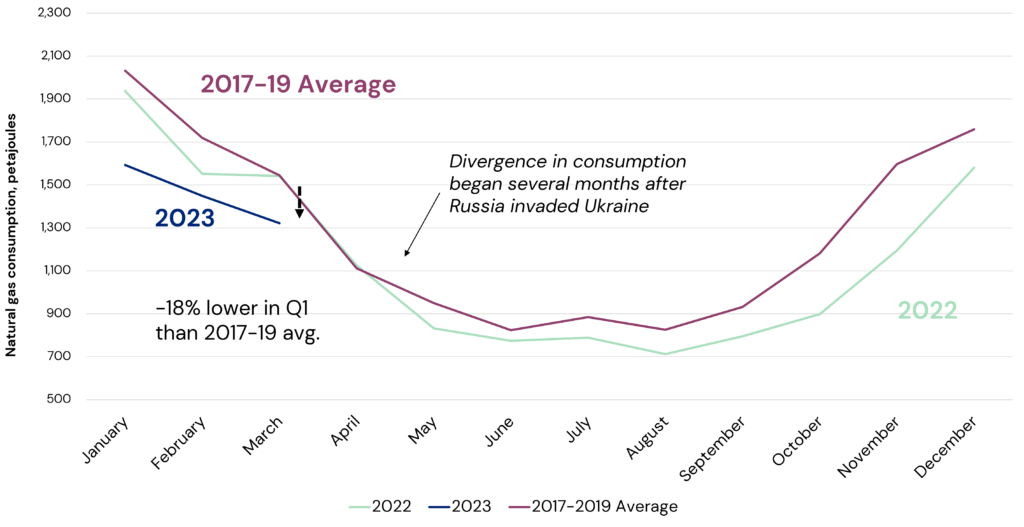

Source: LaSalle analysis of Eurostat data to March 2023. Note that the UK is excluded from all time series data above.
Falling energy prices have led to recent steep headline inflation declines (p. 11) and kept Europe’s largest economies from entering recession to date (p. 9). Yet core inflation – excluding volatile food and energy – is higher today than in 2022 – and GDP growth is at stall speed. European banks have weathered the aftershocks of SVB’s failure and the Swiss National Bank’s forced resolution of Credit Suisse. However, some pullback in bank risk appetite is evident in debt markets (see p. 29 and our April ISA Briefing).
Even as the ECB and Bank of England’s rate hikes have continued, long-term swap rates today are similar to where they started the year (p. 28). This has given private real estate and yields some time to digest the new repricing math. The UK’s repricing stands out for its speed, with monthly UK index data swinging to a positive return in March after eight months of deep negative returns (p. 34).
European real estate transaction volume declined to an 11-year low in Q1. This is a lagging rather than concurrent indicator, however, and reflects the high uncertainty and bid-ask spreads that existed near the end of 2022. At the same time, the most recent Q1 data on occupier trends shows hardy demand fundamentals, albeit with some cooling. In Q1, prime logistics rents continued to grow at a double-digit annualized pace and UK residential sector kept pace with high inflation across many markets, even as office rents cooled and retail rents were flat. As we look ahead, we believe the relationship between current vacancy and its historic levels (p. 18, 20, 21) points to the European property types and markets where rent momentum is most likely to continue.
Quarter-over-quarter rental growth in Europe
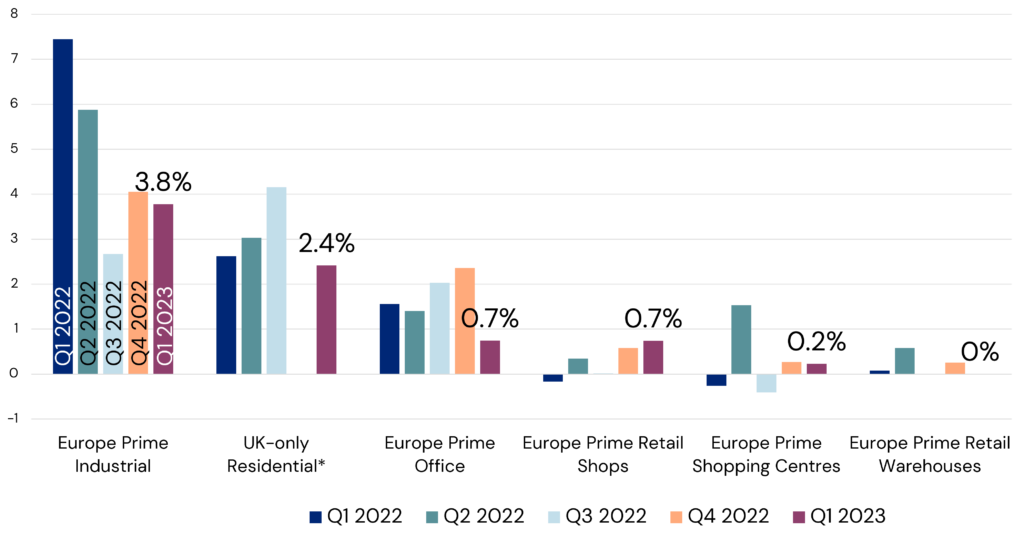

*Average rent and Q1 2023 residential data currently unavailable. UK residential rent data is based on new listings (rather than in-place rents).
Source: JLL, HomeLet data to Q1 2023. Latest as of May 2023.


London (10 May 2023) – LaSalle Investment Management (“LaSalle”), the global real estate investment manager, today announces the provision of a fixed-rate green loan facility of £130m to finance Greystar’s acquisition and development of a 770-bed student housing asset in Wembley Park, London.
The loan was provided through LaSalle Debt Investments – one of Europe’s leading alternative real estate lending platforms, established in 2010.
The project is situated within the highly sought-after Wembley regeneration area, an established neighbourhood benefiting from diverse local amenities and facilities. The project benefits from excellent transportation links and is a five-minute walk to Wembley Park station, providing easy access to Central London. It is also well connected to a range of London’s leading universities, such as King’s College London and the London School of Economics.
The green loan will partially fund the construction of the 770-bed asset which is scheduled to complete in the summer of 2025. The development will comprise 20 storeys with 12,000 sq ft of amenities, including a co-working space, external courtyards and gardens, a gym and bike storage. The development has been designed with state-of-the-art sustainability credentials in mind, aiming to achieve a BREEAM rating of “Excellent” and targeting a ‘Two Star’ Fitwell accreditation.
LaSalle Debt Investments credit strategies include senior loans, whole loans, mezzanine, and development finance. It forms part of LaSalle’s pan-European Debt & Value-Add Strategies platform, which provides debt and equity capital solutions across European markets and sectors.
Ben Mowbray, Senior Director – Investment, Greystar, said: “LaSalle’s green loan facility will help us deliver a substantial, but most importantly sustainable student accommodation asset in Wembley. We are committed to ensuring our assets provide a home away from home for students in a time of unprecedented demand without compromising the environment.”
Robert Fay, Director, Debt Investments, LaSalle, said: “We look forward to helping Greystar deliver a best-in-class student product with strong sustainability credentials. This loan represents LaSalle’s fourteenth loan facility secured against student accommodation, a sector we have strong conviction in across our wider European business.”
Fiammetta Granchi, Vice President, Debt Investments, LaSalle, added: “This facility with Greystar is fixed rate and does not require syndication, providing enhanced stability to the borrower. The loan was structured as a green loan, compliant with the Loan Market Association’s green loan framework and Green Loan Principles. As the drive towards superior environmental performance accelerates, we are committed to supporting our borrowers to deliver high-quality, sustainable accommodation.”
About LaSalle Investment Management | Investing Today. For Tomorrow.
LaSalle Investment Management is one of the world’s leading real estate investment managers. On a global basis, LaSalle manages approximately $79 billion of assets in private and public real estate property and debt investments as of Q3 2022. LaSalle’s diverse client base includes public and private pension funds, insurance companies, governments, corporations, endowments and private individuals from across the globe. LaSalle sponsors a complete range of investment vehicles, including separate accounts, open- and closed-end funds, public securities and entity-level investments. For more information, please visit www.lasalle.com, and LinkedIn.
About LaSalle Debt Investments
LaSalle Debt Investments is part of LaSalle’s growing $10bn Debt & Value-Add Strategies platform in Europe and invests in a diverse range of real estate credit products – spanning senior loans, whole loans, mezzanine, development finance, corporate finance, NAV facilities and preferred equity – with significant experience across various sectors, geographies, deal sizes and capital structures. Since launching the business line in 2010, LaSalle has been one of Europe’s most active alternative real estate debt providers with a long track record of lending to best-in-class sponsors.
About Greystar
Greystar is a leading, fully integrated global real estate company offering expertise in property management, investment management, development, and construction services in institutional-quality rental housing, logistics, and life sciences sectors. Headquartered in Charleston, South Carolina, Greystar manages and operates more than $250 billion of real estate in 234 markets globally with offices throughout North America, Europe, South America, and the Asia-Pacific region. Greystar is the largest operator of apartments in the United States, manages more than 817,000 units/beds globally, and has a robust institutional investment management platform comprised of more than $69 billion of assets under management, including over $29 billion of development assets. Greystar was founded by Bob Faith in 1993 to become a provider of world-class service in the rental residential real estate business. To learn more, visit www.greystar.com.
NOTE: This information discussed above is based on the market analysis and expectations of LaSalle and should not be relied upon by the reader as research or investment advice regarding LaSalle funds or any issuer or security in particular. The information presented herein is for illustrative and educational purposes and is not a recommendation, offer or solicitation to buy or sell any securities or to adopt any investment strategy in any jurisdiction where prohibited by law or where contrary to local law or regulation. Any such offer to invest, if made, will only be made to certain qualified investors by means of a private placement memorandum or applicable offering document and in accordance with applicable laws and regulations. Past performance is not indicative of future results, nor should any statements herein be construed as a prediction or guarantee of future results.























































































Brian Klinksiek’s article appears in Issue 12 of Summit, the official publication of AFIRE, the association for international real estate investors focused on commercial property in the United States.
Even as the US has exported trends that have transformed global property markets, several key trends originating in Europe are likely to shape property in the US and globally in the years ahead.
The opportunity to take ideas and best practices from one part of the world and implement them in another is, alongside diversification benefits, one of the great advantages of investing real estate capital across borders. Cyclical and secular themes tend to go global, albeit with leads and lags. Having a global perspective can give an investor an early-mover advantage over other players.
Historically, a common (but not exclusive) pattern has been for concepts to debut in US before emerging elsewhere. This was mirrored in my own career trajectory, which was shaped by the export of American business models. I moved from Chicago to London in 2009, and later to Hong Kong, to help my colleagues implement strategies in sectors that were established in the US but had been nascent elsewhere, such as multifamily apartments and self-storage. LaSalle has long tracked these differences in sector institutionalization and maturity on its “Going Mainstream” framework.


Chicago (April 25, 2023) – JLL Income Property Trust, an institutionally managed daily NAV REIT (NASDAQ: ZIPTAX; ZIPTMX; ZIPIAX; ZIPIMX) with approximately $7 billion in portfolio assets, announced today the acquisition of Louisville Logistics Center, a one-million-square-foot, newly constructed Class A industrial property strategically located in the top-tier industrial submarket of South Louisville, Kentucky. The purchase price was approximately $82 million.
Louisville Logistics Center is leased through 2032 to a nationally recognized, global transportation and logistics company with more than $100 billion in annual revenues and with an S&P “A” credit rating. The lease contains 2% annual rent escalations, along with two 10-year renewal options.
Constructed in 2022, the Louisville Logistics Center is a state-of-the-art, cross dock distribution center featuring 40-foot clear heights. The tenant has invested significant capital into equipment and technology specifically customized for their operations in the property. Louisville is also home to major air and ground distribution hubs for UPS. UPS’s investment and success in the market has made Louisville one of the more desirable and proven logistics locations in the central United States.
“Louisville’s central geographic location, irreplaceable transportation infrastructure, and strong interstate highway access make it a desirable and strategic location for both regional and national logistics,” said Allan Swaringen, President and CEO of JLL Income Property Trust. “The property’s new construction, significant improvements by the tenant, and a 10-year lease to an investment-grade Fortune 100 company, make this an attractive addition to our carefully constructed warehouse portfolio. Further, pricing on this quality of property is nearly 150 basis points improved over market pricing eighteen months ago. For investors like us with access to capital, these market conditions should present some exceptional investing opportunities.”
Louisville’s central location at the confluence of major highways allows distribution to over half the US population within a day’s drive via interstate highways I-24, I-64, I-65, I-71 and I-75, reinforcing JLL Income Property Trust’s research-led industrial strategy focused on acquiring properties with primary access to critical hubs of distribution and transportation infrastructure. The property is also within 20 miles of major distribution hubs including UPS Worldport (Air Distribution Hub), UPS Centennial Hub (Ground Distribution Hub), and the Louisville International Airport.
This investment brings JLL Income Property Trust’s aggregate industrial allocation to nearly $2.2 billion, or 32 percent of the portfolio, across 59 properties in 13 targeted warehouse markets.
For more information on JLL Income Property Trust, please visit our website at www.jllipt.com.
About JLL Income Property Trust, Inc. (NASDAQ: ZIPTAX; ZIPTMX; ZIPIAX; ZIPIMX)
JLL Income Property Trust, Inc. is a daily NAV REIT that owns and manages a diversified portfolio of high quality, income-producing residential, industrial, grocery-anchored retail, healthcare and office properties located in the United States. JLL Income Property Trust expects to further diversify its real estate portfolio over time, including on a global basis. For more information, visit www.jllipt.com.
About LaSalle Investment Management
LaSalle Investment Management is one of the world’s leading real estate investment managers. On a global basis, LaSalle manages approximately $79 billion of assets in private and public real estate property and debt investments as of Q4 2022. LaSalle’s diverse client base includes public and private pension funds, insurance companies, governments, corporations, endowments and private individuals from across the globe. LaSalle sponsors a complete range of investment vehicles including separate accounts, open- and closed-end funds, public securities and entity-level investments. For more information, please visit www.lasalle.com.
Valuations, Forward Looking Statements and Future Results
This press release may contain forward-looking statements with respect to JLL Income Property Trust. Forward-looking statements are statements that are not descriptions of historical facts and include statements regarding management’s intentions, beliefs, expectations, research, market analysis, plans or predictions of the future. Because such statements include risks, uncertainties and contingencies, actual results may differ materially from those expressed or implied by such forward-looking statements. Past performance is not indicative of future results and there can be no assurance that future dividends will be paid.























































































Tim Kessler, LaSalle’s Global Chief Operating Officer, spoke with NAREIM about why LaSalle is expanding co-investment eligibility, what it is delivering for the firm, and the pros and cons of expansion.
For LaSalle Investment Management, co-investment is key to attracting and retaining employees and to aligning employees with clients’ interests and the firm’s culture. Once limited to select senior executives, opening up co-investment participation to a 950-strong workforce located globally across 23 offices has been a complex operational undertaking.
Chicago (April 19, 2023) – LaSalle Investment Management (“LaSalle”) announced it has earned BREEAM certifications for 26 of its US properties. Seventeen industrial and 9 retail properties totaling more than 10 million square feet earned certifications, further highlighting LaSalle’s commitment to achieving sustainability goals across its portfolio.
BREEAM is a leading global sustainability assessment platform developed by BRE, a 100-year-old building science center developing science-led solutions to built environment challenges. BREEAM stands out among sustainability assessments given its uniquely holistic approach to evaluation — which goes beyond environmental factors, considering sustainable attributes such as resilience and health and well-being.
Elena Alschuler, LaSalle Head of Americas Sustainability, said: “To meet our net zero carbon goals, and ensure we’re on track to construct a portfolio that will stand the test of time and continue to be attractive to buyers and tenants, implementing sustainability best practices across a variety of assets will continue to be critical. We’re very proud to have achieved BREEAM certifications on 26 properties, and look forward to growing that number in the future.”
Added Breana Wheeler, US Director of Operations at BRE: “As the threat of climate risks poses an ever-increasing risk for the commercial real estate sector — and vice versa — we are thrilled to work with an industry leader like LaSalle to help set a standard for achieving meaningful sustainability goals. With over two dozen BREEAM-certified properties, LaSalle continues to demonstrate a strategic, portfolio-wide approach to meet the rising industry demand for improved ESG performance that aligns perfectly with BREEAM’s science-driven methodology, and we look forward to a continued partnership focused on thoughtful sustainable growth across the U.S. and beyond.”
The 26 BREEAM certifications add to LaSalle’s continued recognition by credible third-party sources, including the recent WELL Health-Safety certification of more than 190 properties in North America and Asia Pacific, and LEED certifications for several of its US and Canadian properties. To find out more about LaSalle’s sustainability efforts, read LaSalle’s recently published Sustainability in Focus.
About LaSalle Investment Management | Investing Today. For Tomorrow.
LaSalle Investment Management is one of the world’s leading real estate investment managers. On a global basis, LaSalle manages approximately $82 billion of assets in private and public real estate property and debt investments as of Q2 2022. LaSalle’s diverse client base includes public and private pension funds, insurance companies, governments, corporations, endowments and private individuals from across the globe. LaSalle sponsors a complete range of investment vehicles including separate accounts, open- and closed-end funds, public securities and entity-level investments. For more information, please visit lasalle.com,or LinkedIn.
Forward looking statement
The information discussed above is based on the market analysis and expectations of LaSalle and should not be relied upon by the reader as research or investment advice regarding LaSalle funds or any issuer or security in particular. The information presented herein is for illustrative and educational purposes and is not a recommendation, offer or solicitation to buy or sell any securities or to adopt any investment strategy in any jurisdiction where prohibited by law or where contrary to local law or regulation. Any such offer to invest, if made, will only be made to certain qualified investors by means of a private placement memorandum or applicable offering document and in accordance with applicable laws and regulations. Past performance is not indicative of future results, nor should any statements herein be construed as a prediction or guarantee of future results.























































































LONDON (11 April 2023) – LaSalle Investment Management (“LaSalle”), the global real estate investment manager, today announces that LaSalle Debt Investments, one of Europe’s largest alternative real estate lending platforms, has expanded its senior-secured debt strategies to include a dedicated sustainable lending focus. In the last year, the platform has provided over €350 million of green loans across Europe.
LaSalle Debt Investments has grown its capacity to support borrowers in retrofitting existing assets to improve their energy performance and fund the construction of the next generation of energy-efficient buildings across the UK and continental Europe.
Recent green loan activity includes a £148m senior facility to support the construction of a PBSA scheme in central London, a £115m development facility to support a multi-asset regional UK PBSA portfolio, and a €40m mezzanine facility to support the retrofit of a Berlin office asset.
LaSalle was recently recognised as ‘ESG Firm of the Year’ in the 2022 PERE Awards, acknowledging the combination of strategic hires, initiatives and deals that embed sustainability as a critical pillar of the firm’s long-term corporate strategy and overall investment philosophy.
Richard Craddock, Managing Director, leading LaSalle’s senior-secured debt strategies, said: “As the drive towards Net Zero Carbon accelerates, we continue to support our European borrowers to deliver high-quality, sustainable accommodation across sectors. Demand for loans to finance green refurbishments and the construction of energy-efficient developments will likely increase as the need to decarbonise gathers further momentum. By adding a dedicated green loan focus to our existing senior-secured strategies, LaSalle is able to provide a crucial source of capital to help reduce European real estate’s carbon footprint.”
LaSalle’s green loan structures are compliant with the Loan Market Association’s green loan framework.
LaSalle Debt Investments has over €1.5bn lending capacity in Europe across its credit strategies, which include senior loans, whole loans, mezzanine, and development finance. It forms part of LaSalle’s pan-European Debt & Value-Add Strategies division, which provides debt and equity capital solutions across European markets and sectors.
About LaSalle Investment Management | Investing Today. For Tomorrow.
LaSalle Investment Management is one of the world’s leading real estate investment managers. On a global basis, LaSalle manages approximately $79 billion of assets in private and public real estate property and debt investments as of Q3 2022. LaSalle’s diverse client base includes public and private pension funds, insurance companies, governments, corporations, endowments and private individuals from across the globe. LaSalle sponsors a complete range of investment vehicles, including separate accounts, open- and closed-end funds, public securities and entity-level investments. For more information, please visit www.lasalle.com, and LinkedIn.
NOTE: This information discussed above is based on the market analysis and expectations of LaSalle and should not be relied upon by the reader as research or investment advice regarding LaSalle funds or any issuer or security in particular. The information presented herein is for illustrative and educational purposes and is not a recommendation, offer or solicitation to buy or sell any securities or to adopt any investment strategy in any jurisdiction where prohibited by law or where contrary to local law or regulation. Any such offer to invest, if made, will only be made to certain qualified investors by means of a private placement memorandum or applicable offering document and in accordance with applicable laws and regulations. Past performance is not indicative of future results, nor should any statements herein be construed as a prediction or guarantee of future results.
About LaSalle Debt Investments
LaSalle Debt Investments is part of LaSalle’s growing $10bn Debt & Value-Add Strategies platform in Europe and invests in a diverse range of real estate credit products – spanning senior loans, whole loans, mezzanine, development finance, corporate finance, NAV facilities and preferred equity – with significant experience across various sectors, geographies, deal sizes and capital structures. Since launching the business line in 2010, LaSalle has been one of Europe’s most active alternative real estate debt providers with a long track record of lending to best-in-class sponsors.























































































CHICAGO (April 10, 2023) – LaSalle Investment Management (“LaSalle”) is proud to announce that it has received the 2022 ENERGY STAR® Partner of the Year Award – Sustained Excellence from the U.S. Environmental Protection Agency and the U.S. Department of Energy for the fifth consecutive year.
Each year, the ENERGY STAR program honors a select group of businesses and organizations that have made outstanding contributions in the transition to a clean energy economy. ENERGY STAR award winners lead their industries in the production, sale, and adoption of energy-efficient products, homes, buildings, services, and strategies. These efforts are essential to fighting the climate crisis, protecting public health, and creating a clean energy future for everyone.
Elena Alschuler, LaSalle Americas Head of Sustainability, said: “Earning the ENERGY STAR Partner of the Year award for five consecutive years is a testament to LaSalle’s commitment, at every level, to sustainability throughout our portfolio. Through a standardized approach to data, including using ENERGY STAR Portfolio Manager to assess the efficiency of our properties on an ongoing basis, we have been able to achieve significant momentum and results in our sustainability and energy saving efforts.”
EPA Administrator Michael S. Regan said: “As we accelerate historic efforts to address climate change, public-private partnerships will be essential to realizing the scale of our ambition. I applaud this year’s ENERGY STAR award winners for working with EPA to deliver a clean energy future that saves American consumers and businesses money and creates jobs.”
To celebrate the 30th Anniversary of ENERGY STAR, EPA offered special one-time recognition to all organizations who certified five or more buildings in 2022. Through this effort LaSalle achieved ENERGY STAR Certification across 37 buildings earning recognition as a Certification National Premier Member.
These achievements add to LaSalle’s strong track record of ESG best practices and distinctions. Industry organizations continue to recognize LaSalle for ESG leadership and maintaining its distinction as an employer of choice. LaSalle has received the following U.S. and global awards in the past year:
About LaSalle Investment Management | Investing today. For tomorrow.
LaSalle Investment Management is one of the world’s leading real estate investment managers. On a global basis, LaSalle manages over $79 billion of assets in private and public real estate property and debt investments as of Q4 2022. LaSalle’s diverse client base includes public and private pension funds, insurance companies, governments, corporations, endowments and private individuals from across the globe. LaSalle sponsors a complete range of investment vehicles including separate accounts, open- and closed-end funds, public securities and entity-level investments. For more information, please visit https://www.lasalle.com, and LinkedIn.
About ENERGY STAR
ENERGY STAR® is the government-backed symbol for energy efficiency, providing simple, credible, and unbiased information that consumers and businesses rely on to make well-informed decisions. Thousands of industrial, commercial, utility, state, and local organizations rely on their partnership with the U.S. Environmental Protection Agency (EPA) to deliver cost-saving energy efficiency solutions. Since 1992, ENERGY STAR and its partners helped American families and businesses avoid more than $500 billion in energy costs and achieve more than 4 billion metric tons of greenhouse gas reductions. More background information about ENERGY STAR’s impacts can be found at www.energystar.gov/impacts.
Forward looking statement
The information discussed above is based on the market analysis and expectations of LaSalle and should not be relied upon by the reader as research or investment advice regarding LaSalle funds or any issuer or security in particular. The information presented herein is for illustrative and educational purposes and is not a recommendation, offer or solicitation to buy or sell any securities or to adopt any investment strategy in any jurisdiction where prohibited by law or where contrary to local law or regulation. Any such offer to invest, if made, will only be made to certain qualified investors by means of a private placement memorandum or applicable offering document and in accordance with applicable laws and regulations. Past performance is not indicative of future results, nor should any statements herein be construed as a prediction or guarantee of future results.























































































SEOUL (April 4, 2023) — LaSalle Investment Management announced that it has been named to The Korea Economic Daily’s (KED) list of Best Asset Managers for Operational Excellence in the Real Estate Large Cap category. This was the first time LaSalle was included in the list.
KED, a top-tier business news media, conducts an annual survey of Korean limited partners (LPs), including pensions, sovereign wealth funds, mutual funds, insurance companies and major banks, to recognize the top general partners (GPs) in Korea. Firms are awarded along three criteria – Performance, Operational Excellence and Client Service – across five asset classes of private equity, private debt, real estate, infrastructure, and hedge funds.
The Operational Excellence award recognizes a GP for outstanding risk management, communication and key person employment.
Steve Hyung Kim, Head of LaSalle Korea, said: “We greatly appreciate the partnership and support of our clients and investors and are honored by this recognition.”
About LaSalle Investment Management | Investing Today. For Tomorrow.
LaSalle Investment Management is one of the world’s leading real estate investment managers. On a global basis, LaSalle manages over $79 billion of assets in private and public real estate property and debt investments as of Q4 2022. LaSalle’s diverse client base includes public and private pension funds, insurance companies, governments, corporations, endowments and private individuals from across the globe. LaSalle sponsors a complete range of investment vehicles including separate accounts, open- and closed-end funds, public securities and entity-level investments. For more information please visit www.lasalle.com, and LinkedIn.
NOTE: This information discussed above is based on the market analysis and expectations of LaSalle and should not be relied upon by the reader as research or investment advice regarding LaSalle funds or any issuer or security in particular. The information presented herein is for illustrative and educational purposes and is not a recommendation, offer or solicitation to buy or sell any securities or to adopt any investment strategy in any jurisdiction where prohibited by law or where contrary to local law or regulation. Any such offer to invest, if made, will only be made to certain qualified investors by means of a private placement memorandum or applicable offering document and in accordance with applicable laws and regulations. Past performance is not indicative of future results, nor should any statements herein be construed as a prediction or guarantee of future results.























































































Silicon Valley Bank (SVB) and Signature Bank failed. Regulators hastily arranged the sale of Credit Suisse to UBS. Concerns spread about numerous other small and major global banks including Deutsche Bank. Recent events have raised fears that the global economy is in for a credit crunch of unknown magnitude and duration. As we release our first LaSalle Macro Quarterly (LMQ), a revamp of our long-standing “macro indicators deck,” banking sector strains represent the number one macro risk we are assessing.
The proximate cause of each recent bank failure was deposit flight, a drain from the liabilities side of the bank balance sheet. This is fundamentally not a toxic assets problem of the sort that banks faced in the Global Financial Crisis (GFC). Rather, it is a liquidity issue that can be addressed by temporary emergency funding from central banks. But solvency, the greater concern for banks in the longer run is closely tied to the duration of the asset book.
When investors in interest rate-sensitive assets refer to duration, they typically mean the change in value associated with a change in risk-free rates. SVB failed, in large part, due to a perception that it had sustained severe losses on riskless (but long-duration) US Treasuries and near-riskless agency mortgage-backed securities as these assets had mechanically repriced in the higher interest rate environment.
Just as there was a mechanical element to the initiation of this crisis, there is a mechanical feedback loop that can help the crisis partially self-resolve. As worries around bank solvency, credit conditions and the real economy spread, expectations for policy rates fell, causing long-duration assets to once more increase in price, shoring up balance sheets.
As a result, there has been a 360-degree round trip in interest rate forward curves between the beginning of February and the end of March. At first, curves shifted upward due to spiking inflation data, before falling substantially as banking systems came under pressure, followed by a return to the status quo as resolution measures stabilized markets and inflation seized the attention of policymakers and investors once again. As a result of this volatility in rate expectations, the MOVE index of bond option volatility1 has reached the highest levels since the GFC.
There are many media, economic and financial industry sources to turn to for a deeper discussion of the underpinnings of the recent financial sector instability, or to track the daily news flow and the resulting volatility. Our focus is on the practical considerations for investors in property. We have identified four key recommendations for how real estate investors can assess risks and manage through volatility.
A lot of analyses have focused on idiosyncratic aspects of individual banks. For example, Silicon Valley Bank has been highlighted for its tech sector links and an unusually large share of its deposits not covered by deposit insurance. Credit Suisse had faced multiple controversies in recent years, including a recent disclosure of reporting irregularities which triggered an equity sell-off, as well as an outsized exposure to losses in cryptocurrencies.
Fundamentally, however, the current pressures impact all banks, with the weakest links facing the greatest strain. The question is: How far beyond those weakest links will the challenges spread? This will depend on how the vagaries of sentiment and fear interact with the willingness of policymakers to take action to protect the banking system. Thus far, action taken to resolve liquidity issues seems to have had the intended stabilizing effect, with banks such as Deutsche tested, but not forced to failure.
Central banks meeting at the end of March faced a dilemma between continuing their path of tightening to fight inflation, versus moderating or pausing to prioritize financial stability. In the end, the European Central Bank (ECB), Federal Reserve (‘Fed’) and the Bank of England (BoE) all opted to press ahead with rate rises2. Their decisions were helped in part by data showing an unexpected re-acceleration in inflation, and perhaps also wishing not to betray significant concern about the stability of financial systems.
Volatility in rates markets has a symmetric aspect, so both the initial fall in expectations and the return to a higher implied path for rates have contributed to the MOVE index reaching decade highs. Research suggests3 that bond volatility is less tied to meeting-by-meeting central bank decisions, which may be well-telegraphed, and more to expectations about the ‘terminal’ rate—the highest level that policy rates will reach over a cycle. As we near that peak rate, bond options are more sensitive to news at the margin than they were even to 75bp rate increases when it was well understood that the terminal rate was still far higher.
Long duration—and therefore high sensitivity to interest rates—is a characteristic not just of bonds, but any long-hold assets with uncertain cashflows, including income-producing real estate. It follows that real estate values, especially in sectors and geographies which have repriced furthest and most quickly such as UK industrial, are also more tightly linked to terminal policy rates at this point than month-to-month central bank decisions.
Bank lending is likely to become more conservative as duration risk attracts both external regulatory attention and enhanced internal risk management scrutiny. Any pullback in bank lending activity should further increase the importance of private credit across the economy, including in real estate. This could be beneficial to non-bank lenders funded by sticky capital, who can be expected to originate a greater proportion of mortgage loans. On the equity side, investors should cautiously manage their debt maturity schedule in the near term and diversify their sources of debt capital over the medium term.
The failures of SVB, Signature and Credit Suisse, and the pressures on other banks, have elicited a policy response that some banking experts consider to be sufficient to prevent severe additional damage to the economy. Certainly, rate-setters have felt sufficiently confident to press ahead with policy rate increases. But as in all cases of banking sector turbulence, there is considerable uncertainty and outcomes will depend on difficult-to-predict sentiment factors. Ultimately, the systemic nature of financial market risks makes them inherently difficult to control. As real estate managers and investors, our best approach is to understand and monitor these risks and practically diversify investments to mitigate the impact on the overall portfolio.
Footnotes: 1 [LMQ slide 3], 2 [LMQ slide 4], 3 Based on work by Natixis, a French corporate and investment bank, 4 [LMQ slide 6]
The balance of virtual and in-person interaction is close to a post-pandemic steady state. So we observed in our ISA Outlook 2023, where we called this out as one of our key global themes for the year. We pointed out that after a long period of gradual improvement in office attendance, the rate of change has substantially leveled off, with weekly office visits stabilizing below 50% in many US markets, and at somewhat higher levels in Europe and substantially higher levels in much of Asia-Pacific.
In many markets, but especially North America, work-from-home (WFH) headwinds have hit leasing demand as leases roll. An anticipated boost from permanent social distancing failed to materialize. At the same time, the cyclical outlook for job growth has weakened with the macroeconomy. These factors have contributed to deepening worries about the prospects for office values, which have made front-page news due to prominent defaults on commercial mortgages backed by office assets.
In this context, we thought it important to revisit the prospects for the office sector, addressing key questions, while highlighting differences and similarities among global markets. Where are risks greatest and where are they less? How should we think about the role of office in the portfolio? How will current trends play out in the various regions where we invest?
This is also an opportunity to look back on our predictions to assess where we got things right, and where we did not. As a part of this, we introduce a new feature in our ISA suite, “Looking Back”, in which we check on our prior predictions and forecasts.
Value investing in European real estate today is characterised by an abundance of unmeasurable uncertainty over quantifiable risk. Successfully navigating that uncertainty requires the intersection of expertise and experience.
Beyond the current turmoil however, we believe four themes will define the Europe of the near future – Europeans will be smarter, greener, older and more mobile.
Periods of dislocation, while testing for investors’ convictions, can also offer opportunity. Uncertainty can result in attractive entry pricing as markets become over-correlated. As a result, fund vintages raised during challenging markets, which are able to take advantage of this repricing, have outperformed in recent cycles.
Where short-term dislocation overlaps with our long-term convictions, we believe lasting value can be created.
TOKYO (March 8, 2023) — LaSalle Investment Management (“LaSalle”) announces today two significant appointments. Kunihiko (Nick) Okumura will succeed Keith Fujii as Chief Executive Officer of LaSalle Japan and will concurrently be appointed as Representative Director of LaSalle Japan. Meanwhile, Itaru Nogami will succeed Ryota Morioka as Fund Manager of LaSalle Japan Property Fund (LJPF), an open-ended core fund with total assets under management of more than JPY200 billion GAV (US$1.54 billion). Both appointments will be effective March 31.
Consequently, Fujii will continue to serve LaSalle as Head of Asia Pacific while Morioka will depart the firm to pursue other interests. Yasuo Nakashima has also stepped down as Representative Director of LaSalle Japan and will depart the firm on April 1.
Keith Fujii, Head of Asia Pacific for LaSalle, said, “These leadership transitions follow a succession planning process spanning several years, during which we worked to develop a robust talent pipeline. Okumura san’s and Nogami san’s appointments reflect the depth of LaSalle’s bench strength and the firm’s long-term orientation.”
Okumura joined LaSalle Japan in 2011 and served as Head of Acquisitions and Asset Management. He was additionally appointed Co-Chief Investment Officer (Co-CIO) for LaSalle Asia Pacific in 2021. With over 25 years of Japanese real estate experience, Okumura has completed over US$15 billion of debt and equity transactions across multiple asset classes. In his new role as CEO of LaSalle Japan, Okumura will continue to serve as Co-CIO for the Asia Pacific region.
Nogami joined LaSalle as Deputy Fund Manager for LJPF in 2020 and has been involved in all strategic and operational dimensions of the fund, including equity raising, debt financing, investor and lender communications, acquisition, operational management, as well as investor reporting and fund administration. Itaru has over 20 years of experience in Japanese direct real estate investments.
Fujii continued, “Over the 12 years he’s been with LaSalle, Okumura san has been instrumental to the development and execution of our business strategy both in Japan and Asia Pacific. With his blend of acumen, discipline and integrity, Okumura san is well-positioned to lead our Japan business and drive the next phase of its growth. Meanwhile, Nogami san has been a key member of LJPF since he joined LaSalle Japan and, with the guidance of Morioka san, is now primed to extend the excellent track record of the fund. I am grateful to Morioka san for his significant contributions to our business and I am confident we will continue to benefit from the leadership of Okumura san at LaSalle Japan and Nogami san for LJPF.”
Kunihiko (Nick) Okumura, CEO-elect for LaSalle Japan, said, “I am honored to be given the opportunity to lead LaSalle Japan and to build on our excellent foundation which Fujii san had strengthened with his leadership in the past few years. I’m looking forward to continuing to work with my talented colleagues, to achieve strong performance for our investors and also to make LaSalle a great place to work.”
Itaru Nogami, Fund Manager-elect for LJPF, said, “I am delighted to have the opportunity to continue to serve our investors as Fund Manager. I’m looking forward to working with my team to maximize investment returns by expanding our diversified portfolio of high-quality, stable core assets in line with our existing strategy.”
About LaSalle Investment Management | Investing Today. For Tomorrow.
LaSalle Investment Management is one of the world’s leading real estate investment managers. On a global basis, LaSalle manages over $79 billion of assets in private and public real estate property and debt investments as of Q4 2022. LaSalle’s diverse client base includes public and private pension funds, insurance companies, governments, corporations, endowments and private individuals from across the globe. LaSalle sponsors a complete range of investment vehicles including separate accounts, open- and closed-end funds, public securities and entity-level investments. For more information please visit www.lasalle.com and LinkedIn.
NOTE: This information discussed above is based on the market analysis and expectations of LaSalle and should not be relied upon by the reader as research or investment advice regarding LaSalle funds or any issuer or security in particular. The information presented herein is for illustrative and educational purposes and is not a recommendation, offer or solicitation to buy or sell any securities or to adopt any investment strategy in any jurisdiction where prohibited by law or where contrary to local law or regulation. Any such offer to invest, if made, will only be made to certain qualified investors by means of a private placement memorandum or applicable offering document and in accordance with applicable laws and regulations. Past performance is not indicative of future results, nor should any statements herein be construed as a prediction or guarantee of future results.
What it means for Chinese and global property markets
After nearly three years of enforcing a comprehensive approach to COVID-19, involving frequent testing, rigorous contact tracing and strict border quarantines, China unexpectedly ended its zero-COVID policy in early December 2022.
After an initial period of surging new infections, by mid-January 2023 the situation had improved substantially. Most recently, cases have fallen sharply as the virus has already infected a large share of the population. Life in China is quickly returning to normal, as evidenced by rebounding subway passenger volume and rising road congestion.1 This return to pre-pandemic normality has meaningful implications for the economic and real estate outlook in China, the broader Asia-Pacific region and the world.
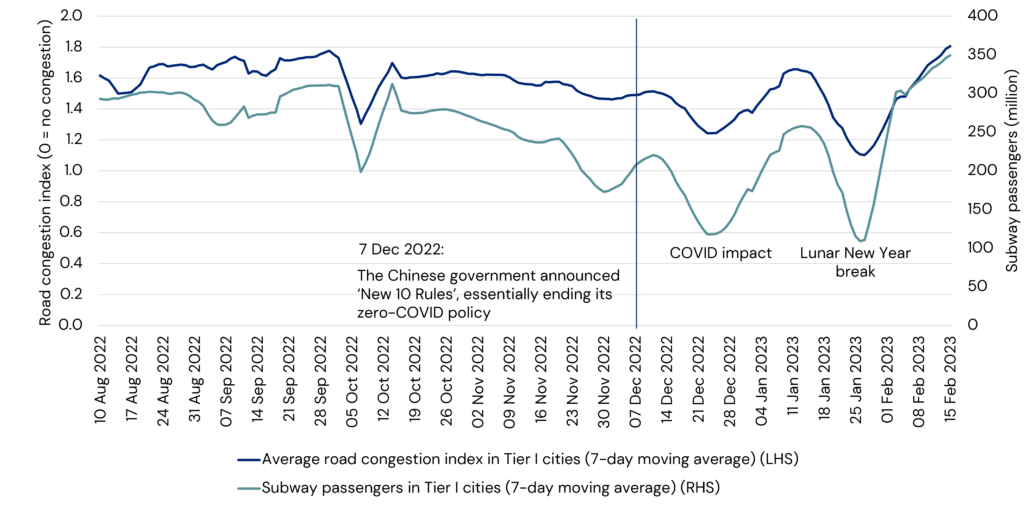

1 Source: Amap.com via WIND Economic Database (road congestion index), WIND Economic Database (subway passenger volume), as of 15 Feb 2023)
China’s reopening provides a clear boost to the Chinese economy, and high-frequency indicators suggest it may have already started to recover. The official manufacturing PMI and non-manufacturing PMI both returned in January 2023 to above 50, the dividing line between expansion and contraction, after hitting the lowest levels since March 2020 in December 2022.2
Meanwhile, among the 70 cities tracked, 36 experienced increases in for-sale residential prices on a quarterly basis in January 2023, compared with only 15 cities in December 2022.3
Unlike China’s V-shaped recovery from the initial COVID-19 outbreak in 2021, the rebound this time is likely to be gradual and mild. There are two factors supporting that expectation. First, despite the reopening and a shift in government policy towards promoting growth, it could take some time to repair the balance sheets of Chinese businesses and households, which are fragile after nearly three years under the zero-COVID regime. Second, the country’s for-sale residential sector, historically a main driver for the economy, remains weak despite signs of bottoming.
2 National Bureau of Statistics of China (NBS)
3 National Bureau of Statistics of China (NBS)
Looking to the broader Asia-Pacific region, China’s reopening is an encouraging development for the hospitality industry. Since March 2022, hotel revenue per available room (RevPAR) had been gradually improving in countries which were advanced in their post-COVID reopening, particularly Australia and Singapore.4
However, Chinese visitors historically have been a significant source of hotel demand and visitor spending in major Asia-Pacific markets, and they were almost completely absent in 2022. As such, hotel performance in most tourism destinations of the region is still trailing the pre-pandemic level. As China unleashes pent-up demand for travel, a recovery in Asia-Pacific hotel and tourism-oriented retail sectors is likely.
4 The Singapore Tourism Board, The Hong Kong Tourism Board, as of Dec 2022
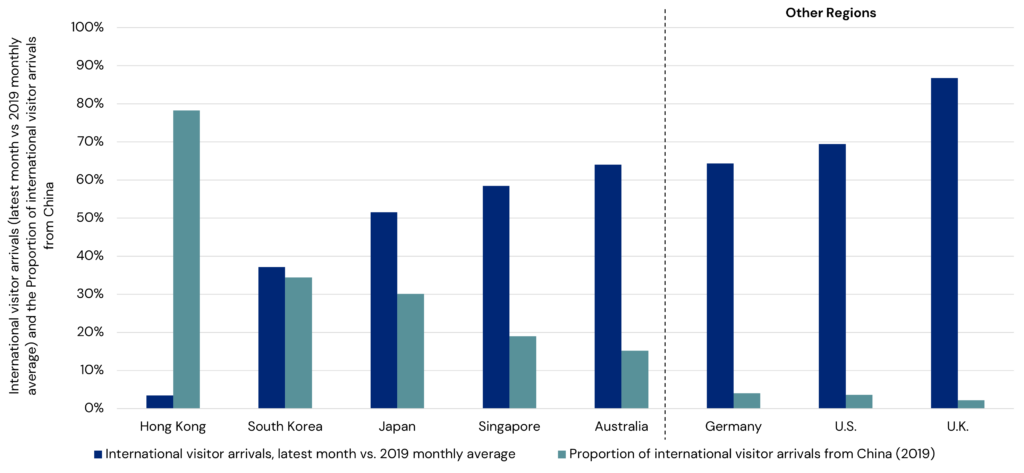

5 The latest data on international visitor arrivals to (1) the U.K. are as of September 2022, (2) Australia, Germany, and the U.S. are as of November 2022, and (3) Hong Kong, Japan, Singapore, and South Korea are as of December 2022. The data on the proportion of international visitor arrivals from China for all countries are as of 2019 except Germany which is as of 2018. Source: Statista and CEIC (Germany), as of 2018; the U.K. Office for National Statistics (the U.K.), as of September 2022; the Australian Bureau of Statistics, the U.S. Department of Commerce, as of November 2022; the Hong Kong Tourism Board, the Japan National Tourism Organization; the Singapore Tourism Board; the Korea Tourism Organization, as of December 2022.
The impact of China’s reopening on the global economy will depend on the interplay of two opposing factors. On the one hand, higher demand from stronger growth in the world’s second-largest economy could potentially increase global inflation, or at least keep it high for some time.
On the other hand, the smoother operation of global supply chains from a fully reopened China is potentially a counterbalancing disinflationary trend. Indeed, an end to the start-stop impact of lockdowns on production and transportation should reduce the risk of further supply chain shortages.
Our expectation of only a gradual recovery in the domestic economy means that the hit to global inflation may not be significant. Weaknesses in the Chinese housing market is likely to prevent too much upward pressure on global construction costs from materializing, even though China is the world’s largest steel exporter. But any boost to inflation, just as it is starting to come down in much of the world, would be unwelcome and could mean that global central banks might not be able to stop raising interest rates as soon as otherwise.
6 Among the major commercial real estate sectors, currently only industrial and multifamily rental assets are qualified underlying assets for ownership by domestic public REITs.
LaSalle and Accumulata Real Estate Group are developing Munich’s first hybrid timber office building, Trí.
0%
operational carbon savings
0%
less regulated energy use
0%
lower embodied carbon than other sustainable buildings in Germany
0
DGNB Platinum pre-certification by the German Sustainable Building Council
Trí is designed to demonstrate the power of timber to deliver both environmental benefits and commercial value, with a much lower embodied carbon profile than conventional buildings and strong interest from occupiers. CBRE is acting as the lead leasing agent.
“This is an industry-leading and best-in-class project. The first of its kind in Munich, its design in accordance with circular economy principles and resource-conserving operation will serve as a benchmark in sustainable real estate. Located in one of the most sought-after office submarkets in Munich, we expect the property to be extremely well placed to meet the ever-evolving demands of future occupiers around sustainability, quality, amenities and infrastructure, while providing attractive long-term returns for our investors.”
-David Ironside, Fund Manager, LaSalle Investment Management
CHICAGO, SINGAPORE (Feb. 27, 2023) – LaSalle Investment Management (“LaSalle”) is pleased to announce it has earned the WELL Health-Safety Rating for 193 office and multifamily properties in North America and Asia Pacific through the International WELL Building Institute (“IWBI”), 43 properties more than last year. LaSalle increased its tally to 127 properties in the US and 66 properties and in Asia Pacific.
According to IWBI, this represents one of the largest and most diverse WELL Health-Safety rated portfolios globally. IWBI also confirmed that LaSalle received ratings on the most multifamily residential properties out of all entities that earned WELL-Health Safety certifications in 2022.
The WELL Health-Safety Rating is an evidence-based, third-party verified rating focusing on operational policies, maintenance protocols and emergency plans to promote overall occupant health and ensure emergency preparedness. To achieve the WELL Health-Safety Rating, the properties implemented or demonstrated features such as improved air and water quality management, health service resources, emergency preparedness programs, enhanced cleaning and sanitation procedures and stakeholder engagement and communication. The WELL Health-Safety Rating can instill confidence in those who come through the building as well as the broader community.
David DeVos, LaSalle Global Head of Sustainability, said: “Tenants are prioritizing healthy spaces where they feel safe, so it is critical to exemplify our commitment to safety to drive tenant demand and, ultimately, portfolio performance. Earning WELL Health-Safety Ratings across our portfolios in North America and Asia is a testament to our focus on tenant safety and ensuring we’re continuing to be at the forefront of the industry in providing the best spaces possible for tenants, no matter where they are.”
Added Jessica Cooper, Chief Product Officer, IWBI: “LaSalle is a demonstrated leader in real estate assets. Already engaged in WELL, LaSalle is showcasing continued leadership to scale the impact of health and well-being globally, achieving the WELL Health-Safety Rating across Asia and the Americas. IWBI congratulates LaSalle for continued achievement of the rating and investment in people-first places.”
The WELL Health-Safety Rating provides a centralized source and governing body to validate efforts made by owners and operators. It leverages insights drawn from the IWBI Task Force on COVID-19, in addition to guidance on the spread of COVID-19 and other respiratory infections developed by the World Health Organization, U.S. Centers for Disease Control and Prevention, global disease control and prevention centers and emergency management agencies, as well as recognized standard-making associations such as ASTM International and ASHRAE, and leading academic and research institutions, as well as core principles already established by IWBI’s WELL Building Standard, the premier framework for advancing health in buildings and spaces of all kinds.
LaSalle’s properties were awarded the WELL Health-Safety Rating following the successful completion of third-party documentation review by GBCI to confirm it has met the feature specific intents and requirements.
About LaSalle Investment Management | Investing Today. For Tomorrow
LaSalle Investment Management is one of the world’s leading real estate investment managers. On a global basis, LaSalle manages over $79 billion of assets in private and public real estate property and debt investments as of Q4 2022. LaSalle’s diverse client base includes public and private pension funds, insurance companies, governments, corporations, endowments and private individuals from across the globe. LaSalle sponsors a complete range of investment vehicles including separate accounts, open- and closed-end funds, public securities and entity-level investments. For more information please visit https://www.lasalle.com, and LinkedIn.























































































Alternative lenders are strongly positioned to make up the continent’s funding shortfall. But raising capital is a major issue, say participants in PERE’s roundtable discussion, as Stuart Watson reports
As the participants meet in late March for PERE’s European debt roundtable, finance is making headlines around the world, and not just on the business pages. A little more than two weeks earlier, the news of tech lender Silicon Valley Bank’s collapse triggered a minor banking crisis. Another US lender, Signature Bank, also folded soon after, forcing regulators to step in to calm the sector. Nonetheless, contagion subsequently spread to Europe, where UBS stepped in to take over stricken fellow Swiss bank Credit Suisse, and a sell-off of shares caused jitters about the future of Germany’s Deutsche Bank.
We property strategists are accustomed to working with traditional real estate variables such as net absorption, rental growth and vacancy rates. But in the early days of the COVID-19 pandemic, there was no choice but to go on a crash course in previously unfamiliar epidemiological concepts like positivity rates, R-naught¹ and vaccine effectiveness, as these suddenly became drivers of short-term real estate conditions. Over the past year, real estate researchers have likewise had to quickly scale a learning curve in understanding energy markets. For the first time ever, we produced charts denominated in once esoteric units of measurement like therms, MMBTUs and MWhs.²
Gas, electricity and oil prices have long been linked to real estate outcomes—energy crises sparked 1970s inflation and have shaped real estate demand from Alberta to Texas and Scotland. But when supply is predictable and prices moderate, as in the years before the pandemic, those links can become dormant. They have awoken again in the past year. The recent dramatic but uneven volatility in energy prices has deeply influenced the economic and property market outlook—especially in Europe—and we expect it to continue to do so going forward.
One year on from Russia’s invasion of Ukraine in February 2022, European energy markets have proven adaptable, facing down a unique degree of energy disruption owing to the region’s dependence on pipeline links from Russia. After initially skyrocketing—European natural gas price at their peak were twelve-times higher relative to the ten-year, pre-conflict average—by mid-February 2023 prices it had fallen to a level only around two and a half times that long-term average.³ Government schemes to partially socialize the cost of higher energy, at the expected expense of massive government deficits and higher borrowing costs, now look a lot less extreme.
¹ R0 is the basic reproduction number, which describes the expected number of cases of an infectious disease directly generated by a single case, in a population where all individuals are susceptible to infection.
² 1 therm = 100,000 British thermal units (BTUs), a measure used in UK natural gas pricing. 1 MMBTU = 1,000,000 BTUs, which is used in US gas pricing. 1 MWh = 1,000,000 watts of electricity over one hour, used in European pricing of natural gas.
³ Refinitiv, Natural Gas TTF (Title Transfer Facility) historical front month futures as of 13 February 2023
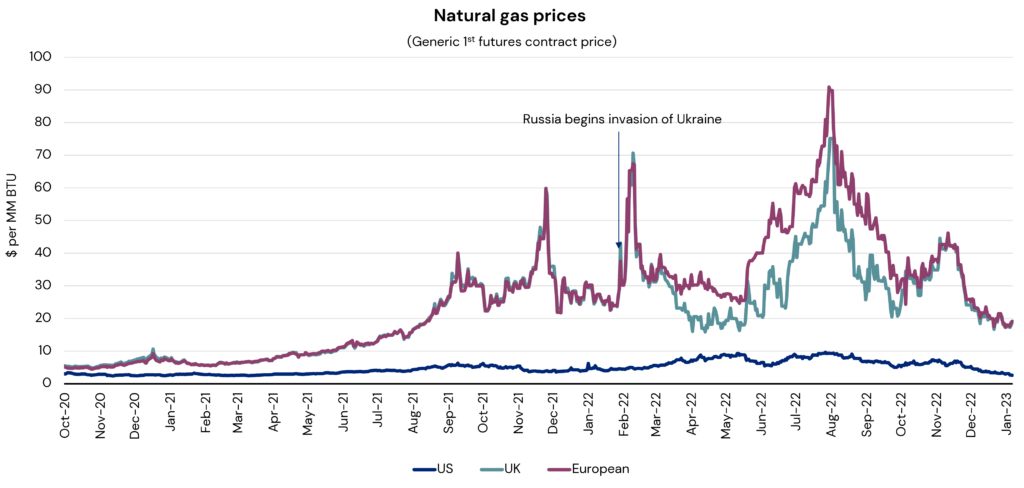

Source: New York Mercantile Exchange and Intercontinental Exchange data via Bloomberg. As of 1 February 2023⁴
Relatively warm weather, cutbacks in consumption and alternative sources of energy, such as renewables and the global liquified natural gas (LNG) market, have contributed to unusually full gas storage reserves. German wind, solar, biomass, hydro, and other renewables generated 47% of the country’s electricity in 2022, a five-percentage point rise in mix.⁵ This allowed European energy prices to fall and has caused headline inflation to ease substantially, even if European core inflation remains stubbornly high. This has brightened the region’s economic prospects as well; our call in the ISA Outlook 2023 (published in December 2022) that a European recession was “almost certainly underway” now appears premature.
Is Europe out of the woods? Far from it. The winter is not yet over, and a cold snap could quickly deplete gas storage reserves. Going into next winter, the Russian supply that was used to partly fill those tanks last autumn will likely be completely unavailable. Meanwhile, Chinese demand for LNG, which was down by 20% in 2022 owing to the country’s zero-COVID policy⁶, is likely to rebound as its economy reopens, leading to more competition for tanker deliveries. Europe’s energy reorientation will probably be at least a decade-long process, which will not be reduced in scope, scale or difficulty by one fortuitously warm winter—though new LNG import capacity and suppliers have accelerated the shift in the past year. We expect that energy prices will continue to have deep impacts on Europe’s economy and real estate markets.
⁴ TTF future prices have been used as a benchmark for European natural gas prices due to being the most liquid gas trading hub in Europe
⁵ German Environment Agency (UBA), press release from 12 December 2022
⁶ International Energy Agency (IEA), report from November 2022
While Europe’s historic reliance on Russian fossil fuels makes it uniquely exposed to energy risks, we see energy as a relevant, if variable, factor for global real estate. This is in part because energy markets operate at both global and regional scales. The Ukraine crisis caused an acute surge in European gas prices, but also a worldwide spike in the price of oil, which trades in a more globalized marketplace. It is worth noting that Canada and now the US are in aggregate net energy exporters, meaning increases in energy costs can be a net positive for economic growth in metro areas with concentrations of energy companies.
Going beyond the macro, the impact of energy costs on real estate varies greatly by building type. Data centers, cell towers, hotels, and cold storage are especially energy-hungry property types, and ones where operational business models mean landlords may be directly exposed to energy costs. Residential sectors vary widely, depending on the age and energy efficiency of the stock, the nature of building systems and leasing conventions. For example, the bulk of the older German residential inventory is heated by gas-fired boilers providing steam heat, and tenants pay “warm rents”—meaning the landlord is responsible paying for heat. Individually metered, modern multifamily product is more insulated—literally and figuratively—from energy prices.
Investments in commercial real estate sectors with net lease structures under which tenants pay energy bills directly, such as office and logistics, may appear shielded from energy volatility. But tenants in places where energy prices have surged have become painfully aware that these costs, historically a small portion of their total expense of occupancy, can suddenly become a significant burden. In our European portfolio, we have for the first time received requests from tenants to help lower their energy bills. Indeed, working with occupiers to improve efficiency and to generate on-site energy to reduce these bills has become an important way to retain them and maximize the affordability of the net rents they pay.
The limitations of electrical grids are also influencing property markets. The availability (or unavailability) of power is already shaping location decisions globally for energy-consumptive uses like data centers, and can be a constraining factor on building electrification, a key step in decarbonization. Weather events can intersect with the nuances of energy supply to cause blackouts, such as occurred in Texas in February 2021 and recently in parts of China, potentially putting a premium on buildings with backup sources of power.
These are just a few of the ways that energy risks have become closely intertwined with real estate investment outcomes. We expect to be following these issues more closely in the years ahead.
TORONTO (Feb. 14, 2023) – LaSalle Investment Management (“LaSalle”) is celebrating five years since the launch of its flagship core real estate fund in Canada, the LaSalle Canada Property Fund (“LCPF” or “the fund”). Since its launch in 2017, the fund’s investment objective has been to outperform the MSCI Canada Property Fund Index (“the index”) by 100 basis points on a gross, five-year rolling basis. It has achieved that goal over the past five years. Additionally, the fund has maintained top quartile performance against the index over 1-, 3- and 5-year periods on a gross basis as of December 31, 2022. LCPF has also grown its gross asset value by 4.5 times since inception to more than C$2.3 billion across 33 investments with interests in 53 properties.
John McKinlay, CEO of LaSalle Canada, said: “We’re proud to have reached the five-year threshold for LaSalle Canada Property Fund. While LaSalle has a rich history of operating in Canada since 2000, this is a critical milestone for LCPF, and a testament to the staying power of the fund and its goal of providing investors income through access to Canada’s highest quality core real estate in the country’s top markets. Canada is an outstanding destination for capital looking to take advantage of solid real estate fundamentals, including strong immigration, job growth, and tenant demand for core product across key sectors. Thank you to our investors for their continued commitment.”
Sam Barbieri, LaSalle Managing Director of Development and Fund Management, added: “Through patience and a dedicated strategy of acquiring and developing high quality assets across Canada’s six major metros, we’ve been able to construct a fundamentally strong portfolio for LCPF that continues to prove its resilience. On the sustainability front, we’re proud to have achieved two four-star and two five-star GRESB ratings, having improved the fund’s score each year. LCPF also ranks well in the index in terms of physical climate risk, having one of the lowest value at risk, in accordance with annual physical climate risk assessments conducted by the fund.”
LCPF’s portfolio totals nearly 9.5 million square feet across Vancouver, Calgary, Edmonton, Toronto, Ottawa and Montreal – the key markets in Canada’s investible real estate universe. The portfolio includes industrial, multifamily, office, retail and mixed-use properties, along with select development projects in these sectors. Among its marquee properties are:




Sustainability initiatives continue to be a key driver in the active asset management of the portfolio. More than 85% of the properties in the portfolio have received a sustainability certification, including 7 that hold LEED certifications, 6 BOMA Best certifications and 9 WELL Health-Safety certifications. LCPF has also submitted to the Global Real Estate Sustainability Benchmark (GRESB) for all five years, earning back-to-back 5-star ratings in 2020 and 2021.
Amy Barsich, LaSalle Managing Director and LCPF CFO, said: “While the market has evolved since LCPF launched five years ago, LCPF’s thesis and principles continue to hold up and produce income for our investors. We look forward to continuing to serve our investors for years to come.”
About LaSalle in Canada
On an aggregate basis, LaSalle has executed more than C$8 billion in Canadian real estate since 2000, providing it with an in-depth understanding of the market. The formation of LCPF expanded LaSalle’s existing Canadian real estate product suite and investment vehicles, which include a series of closed-end commingled funds as well as separate accounts.
About LaSalle Canada Property Fund (LCPF)
LCPF is an open-ended fund targeting core properties in major markets across Canada. The fund is targeting commitments from Canadian and global institutional investors seeking access to the Canadian real estate market through a diversified, income-oriented vehicle. Launched in 2017, the fund aims to provide investors with immediate exposure to a diverse and mature portfolio comprised of office, industrial, mixed-use, retail and multifamily assets. Through its near-term pipeline of potential future investments, the fund will seek to take advantage of mispriced assets as it continues to grow.
About LaSalle Investment Management | Investing Today. For Tomorrow
LaSalle Investment Management is one of the world’s leading real estate investment managers. On a global basis, LaSalle manages approximately $79 billion of assets in private and public real estate property and debt investments as of Q4 2022. LaSalle’s diverse client base includes public and private pension funds, insurance companies, governments, corporations, endowments and private individuals from across the globe. LaSalle sponsors a complete range of investment vehicles including separate accounts, open- and closed-end funds, public securities and entity-level investments. For more information, please visit us on LinkedIn.
Forward looking statement
The information discussed above is based on the market analysis and expectations of LaSalle and should not be relied upon by the reader as research or investment advice regarding LaSalle funds or any issuer or security in particular. The information presented herein is for illustrative and educational purposes and is not a recommendation, offer or solicitation to buy or sell any securities or to adopt any investment strategy in any jurisdiction where prohibited by law or where contrary to local law or regulation. Any such offer to invest, if made, will only be made to certain qualified investors by means of a private placement memorandum or applicable offering document and in accordance with applicable laws and regulations. Past performance is not indicative of future results, nor should any statements herein be construed as a prediction or guarantee of future results.























































































Converging needs are leading to more dialogue and transparency than ever before
Investors are wary about the economy. Companies are trying to attract people back to the office. Both camps are working toward their sustainability goals.
This all makes high-quality real estate – buildings that meet green specifications, or spaces that companies want to lease and where employees want to work – what everyone wants right now.
The convergence on quality is bringing about a major shift in the industry. The relationship between investors and occupiers has long been largely transactional, and at times even adversarial. But it’s increasingly becoming one of cooperation and partnership.
Beverley Kilbride, European COO of LaSalle Investment Management, and Andy Poppink, CEO of JLL EMEA Markets discuss the drivers behind this changing dynamic – and the state of real estate in general – on JLL’s website.
JLL has scored a perfect 100 on the Disability Equality Index (DEI). As a wholly owned subsidiary of JLL and is proud to share in this achievement.
The index is a benchmarking tool that helps companies build a roadmap of measurable, tangible actions that they can take to achieve disability inclusion and equality. Each company receives a score, on a scale of zero (0) to 100, with those earning 80 and above recognized as “Best Places to Work for Disability Inclusion.”
Read more about this award on the Disability:IN website























































































At LaSalle, our mission is to deliver investment performance for a better tomorrow for all our stakeholders, and sustainability and strong climate action are an integral part of delivering both performance and a better tomorrow.
We are addressing the physical and transitional risks associated with the impacts of climate change and the move to a decarbonized world, with action across all areas of our business. We firmly believe that this climate-focused approach can drive investment performance.
Our 2022 sustainability review covers our environmental sustainability strategy and approach as well as how our actions can add value for investors and other stakeholders. It highlights our 2022 results and details how we are tackling resource conservation, reducing carbon emissions and evaluating climate risk across all areas of our business. We conclude with a selection of case studies from around the world highlighting our efforts in carbon conservation, resource capture, supporting biodiversity and supporting a more circular economy.
Far from simply mitigating climate risk, our commitment to sustainability runs through every facet of our business, to ensure that we add value at every stage of an asset’s lifecycle and across the investment process.
LONDON (9 January 2023) – LaSalle Investment Management (“LaSalle”) today announces that Beverley Kilbride has been appointed to the role of Chief Operating Officer (COO), Europe.
Following this appointment, Beverley will lead operations across LaSalle’s unified European team, with her remit comprising sustainability, asset management, operations, digital projects and capital markets. She will focus on integrating and implementing strategic operational efficiencies across all European investments, assets and funds, reflecting LaSalle’s integrated approach globally.
Beverley will also become the Chair of LaSalle’s European Diversity, Equity & Inclusion (‘DE&I’) Operating Committee, succeeding Brian Klinksiek, LaSalle’s Global Head of Research & Strategy.
Having joined LaSalle in 2006 from JLL, Beverley has worked across asset management, acquisitions and fund management. Based in the firm’s Paris office, Beverley successfully spearheaded LaSalle’s return to the Dutch market in 2013 and gained hands-on asset management and investment experience overseeing a selection of strategic value-add assets across Europe.
After assuming the role of Head of Transactions & Asset Management for Europe in July 2021, Beverley oversaw and managed the acquisitions and asset management teams. In this time, Beverley established LaSalle’s European Asset Management Board and specialist European Development & Repurposing team, with the in-house capability of delivering larger, more complex and higher-return developments.
In her new role, Beverly remains head of LaSalle’s French regulated business.
Philip La Pierre, Head of Europe for LaSalle, said: “Beverley’s new appointment reflects LaSalle’s continued focus on ensuring the alignment and efficiency of the firm’s operations across Europe and globally. Her newly created role will help further drive LaSalle’s investment performance as we continue to embed sustainability considerations across our portfolio. Having been with LaSalle for over 15 years, Beverley has built a highly successful track record and is instrumental to delivering on our ambitions in Europe on behalf of our clients.”
Beverley Kilbride, Chief Operating Officer, Europe, for LaSalle, commented: “This role offers an exciting opportunity to work closely with our operational, sustainability and investment teams to help drive further transformation across LaSalle’s integrated European and global business. I am delighted to take on this new role at a pivotal time and help ensure that LaSalle maintains its position as one of the world’s leading real estate investment managers.”
About LaSalle Investment Management | Investing Today. For Tomorrow.
LaSalle Investment Management is one of the world’s leading real estate investment managers. On a global basis, LaSalle manages approximately $79 billion of assets in private and public real estate property and debt investments as of Q4 2022. LaSalle’s diverse client base includes public and private pension funds, insurance companies, governments, corporations, endowments and private individuals from across the globe. LaSalle sponsors a complete range of investment vehicles, including separate accounts, open- and closed-end funds, public securities and entity-level investments.
For more information, please visit www.lasalle.com, and LinkedIn.
Investing today. For tomorrow.
NOTE: This information discussed above is based on the market analysis and expectations of LaSalle and should not be relied upon by the reader as research or investment advice regarding LaSalle funds or any issuer or security in particular. The information presented herein is for illustrative and educational purposes and is not a recommendation, offer or solicitation to buy or sell any securities or to adopt any investment strategy in any jurisdiction where prohibited by law or where contrary to local law or regulation. Any such offer to invest, if made, will only be made to certain qualified investors by means of a private placement memorandum or applicable offering document and in accordance with applicable laws and regulations. Past performance is not indicative of future results, nor should any statements herein be construed as a prediction or guarantee of future results.
CHICAGO, Feb 1, 2021 – JLL (NYSE: JLL) has been again named to Fortune magazine’s World’s Most Admired Companies list. The list is a major authority on corporate reputations compiled each year by Fortune and Korn Ferry through a survey of 3,820 executives, directors and securities analysts. This year, JLL was recognized for social responsibility, global competitiveness and quality of management.
“JLL’s purpose is to shape the future of real estate for a better world, working in close partnership with our clients and all our stakeholders,” said Christian Ulbrich, JLL CEO. “We are therefore very proud to again be included on Fortune’s list of the World’s Most Admired Companies.”
LaSalle is a wholly owned subsidiary of JLL and is proud to share in this achievement.
Read more about this award on JLL.com






















































































